New Orleans Gets a "Clue" at the Saenger Theatre
While it was a lovely evening outside on Canal Street, it was a dark and stormy night inside the Sanger Theatre for the opening night performance of Clue, a new farce touring the country—not to be confused with an Off-Broadway Clue the Musical also on tour. This Clue is a traditional one-act stage production played strictly for laughs.
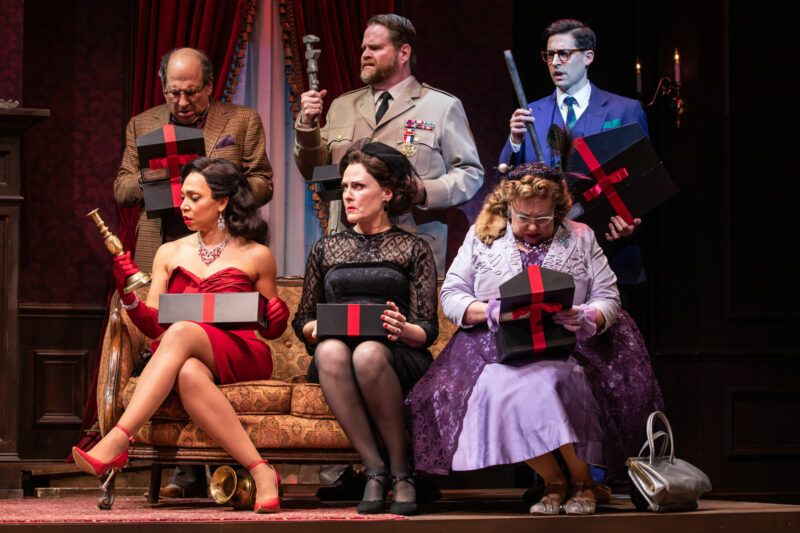
Broadway shows built audiences with stories created by prolific playwrights, engaging books by respected authors, humorists, and later screen writers from film, but the Great White Way must be running out of ideas as plot points are expanding its scope to include family board games for source material. To be fair, while based on the game, the play draws largely from the film 1985 film, but keeps fans on their toes—slaying audiences with nostalgic turns and inside jokes, such as suggesting "The Parker Brothers" (toy company which launched the game now owned by Hasbro) as probable culprits, and following a map of the mansion that looks a lot like a familiar game board. Clue trips the light fantastic, even as the lights suddenly go out and bodies start piling up, with comic effect.
Let the Game Begin
The game clearly based on Agatha Christie's British murder mysteries—most notably her 1942 book The Body in the Library in
which a Colonel and his maid discover a corpse in the library of Gossington Hall—which inspired mystery buff Anthony Pratt to create the popular board game. Cluedo debuted in post WWII England in 1949, and as Clue in the United States. In both
versions, players ask for collect clues to solve a murder of Mr. Boddy. The winner correctly determines which other player is the murderer, which weapon was used, and which room the murder took place. Like Christie's tale, the game is set in a Victorian-era
mansion. The family board game instantly became a multi-generational way to kill the time.
The play is set in 1950's Cold War America. Fans yearning for the celebrity cast of the film will be not be disappointed at the ensamble gathered at Boddy Manor during this production. The six well-known suspects Col. Mustard (John Treacy Egan), Mrs. White (Tari Kelly), Mrs. Peacock (Joanna Glushak), Mr. Green (John Shartzer), Professor Plum (Jonathan Spivey), Miss Scarlet (Michelle Elaine) are welcomed into Boddy Manor by Wadsworth the butler (Mark Price), Yvette the maid (Elisabeth Yancy) at the invitation from the mysterious Mr. Boddy (Alex Syiek).
The Game is Afoot
Victims of extortion during Joe McCarthy's Red Scare hearings, each are given items that can be used to kill their extortionist to prevent a scandal. Turn off the lights, and go...!
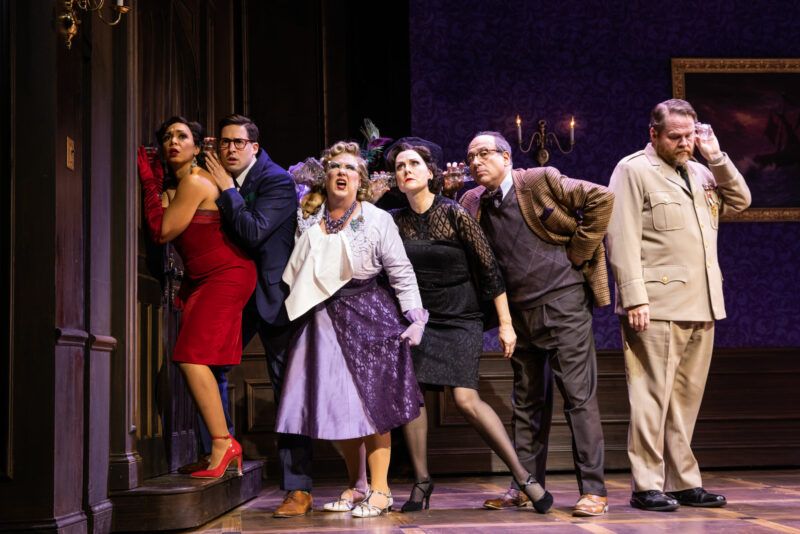
The 15 actor—six of which are the literal pawns in this game of murder—play brilliantly off each other, making Casey Hushion's body-bending slapstick direction and Sandy Rustin's rapid-fire dialogue work. Rustin also ups the ante with the madcap murders by multiplting the film's multiple solutions exponentially and offering even more alternate murderes, before finally revealing the final answer.
The game's most famous character Colonel Mustard (John Treacy Egan) is personified with deadpan comedic timing and spot-on timing, easily eclipsing the actor from the movie...what was his name, again? Enterring as the first guest, his arrogant, entitled manner is clear before he even speaks a word. And Egan's delivery just gets better as the show progresses.
Michelle Elaine makes Miss Scarlet her own, and brings a subtle depth to the madam's confident sassiness that elevates this murder suspect above the farcical fray.
John Shartzer's Mr. Green is a hot hap-hazard mess. Whether dodging bullets, chandeliers, or just stading up, he makes his time on stage worth every second.
"Clue" performances at the Saenger Theatre in New Orleans run through Sunday, June 23. Tickets can be purchased at The Saegner Theatre in New Orleans.
Broadway star Rob McClure reprises his Tony-nominated role in New Orleans
While the cross-dressing-to-win-love plot line goes back centuries, at least as far as Shakespeare and likely further, it somehow never gets old.

The opening night crowd at the Saegner Theatre cheered wildly when Mrs. Euphegenia Doubtfire first appears on stage in Act 1 (as the visual cadence to the song "Make Me a Woman"). In this film-to-stage cross-dressing farce Mrs. Doubtfire in New Orleans, it immediately become obvious that actor Rob McClure as Daniel Hillard and his alter ego Mrs. Doubtfire was going to skillfully honor Robin Williams, who created the role, and yet be able to make it his own.
The Plot Thickens

The play follows the film in spirit with Daniel and Miranda Hillard [Maggie Lakis, McClure's real-life wife] divorcing as she finally snaps at being the parent to their three children and her Peter Pan syndrome husband. Not realizing what he has until he loses it, Daniel thrives on being the cool dad while neglecting his wife. When the court awards Miranda full custody, he hijacks the position of a nanny, disguising himself as a female spinster with the help of his brother Frank [Aaron Kaburick] and brother-in-law Andre Mayem [Nik Alexander], who are a master make up power couple.
Affecting a thick Scottish brogue and some matronly clothing, he becomes Mrs. Doubtfire in the hopes of fooling his family to stay in their lives in whatever fashion and win them back.
As expected, hilarity ensues. As Mrs. Doubtfire, Daniel doles out patient wisdom, disciplines the kids, and connects with his ex-wife on emotional levels he was previously incapable of. When Miranda starts dating hunky Brit Stuart Dunmire [Leo Roberts], Daniel finds Mrs. Doubtfire to be a perfect anti-wing woman to hilarious effect ("Big Fat No").
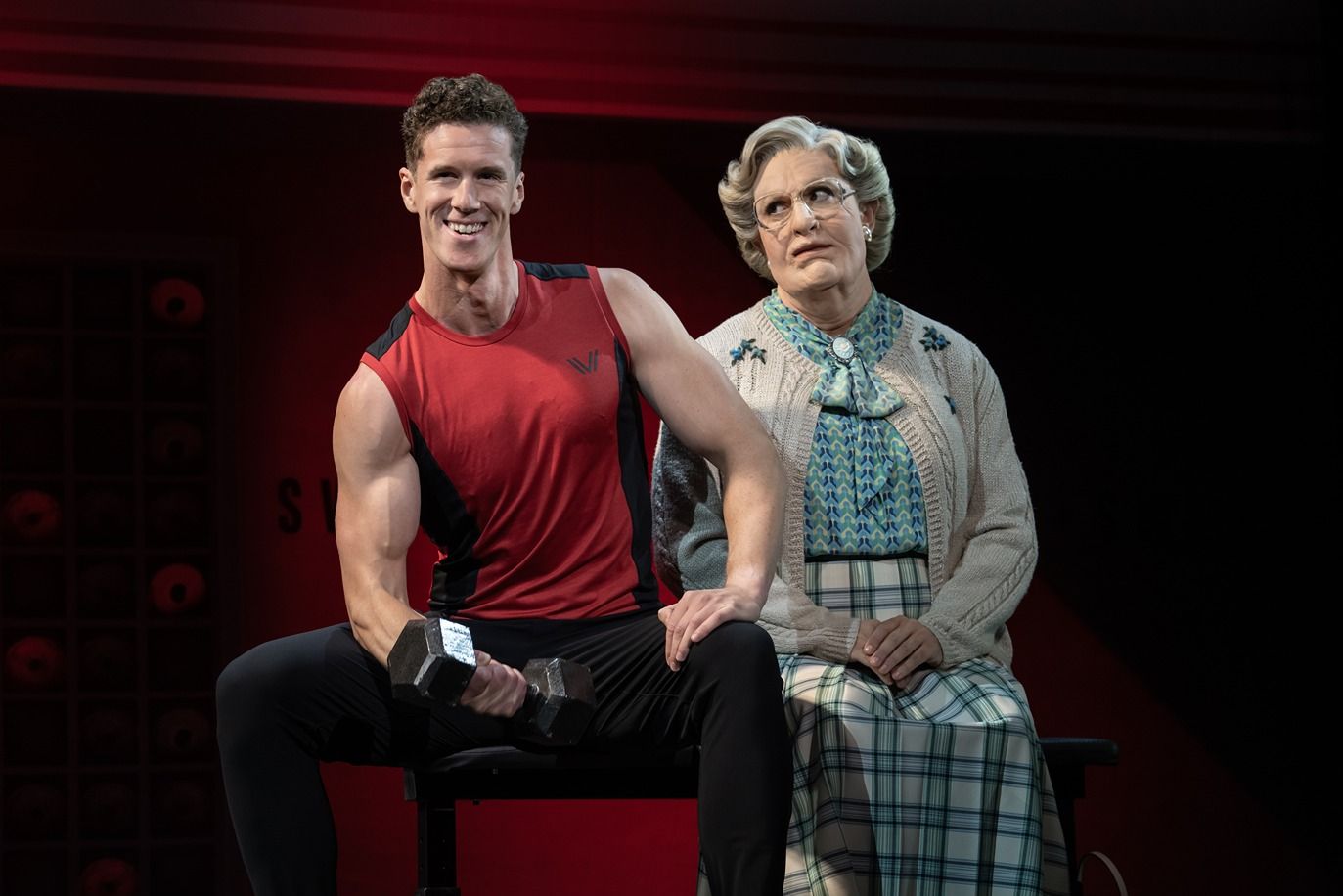
Audience members of all generations were laughing uncontrollably through the production, especially a stunning fast-paced slapstick hand-puppet rap-bounce "Telling Time Rap" routine that isn't even telegraphed on the soundtrack, cooking dinner using the internet ("Easy Peasy"), and "He Lied to Me," which sets up the climactic reveal before Lannie Rubio's flamenco singer belts out her first word.
In a similar vein, Tootsie (at the Saenger November 2021) successfully followed a similar film-to-stage roadmap on its journey to Broadway, and Mrs. Doubtfire makes many of the same smart decisions. The musical keeps the source material close to its heart, but alters characters and plot lines just enough to make it a legitimately strong stage play on its own. While the film is largely considered a Robin Williams vehicle, the play pays homage to him but doesn't relay on his madcap improv, instead allowing the Scottish nanny to share the stage with a very talented cast, almost seeming like an ensemble piece—but make no mistake, this is McClure's show.
Real-Life Couple Playing Stage Divorcées
It is unusual—to the point of almost unheard of—to have a Tony-nominated Broadway star reprise their role in a touring company. His walking in Mrs. Doubtfire's Broadway heels across the Sanger stage is a rare treat for local theater goers able to experience performances often reserved for Manhattan. And having his spouse along for the ride must have been a selling point in doing the tour. His presence brings this production and the overall energy of the show to higher levels, and the crowd responded as much.
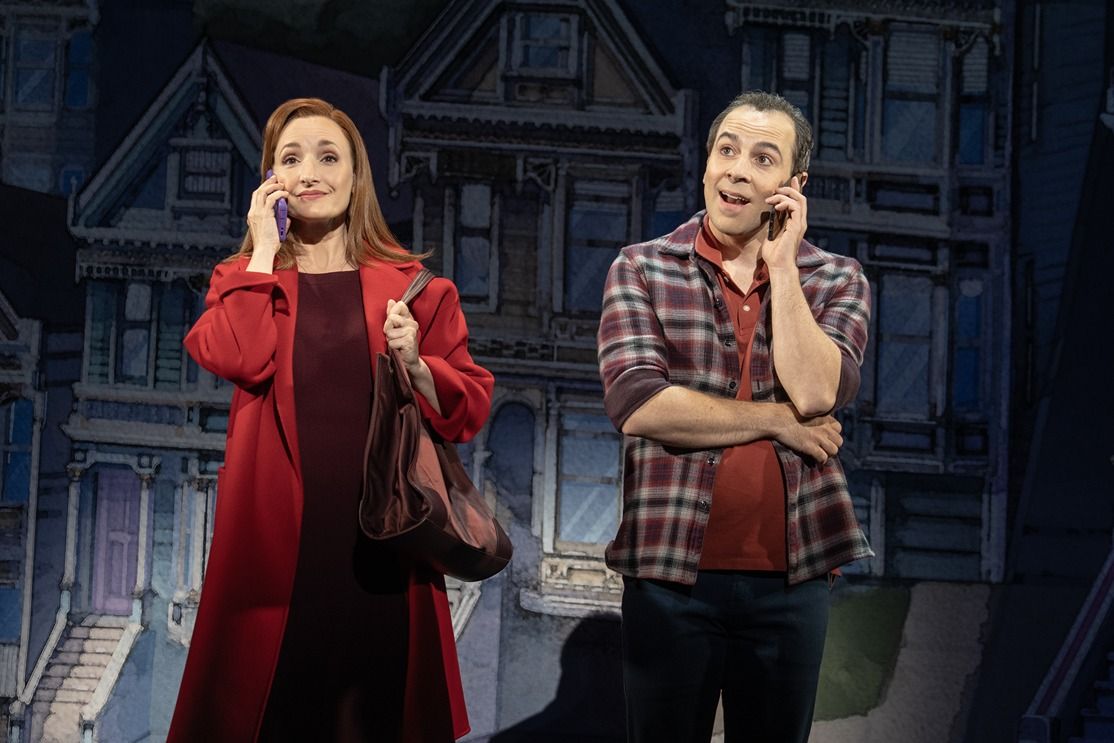
It would be interesting to learn how much of Maggie Lakis' interactions with her stage husband "Daniel" are acting and how much is actually just them being a married couple. But the chemistry and love is clear and while the scripted arguments are believable, so too is the emotional gravitas and pathos of a couple grappling with love gone wrong ("Let Go").
Shuttered during previews in New York due to the pandemic, Mrs. Doubfire finally had its opening night in December 2021. Hampered in the aftermath, the show captured a 2022 Drama Desk Award to David Brian Brown for Outstanding Wig And Hair Design—with good reason—and Drama Desk and Tony Award nominations for lead actor Rob McClure.
Of course, the elephant in the theater is the late Robin Williams' legacy over the show. His famously improvised dialogue and performance, much of which remains intact in the role, is skillfully acknowledged and dispensed with by book writers Karey Fitzpatrick and John O'Farrell introducing Daniel at the show's opening as a overachieving voice-over talent who cannot hold a job. This is largely due to his proclivity of going off-script into a montage of impersonations—mustering all of the Simpsons, a few Muppets, Golem, and a slew of celebrities within seconds. McClure does himself—and Williams—proud.
Doubtfire in Charge
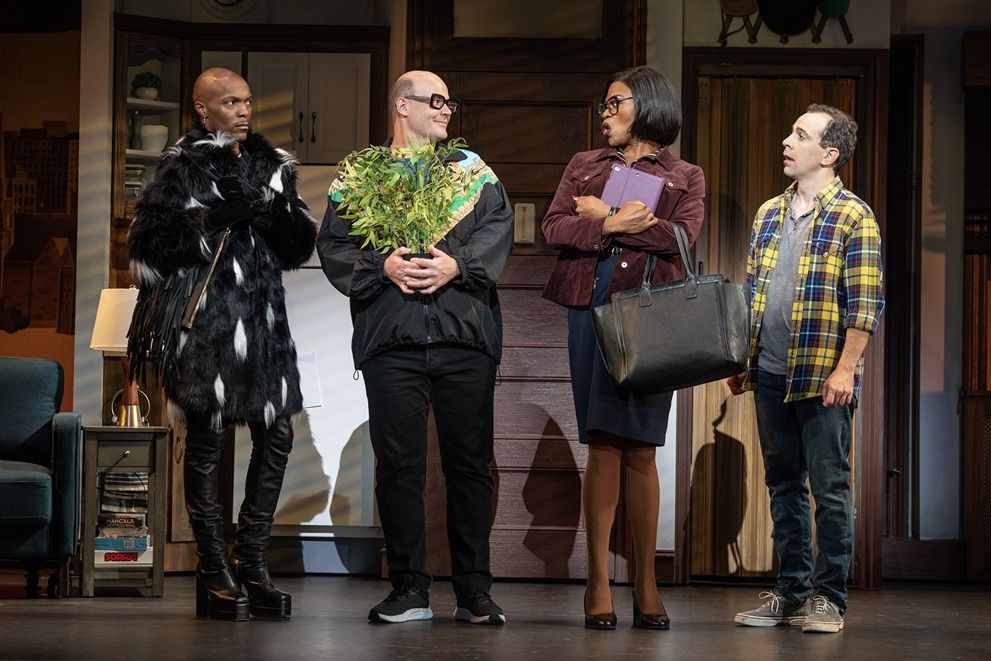
Other standouts are Aaron Kaburick and Daniel's wig hairdresser brother Frank Hillard and Nik Alexander as his Frank's husband Andre Mayem (or perhaps Mayhem?). While Alexander's Andre is one of the most over-the-top flamboyantly hilarious on-stage spouses since Carmen Ghia in Mel Brooks' The Producers, husband Frank pathologically yells whenever he lies. Somehow with Kaburick, his delivery never seems to wear thin and this gag landed every time, consistently eliciting hysterical laughter.
Romelda Teron Benjamin steals the show, even from McClure, whenever she is on stage. Her performance is a testament to the saying "there are no small parts, only small actors." Benjamin chews up the scenery and makes every second on stage a delight. Her emotionless response to everything is rewarded with her reaction during the brilliantly choreographed climax.

And of course, the children were exceptional. Child actors are impressive just for having the capacity to go on any stage and recite lines in a stage performance, but the talent needed to trip the light fantastic in Broadway productions such as Annie or Mrs. Doubtfire is another thing entirely. Opening night's Emerson Mae Chan as youngest daughter Natalie Hillard, Sam Bird as middle child Christopher Hillard, along with Giselle Gutierrez as oldest-daughter Lydia Hillard, were very strong in their roles.
While the parts of Natalie alternate between Chan and Charlotte Sydney Harrington, and Christopher's role is shared by Bird and Alex Bernard Rimmele, Lydia is all Gutierrez. The three stage siblings harmonize well together ("What the Hell") and have wonderful comic timing, but Gutierrez's solos in "What the Hell" and "Just Pretend" showcase powerful vocals that suggest a promising career ahead.

Mrs. Doubtfire performances at the Saenger Theatre in New Orleans run through Sunday, May 19. Tickets can be purchased at The Saegner Theatre in New Orleans.
'Tomorrow' is Today to go see Annie at The Saenger
Annie was an innovative and groundbreaking show when it opened on Broadway in April 1977—capturing the Tony Award for Best Musical—and is now considered a legitimate Broadway classic. With well-known songs, including it's signature showstopper "Tomorrow," it is seemingly a Broadway musical that transcends generations, as exemplified on opening night at the Saenger Theatre.
Bordering on cult classic status, the audience was comprised of "children of all ages," with pre-teens accompanied by parents and grandparents. Some children—and adults—channeling Rocky Horror fandom by wearing the famous orphan's attire, donning her iconic curly-red-hair wigs and red dresses.
Annie is based on the hugely popular newspaper comic strip series Little Orphan Annie
created by Harold Gray in 1924, which continued until his death in 1968.
The character's popularity that inspired the Broadway show was such that other cartoonists kept the
newspaper comic strip going into this century. With its adventurous optimism, the comic (and later a radio show and film) Little Orphan Annie was a phenomenon of its time that is largely credited as entertainment that infused positivity through eras in which hopelessness prevailed.
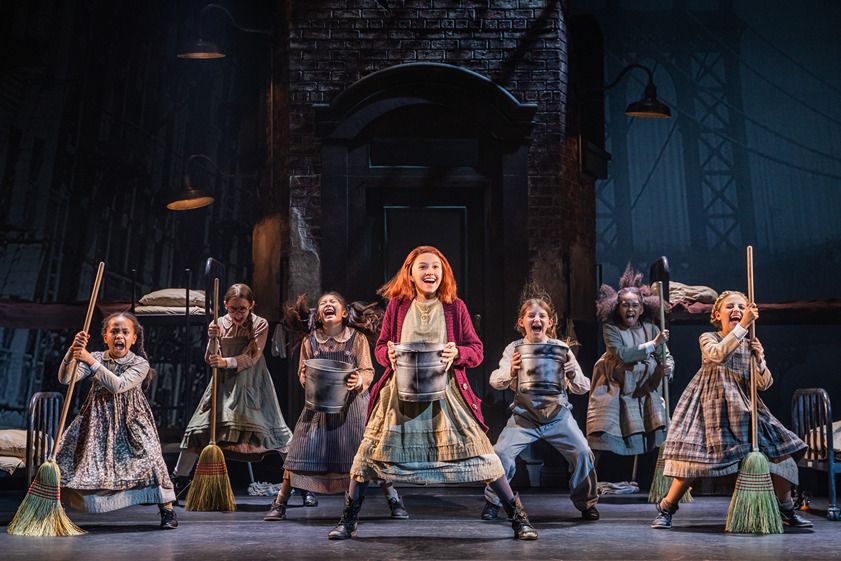
For anyone who has not read the comic, seen the Broadway show (or its two revivals), three movies, or TV adaptation yet, the plot revolves around a "little orphan" named Annie (Rainier "Rainey" Treviño), effectively held captive in a Depression-era orphanage in New York City in December 1933, with Prohibition having just been repealed.
She and a half dozen others (Savannah Austin, Arianna Guller, Saylor Curran, Addie Jaymes, Kylie Noelle Patterson, and Jade Smith) have a "Hard Knock Life" under the tyrannically watchful eye of Miss Hannigan (Stephanie Londino)—a misopedist who hates her ill-suited job while taking full advantage of the Twenty-first Amendment by hilariously self-medicating with flasks of "medicine." Her hatred of "Little Girls" is largely focused on the optimistically independent Annie.
Convinced her parents have not returned for her because of the Great Depression, Annie escapes looking for her parents in "Hoovervilles"—makeshift encampments of people who lost everything in the stock market crash lamenting their lost fortunes ("We'd Like to Thank You") as they share resources to survive. Its uncomfortable relevance resonates with today's audiences. But Annie's optimism in the promise of "Tomorrow" is infectious and inspires hope with the unhoused.
Annie is caught and returned to the orphanage, but before she's subjected to Hannigan's wrath, she is whisked away to spend Christmas with billionaire industrialist Oliver Warbucks (Christopher Swan) as a publicity stunt.
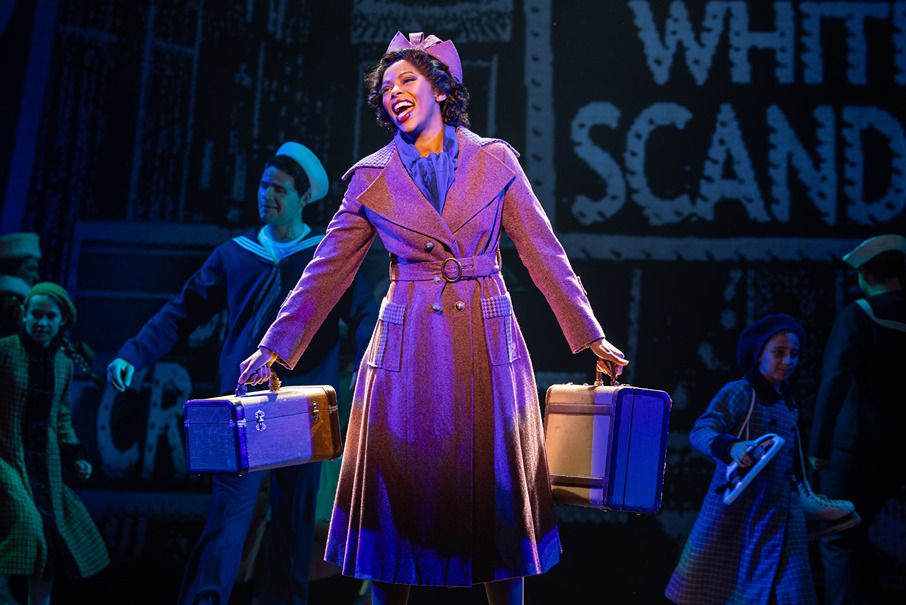
Warbuck's character is a wealthy, cold-hearted Republican frustrated with Democratic President Franklin D. Roosevelt's ( Mark Woodard) handling of the economy and is consumed with getting people back to work. Shocked by Annie's sheltered life, he shows her the magic of "NYC" at Christmastime and his heart warms to Annie as he starts to see the world anew through her eyes, and paternal feels kick in.
His focus turns to her happiness and he hijacks the FBI and FDR for a pulling-out-all-stops effort to find her parents, including a $50,000 reward (which would be worth the same as $1.2 million today, just in case you were wondering). Annie's hopeful impact not only has Warbucks put aside politics to work with FDR, it also inspires the president to create the New Deal in order to revive the economy.
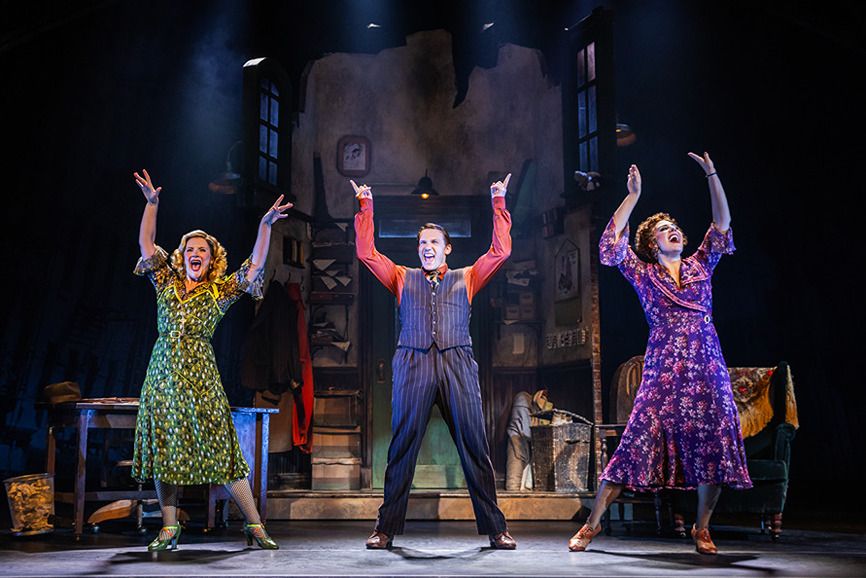
Back at the orphanage, Miss Hannigan—along with her con-artist brother Rooster (Jeffrey T. Kelly) and his girlfriend Lily St. Regis (Samantha Stevens)—plans her revenge to get the reward and be on "Easy Street." With Miss Hannigan's professional knowledge of the girl's past, Rooster and Lily plan to pose as Annie's parents, collect the cash, and kill the kid.
True to the comic's theme, the Christmas morning climax has the con artists getting their comeuppance, Annie learns she is indeed an orphan, allowing her to be adopted by her new "Daddy" Warbucks. She is reunited with her friends from the orphanage and is given a new puppy—"Sandy" of course—as a Christmas present, all with her new red-headed curls and wearing the familiar red dress.
Rainier "Rainey" Treviño continues in the impressive tradition as Annie, originated by Andrea McArdle. With a voice that would overpower many adult performers, her rendition of "Tomorrow" exceeds expectations and brings new passion to the song. The role is not easy. With much stage time, long stretches of dialogue, and showstopping songs, carrying this show would be a grueling gig for most adults actors. But at age 11 and with an already-lengthy resume that includes supporting roles in School of Rock, Sound of Music, Little Mermaid, and The Lion King, she is clearly up to leading this cast and her performance is worth the price of admission.
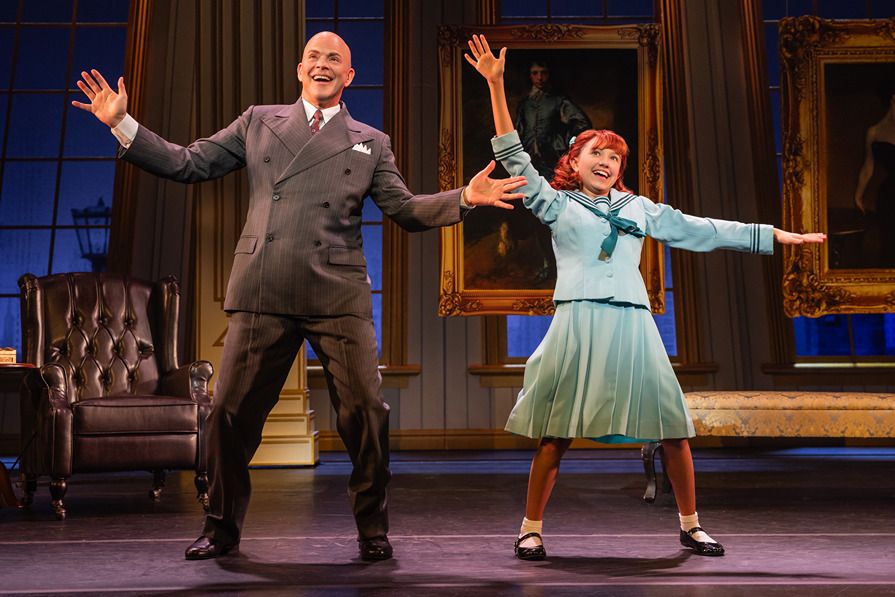
Other standouts include Julia Nicole Hunter as Warbuck's love-lorn assistant Grace Farrell. She bring a level of strength, empathy, elegance to the role that equally breaks hearts while effortlessly enchanting them. Hunter makes it easy to believe she would be up to managing Warbuck's hectic life while making it impossible to believe he has not fallen in love with her yet.
While the ensemble of orphans are choreographed to perfection by Particia Wilcox, Molly (played by Jade Smith) steals the show anytime she takes the stage. As the youngest of the orphans who looks to Annie as a role model, the part is written to out-cute the others, but Smith commands attention even when sharing footlights with Treviño. The stage presence she exudes cannot be learned and is clearly all her.
But Stephanie Londino's Miss Hannigan "shines like the top of the Chrysler Building." She was clearly a fan favorite with a boisterous standing ovation during the curtain call. She is hilariously believable playing a fading-beauty still trying to flirt her way through a life that's gone wrong while drowning her sorrows in alcohol. She brings authentic humor to the part. To her credit, Londino resists imitating Carol Burnett or Kathy Bates in her interpretation. She makes the role her own and brings an unexpected pathos to her plight any parent supervising seven pre-teen girls can relate to, while still making Hannigan's intoxicated ineptitude very funny.
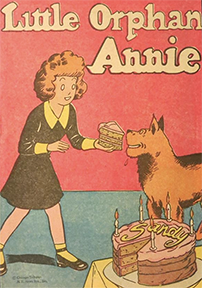
Premiering five years before Cats, Broadway's Annie was one of the first shows to appeal to children, providing an epiphany to the waning theatre industry on how to attract a new generation of theatre goers.
But much of what made the show so popular on Broadway was riding the coat tails of a still-popular comic strip and it's New York City setting. The show seems timeless in many ways with themes of economic struggles, putting aside political differences for the common good, the power of love, and optimism. But some jokes referencing the original comic strip, politics, Depression-era celebrities and history, as well as New York City-centric gags fell flat with the audience (although disparaging New Jersey still got a good laugh). Whether that's a result of the show being generations away from its source material, the show's NYC setting being too removed for a touring audience—or it was just an off night—is unclear, its clear the staying power of the songs and performances still hold their own. The show stands alone, even without knowing its influential history.
Directed by Jenn Thompson, Annie features the now-familiar book and score written by Tony Award®-winners Thomas Meehan, Charles Strouse, and Martin Charnin. This musical is celebration of family, optimism, and the American spirit remains a solid two+ hours antidote for all the hard knocks life throws our way.
Annie runs only through "Tomorrow" (Sunday, April 7) at The Saegner Theatre in New Orleans, so don't wait to see this show!
Audiences Ain't Too Proud to be lured by The Temptations at the Saenger Theatre
Why Ain't Too Proud—The Life & Times of The Temptations? There are many bio-band plays and movies detailing the combative personalities, egomaniacal bandleaders, and love gone wrong around the unifying harmonies created by the notable bands of yesteryear.
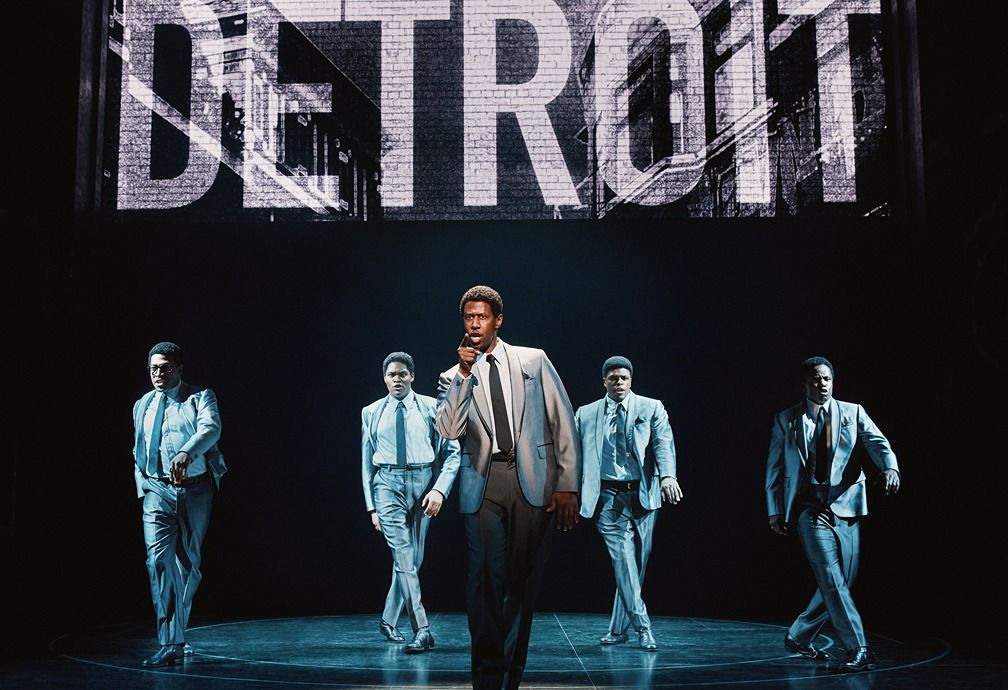
Most are interesting profiles of the group's dynamics, focusing on the illicit or unethical behavior among band members, revealing the music industry's barely-legal actions exploiting the naivete or desperation within the group, and, of course, the seemingly inevitability of conflict between band members' overblown egos creating divisions that ultimately destroys them from within. But these plays share a universal theme that keeps audiences entranced—persevering against seemingly insurmountable odds to achieve greatness with tenacity and talent—and great music. As Ain't Too Proud suggests, the Temptations were no exception to this rags-to-riches story arc. So why?
Act One
The show presents The Temptations' beginning in the racially divided Detroit streets, with teenage founder Otis Williams (Michael Andreaus) scraping together the best vocalists and musicians he knows as a distraction to keep out of jail.
After fits and starts, the band strikes gold with their first hit, "The Way You Do the Thing You Do." Standing out from other groups with with their signature dance moves and harmonious vocals, they are quickly signed by the burgeoning Motown Records under the mentorship of Smokey Robinson. They then create "My Girl," to this day, arguably, their most enduring hit. Their meteoric rise helped redefine the automobile capital of the world from "The Motor City" to the "Music Capital of the World" with R&B and soul, solidifying the record label and evolving the city—and in turn the music— into "Motown."
Williams meets up with childhood pal David Ruffin (Elijah Ahmad Lewis), a vocalist who is also making a name for himself, who eagerly joins The Temps as their new front man. Soon, Motown surprises the group by assigning Shelly Berger (Ryan M. Hunt)—"White and Jewish"—to help the band successfully crossover (aka. integrate) with hits on mainstream (aka. white audience) radio stations. And succeed they do!
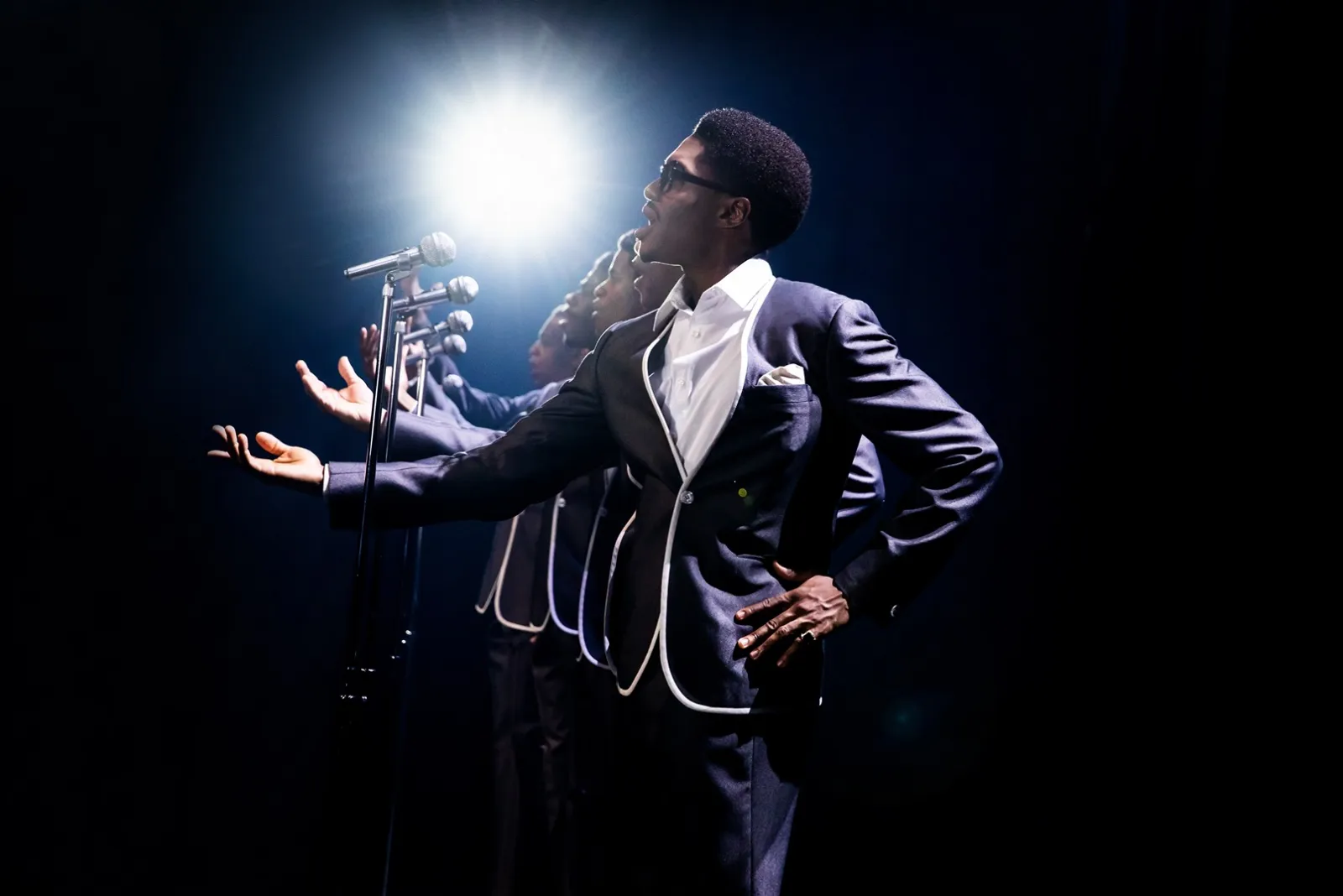
From there, the story of The Temptations involves personal friendships, bonds, and accomplishments—intentional and with determination, as well as conflicts that threatened to tear them apart during civil unrest in the country, resonating universal themes in which current audiences will find relevance, even today.
But Ruffin's ego, temper, and drug use gets him booted, and the cracks widen among the fractured friends. With their top vocalist gone, the remaining Temps are without direction and seemingly on the brink of disbanding.
Act Two
The Tempts do a musical 180-degree turn in the mid-1960s. Changing their lead singers mid-career, they made the risky move of abandoning their successful 1950s-inspired R&B style and opting to be create songs with the evolving "psychedelic soul" genre. This allowed all five members of the group to have a more equal contribution, and their sound became "more whole."
The Temptations found fans in this reboot and charted higher on the Top 40 charts than they had in their former genre, thus improving upon their success. But the price for immortality is mortality as the group members fall away, with most of their deaths either due directly or indirectly with their time in The Temptations. Ironically, founder (and show narrator) Williams is the last original Temptation standing in the show (and in reality), but his own sacrifice is worse than death.
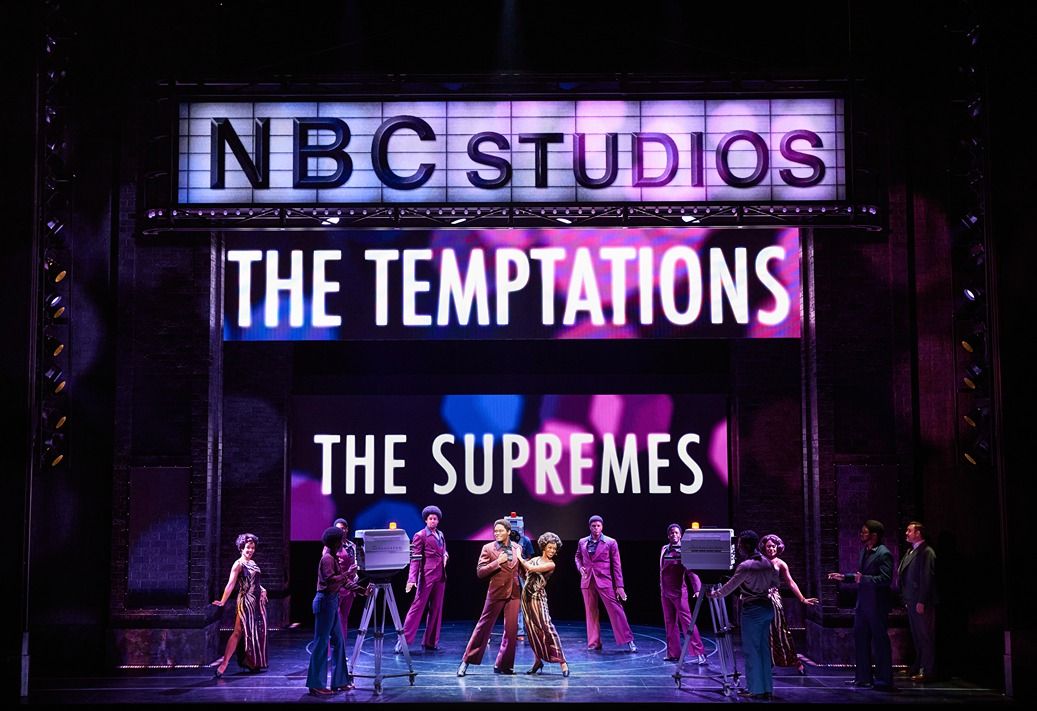
The show concludes with one of their biggest hits,"Papa Was a Rolling Stone." The song hits a little too close to home for some of the Temps but is a bittersweet conclusion to a story of perseverance.
The joyful moments of the show is the group's iconic music. The group's topped the charts with 42 Top Ten Hits—14 reaching number one, second only to The Beatles. Even those in the audience who might write off the era as their grandparents' music will most likely immediately recognize The Temptations' timeless hits.
The real Temptations is a hard act to follow, much less sing and act. But the five actors believably reincarnate the "Classic Temptations": Otis Williams (Michael Andreaus), Melvin Franklin (Harrell Homes, Jr.), Paul Williams (E. Clayton Cornelious), Eddie Kendricks (Jalen Harris), and David Ruffin (Elijah Ahmad Lewis). They evoked the group without the need to imitate them, which was a good thing, feeling more like a broadway show and less like a tribute band.
Other standouts include:
Hunt's Shelly Berger, who brings humor and empathy as the he tries to wrangle The Temps as they are spiraling out of control.
Jeremy Kelsey as Berry Gordy, striking an impressive balance of confidence and humility as the wind beneath their wings.
And Amber Mariah Talley, Shayla Brielle G., and Traci Elaine Lee as The Supremes shine. While there was a bit of a rivalry with the Temps female crossover counterparts, their presence in the show oddly did not effectively advance the story. However, with a tale of testosterone-laden egos, they did a wonderful job channeling Diana Ross, Florence Ballard, and Mary Wilson's mesmerizing harmonies and were a welcome foil into the competitive race to the top.
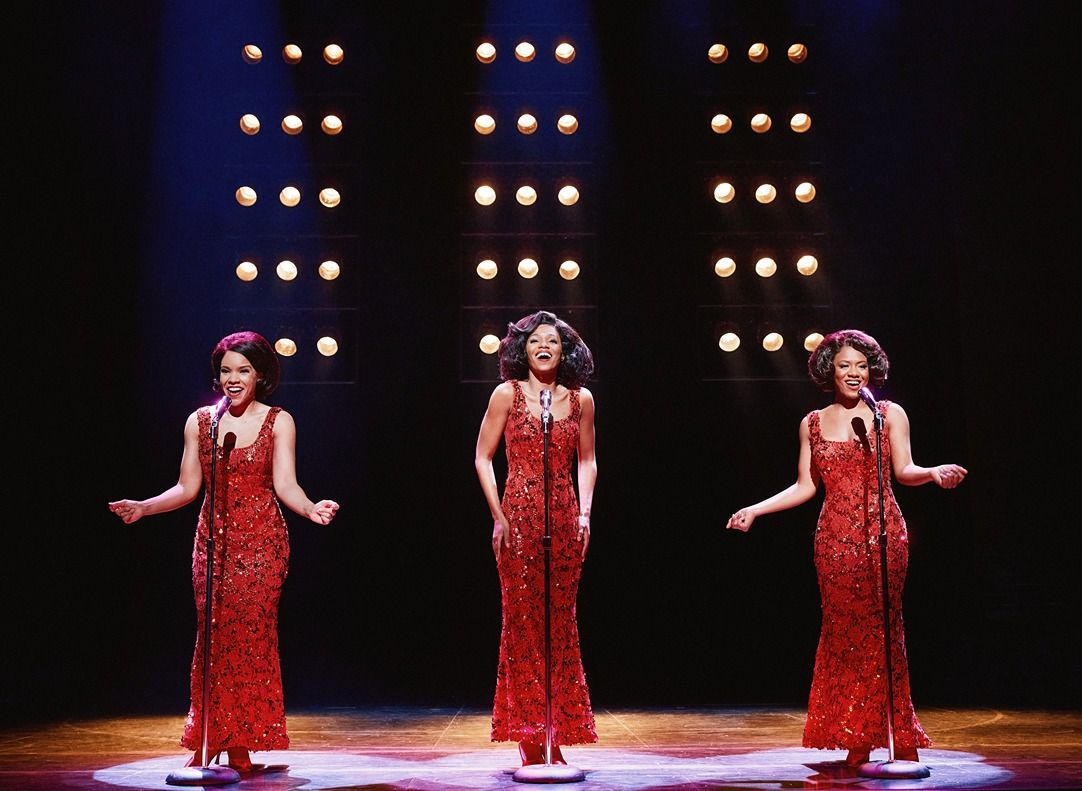
Ain't Too Proud opened in March 2019 on Broadway, but was hampered by the shutdown during the pandemic and unfortunately could not regain its main stage footing, closing in January 2022.
Although it was in contention for 10 Tony Awards, the musical only won for best choreography by Sergio Trujillo and it is easy to understand why in this production.
So, why Ain't Too Proud—The Life & Times of The Temptations? Because, as the show aptly celebrates, they alone were—and continue to be—the number one Rhythm & Blues/Hip-Hop Artists Of All Time (Billboard). Few have persevered through time with the sheer determination, drive, and genuine love of singing despite all and ascend to music immortality beyond possibility in their time.
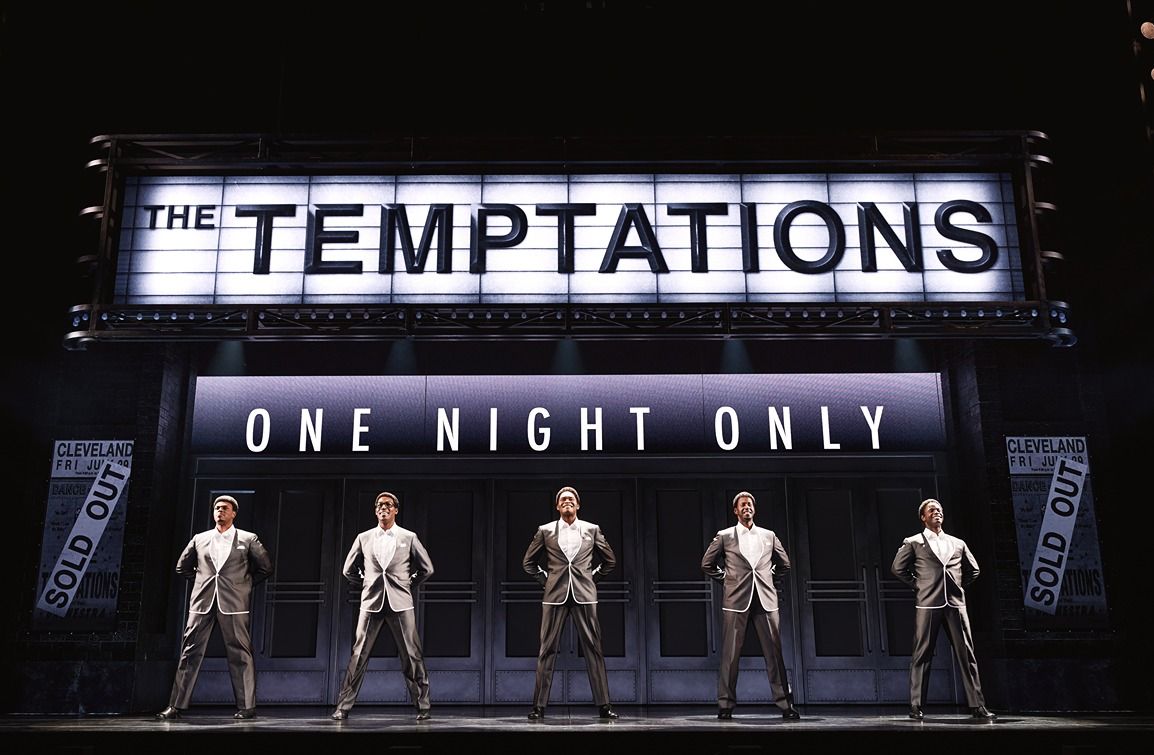
Ain't Too Proud is currently running at the Saenger Theater through March 3. Tickets can be purchased on the Saenger's website.
"I Dreamed a Dream"
Les Misérables opens this week at the Saenger Theatre. A poignant story of love, loss, and survival, Les Misérables is a timeless classic that shouldn't be missed.
Les Misérables, also called Les Mis, is a musical based off of Victor Hugo's 1862 novel of the same name. With music by Claude-Michel Schönberg and lyrics by Alain Boubil and Jean-Marc Natel, the original French musical first premiered in 1980 in Paris, France. Five years later, it made its English-language premiere in London, where it's been running since—making it the longest running musical there.
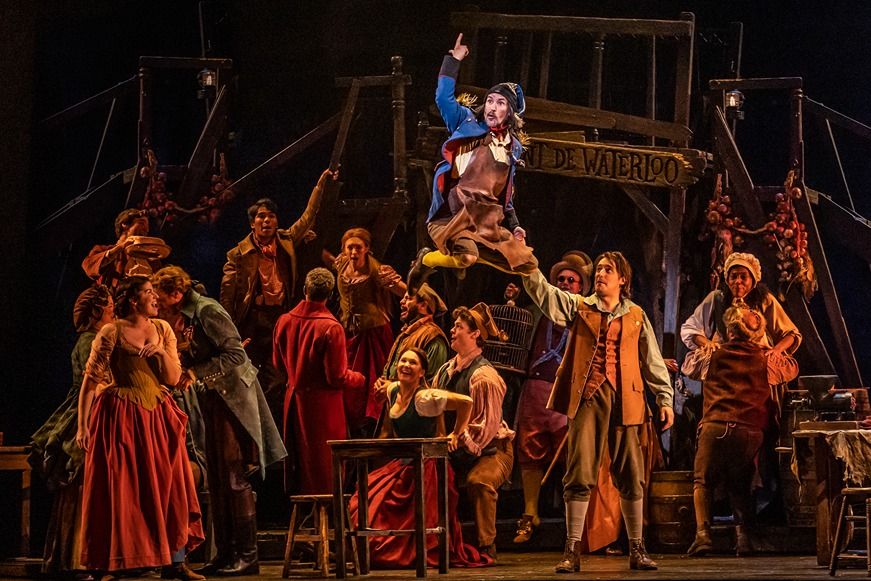
The story is a poignant one. Situated in 19th century France, Les Miserables tells the tale of Jean Valjean, a man who is released after 19 years in jail for stealing bread for his sister's child, who was starving. Valjean tries to start a new life after he breaks his parole, but Inspector Javert will not let that happen and goes on a relentless pursuit of him. Meanwhile the French Revolution serves as the backdrop to this character's journey, causing danger and impossible stakes for everyone.
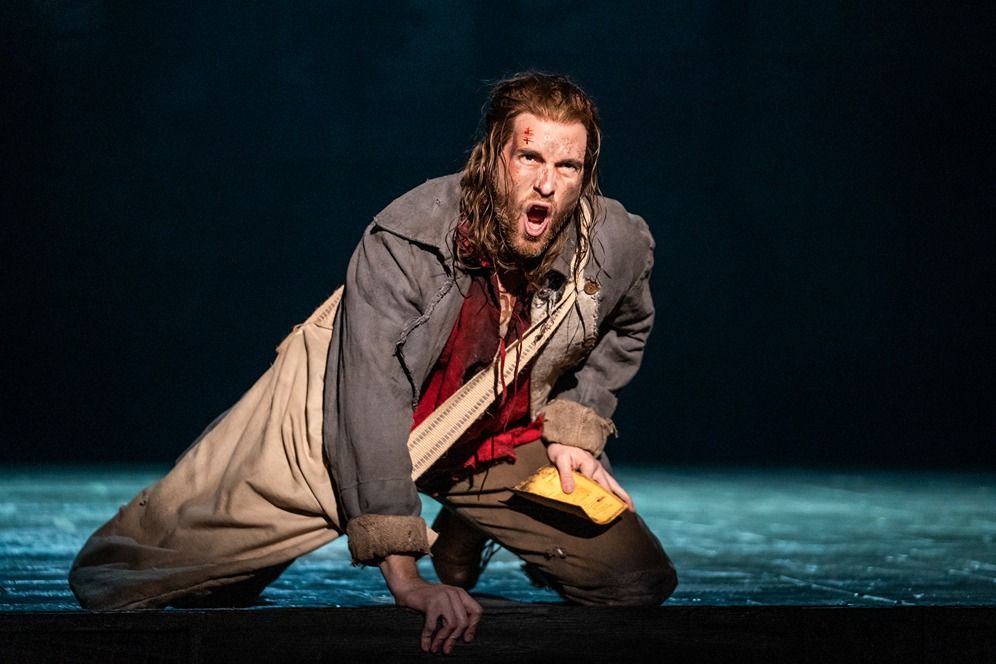
Prologue
The play opens to a jail scene and an introduction to Jean Valjean, who is then released on parole. However, life on the outside is difficult and he is shunned wherever he goes. Frustrated, Valjean steals the Bishop of Digne's silver. Valjean is caught but the bishop says he did not steal and tells Valjean to use this opportunity to become an honest man.
Act I
In Act I, which occurs eight years later, Valjean has made a new life for himself as a factory owner and the mayor of a small town. Fantine, an impoverished single mother, tries to support her daughter, Cosette, but has one mishap after another, ultimately resorting to prostitution to survive. Valjean rescues a man pinned by a cart only to be spotted by Javert, who is suspicious that this man is the escaped convict he has been searching for. Later in a hospital, Valjean promises a weakening Fantine that he will find and take care of Cosette. He once again escapes capture by Javert.
Act II
Many years have past and Cosette is grown and in love with Marius. During the Paris Uprising of 1832, everything is chaos and Valjean plans to go into exile. Students are making political plans and Marius' best friend is shot and killed. Valjean tries to protect Marius for Cosette, but it is difficult. Valjean and Javert once again entangle themselves in a capture and escape cycle. Finally, Valjean is near death when Cosette and Marius come to him. He gives her a letter revealing the truth about his past and her mother. He dies and is joined by the spirits of Fantine and Eponine taking him to heaven.
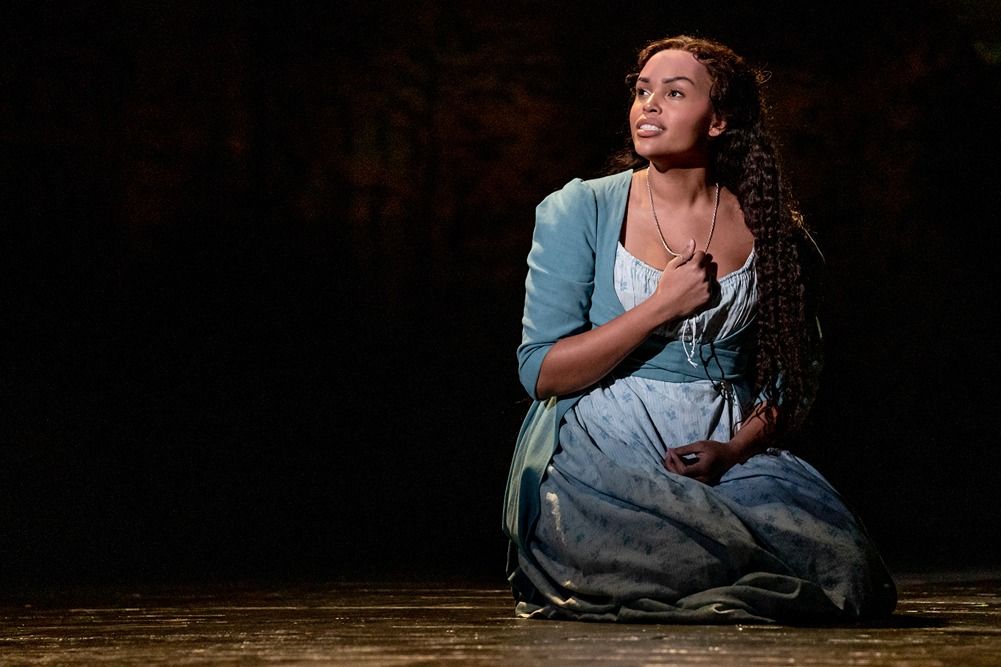
Performance
The cast performed to a packed, enthusiastic house, and the audience was shouting "bravo" and singing along throughout the performance. Nick Cartell, who played Jean Valjean, was especially strong with an incredible vocal range and the strength as an actor to move his character from a young man to an elderly, finally dying, person. His moving rendition of "Who am I?" was one of the most poignant moments in the show. Preston Truman Boyd, playing Javert, brought a clear sense of conflict, as well as a ringing voice to go along with the character. His constant, troubled pursuit of Valjean was the thread holding the story together.
While the entire cast was well-suited to a play with this big of a sound, Haley Dortch as Fantine was a clear standout. Her rendition of "I Dreamed a Dream" had nuance as well as emotion. Mya Rena Hunter as Eponine commanded the stage with a powerful raw performance as she proclaimed her love for Marius. The children with pivotal roles and solos also showed they had the chops to support their adult peers.
The set of Les Misérables was spectacular, with backdrops that showed a distant, foggy view of France constantly changing to the second act's famous barricade scene, where the revolutionaries fought a brave fight. As any set should do, it drew the audience into the story, making them connect even more closely with the action of the play.
This play is a classic, containing all the emotion of a dramatic, tragic story, with stand out solos from several of the performers as well as ensemble pieces that were rousing and fun to see.
Les Misérables runs through Feburary 4 and tickets and information can be found on the Saenger's website.
Saenger Theatre is "a Room Somewhere from the Cold Night Air"
Originally created for the stage in 1956, My Fair Lady is the musical version of George Bernard Shaw's hit play Pygmalion, originally penned in 1912. So it's intriguing to see how the show, what is effectively a period piece rom-com about pursuing happiness by trying to conform to society's standards, will be received at the Saenger Theatre in New Orleans by the city's contemporary patrons.
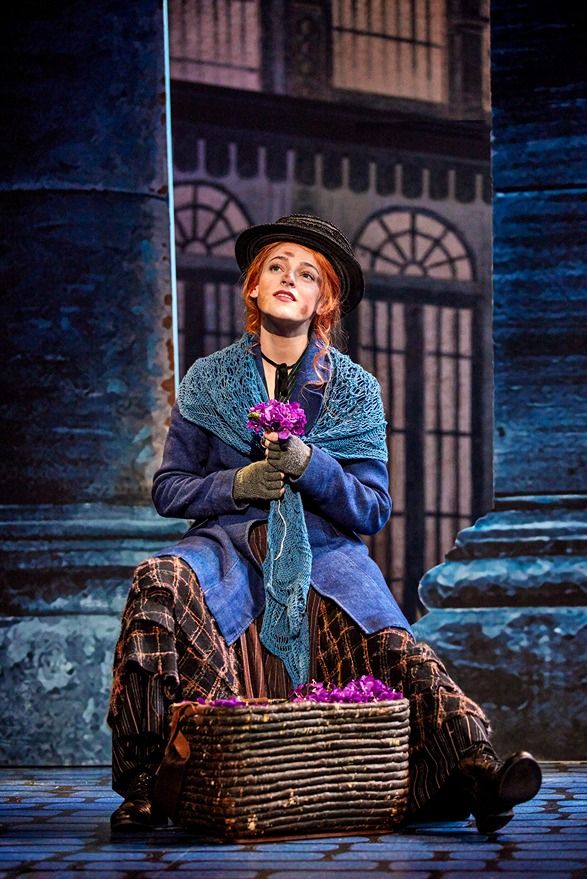
With a Little Bit of Luck, Act I
Set in post-Edwardian era London, Cockney "guttersnipe" and flower-girl Eliza Doolittle (Anette Barrios-Torres) implores phonetics professor Henry Higgins (Jonathan Grunert) to help her perforate British society's class system to rise above her lower station. Anti-social Higgins takes the challenge when visiting linguistics colleague, Colonel Hugh Pickering (John Adkison), taunts the professor to back up his dialect theories with a wager, betting Higgins can't convincingly train the girl enough to fool European nobility at the annual Embassy Ball in six months time. Arrogantly confident in his intellectual beliefs, the professor accepts the bet. Eliza's transformative lessons begin immediately—with a long-overdue bath. Setbacks, both societal and personal—with an exceptionally bad gaff at the Ascot horse race—galvanize Eliza to make more of an effort.
You Did It, Act II
Her efforts are rewarded with an upper crust introduction at the Embassy Ball that successfully intrigues the haut-monde's curiosity, and thwarts a former student of Higgins, who parlayed his knowledge into blackmailing European aristocracy, determined to reveal Eliza as a fraud. Her effort and success goes unacknowledged while the two men bask in "their accomplishment," which is the breaking point for Eliza.
Although her anger is a shock to the professor, her emotion forces Higgins to see her for who she is, which finally peaks the romantic interest of her tutor. But Higgins' only allows himself to admit these foreign feelings when his competitive nature is fueled when Eliza runs off with smitten high-society suitor Freddy Eynsford-Hill (Nathan Haltiwanger), who comes a'calling (some might say stalking) Eliza "On the Street Where You Live."
Struggling with who she is, self worth with her newfound acceptance, and conflicting affections in her love triangle, Eliza has a chance encounter with her her dad, Alfred P. Doolittle (Michael Hegarty), who shares his frustrations at the downside of his recent reversal of fortune, which elevated him from poverty to middle-class respectability. Alfred's setting aside his drunken ne'er-do-well ways to get married—albeit fighting it to the end ("Get Me to the Church on Time"). The revelations from her father—along with his uncharacteristically perceptive observation about the pitfalls of class—further complicate Eliza's cynical world view.
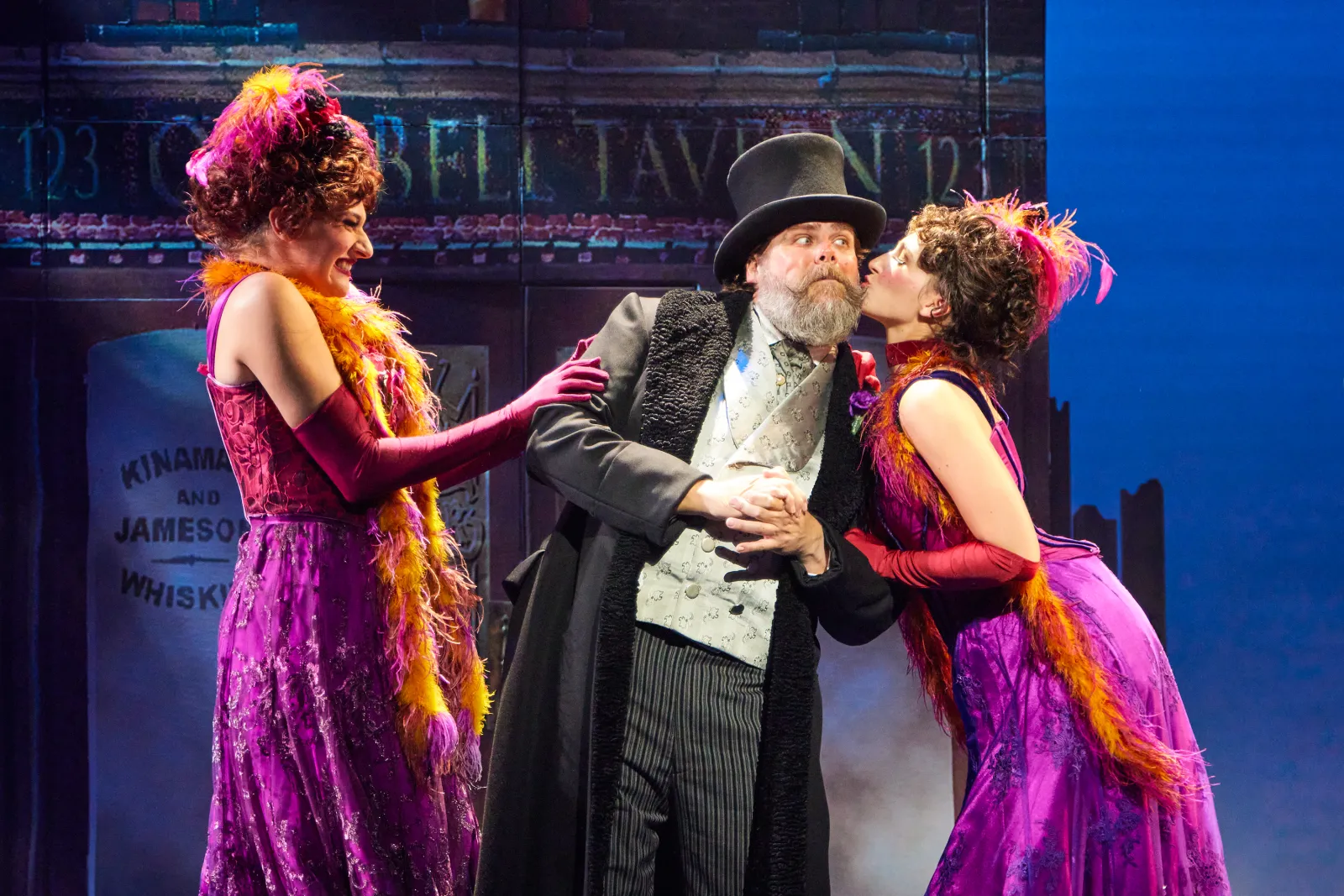
Similarly, Higgins faces a fight with his feelings at the prospect of Eliza leaving ("I've Grown Accustomed to Her Face") and races to his mother (Becky Saunders) for empathy, only to discover her comforting Eliza. A war of words between Higgins and Eliza ensues, but this time Eliza is equipped with new found dignity and confidence.
If the plot seems familiar, it is probably because the century-old storyline has been tweaked in countless plays, movies, and TV shows for each generation. Of the more recent popular adaptations is a loose interpretation for the Julia Roberts and Richard Gere vehicle Pretty Woman, also made into Broadway musical staged most recently at The Saenger Theatre in October 2022.
By the time the curtain falls, it's evident that despite changes in technology, sensibilities, and culture through the decades, there are some things that may shift but are ultimately timeless and simply do not change over the years—life, love, and the pursuit of happiness. But beyond that, the show's sensibilities are not anchored in the early 20th century, but are surprisingly relevant—and perhaps even more so—in the early 21st century.
Because of this, even if this musical's many play or film versions have never been seen before, it's not difficult to figure the age-old questions of who does Eliza choose, is Higgins falling for Eliza's new persona or for who she is, and who is really changing who? But with an inspired non-conforming close, the happiness of the ever-after at the final curtain is left to the eye of the beholder.
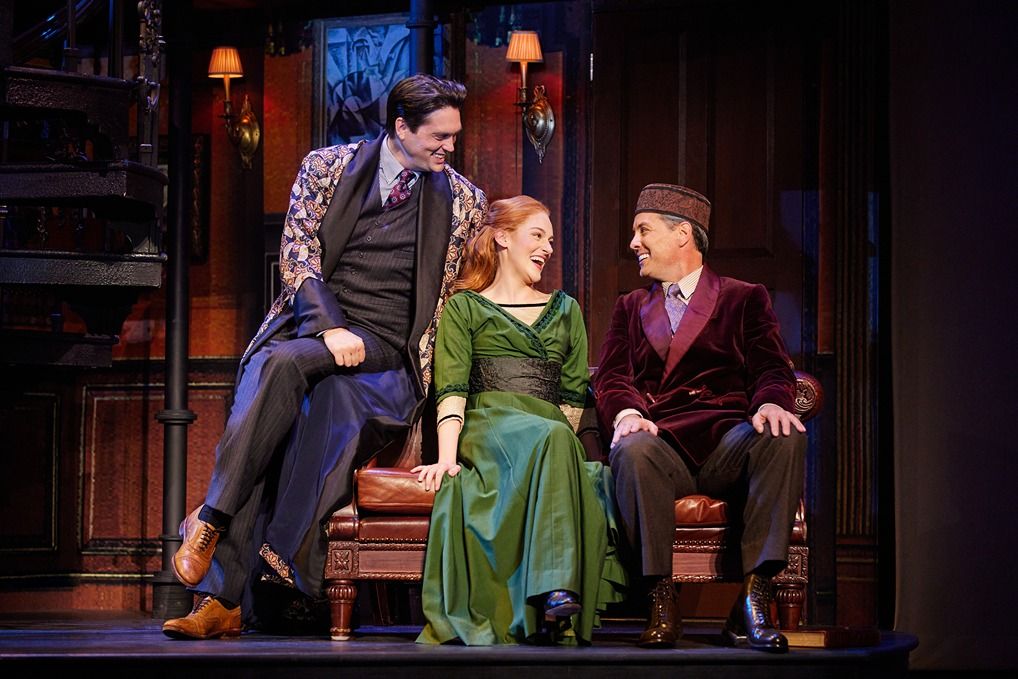
Just You Wait
Themes of sexual equality, gender equality, and equal credit for efforts were important during a time before women had the right to vote and were unheard of in the workforce. This production infuses suffragettes in the background of one scene to remind the audience of just how far—and how little—women's place in society has changed. And with Shaw's skilled writing, adapted by Alan Jay Lerner, the themes transcend 11 decades only to have relevance with current societal themes—namely giving women the credit they've earned and deserve, as well as gender roles.
Anette Barrios-Torres convincingly flip-flops between Eliza's high- and low-class British accents. The actor has a very strong voice, at times evoking vocal intonations similar to Julie Andrews, who originated the role.
Jonathan Grunert makes Higgins' introverted curmudgeon believable. Higgins is well respected but not well liked, even by his mother, who is continually—but hilariously—unhappy to see him. Big Bang Theory fans might find a closer comparison of the pompous Higgins to a British Sheldon Cooper as opposed to Rex Harrison. Grunert brings much humor to Higgins' unhappiness of having his world disrupted, resisting the rules of attraction, and being perplexed by interpersonal relations in the world around him.
The role of Alfred P. Doolittle's is expected to steal the show with comic relief, and Michael Hegarty has fun with it. "Get Me to the Church on Time" is one of the strongest sequences in the show and the not-so-subtle comparison between marriage and dying had the crowd cheering through their laughter.
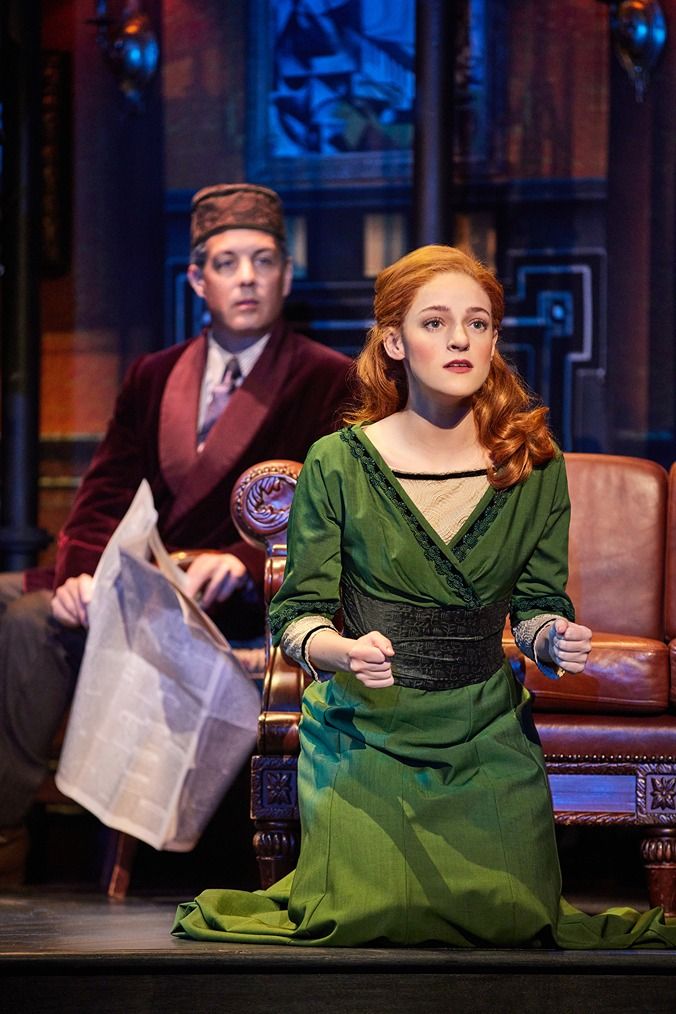
John Adkison's Col. Pickering offers some fun with nonverbal responses as others are in the spotlight. He also adds some mannerisms and tone into his delivery which allows audiences to ponder whether the ex-military confirmed bachelor is in the closet due during that era or just very, very British.
Becky Saunders as Henry Higgins' mother strikes a nice balance between elite snob and empathetic sister-in-arms with Eliza.
I Could Have Danced All Night
Beyond the snappy script and strong acting, it is the choreographed dance sequences complementing the litany of well-known songs that makes this show such an archetype from the Golden Age of Broadway Musicals. Frederick Loewe's music and Alan Jay Lerner's lyrics are complemented by Christopher Gattelli's choreography—at times elegant ("The Embassy Waltz") and others extravagant ("Get Me to the Church on Time")—which reminds audiences why these revivals are still relevant, popular, and fun.
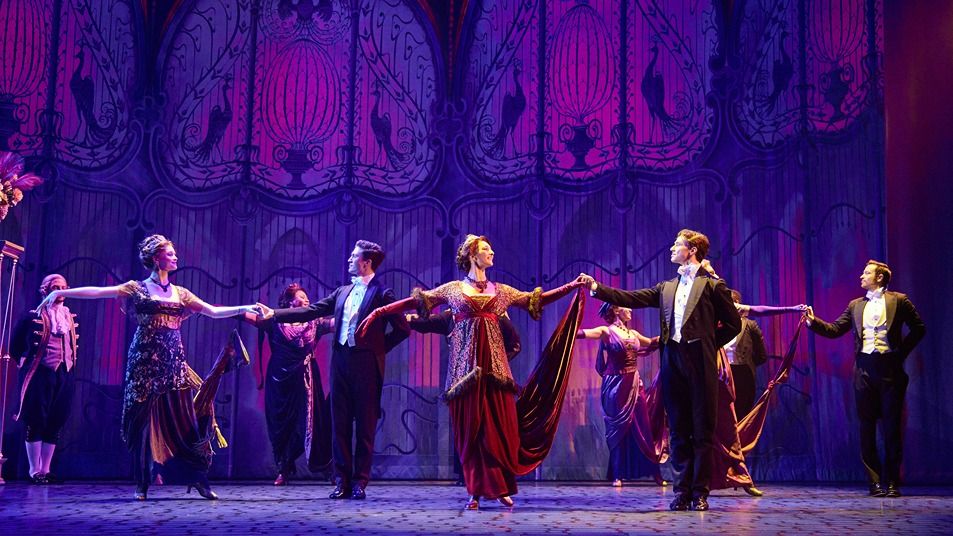
The Broadway revival of this My Fair Lady is a classic musical to showcase in New Orleans, so—in the words of Eliza Dolittle—"move your bloomin' arse" and get tickets before it's gone.
My Fair Lady is at The Saenger Theatre through Sunday January 14. Tickets are available at saengernola.com.
A Witch for All Ages
Since it opened on Broadway in New York City during Halloween weekend 2003, Wicked largely redefined The Wizard of Oz and Broadway musicals for families in a way that eludes the Disney machine—with universally relatable characters. At the Saenger Theatre in New Orleans during last night's opening night, the show solidified its universal appeal, which transcends demographics two decades later.
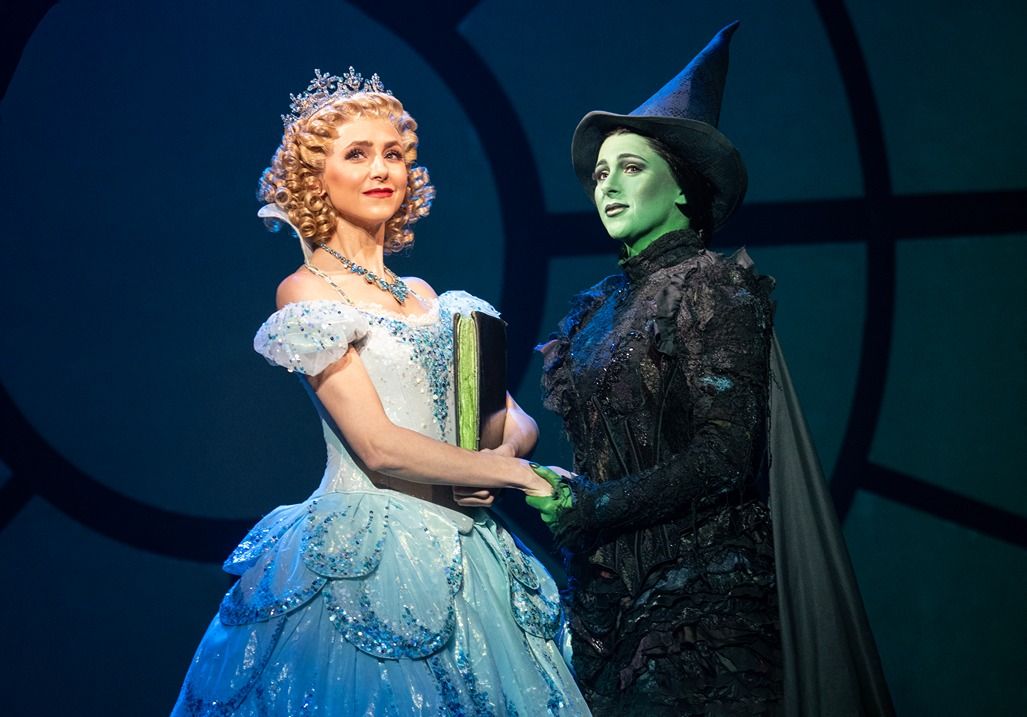
The musical origin story of Oz's Wicked Witch of the West is extracted from Gregory Maguire's 1995 book. Innovative and fresh when it debuted, the turn-a-story-on-its-head plot shows the unknown deep friendships between the Wicked Witch of the West and Glinda the Good not made clear in The Wizard of Oz, and what really happened before Dorothy came to town.
The Story Continues (Spoiler Alert)
Opening with Munchkinland celebrating the death of the Wicked Witch at the end of the film, the play then flashes back to brilliant goth-girl Elphaba (Olivia Valli) arriving at the exclusive Shiz University (of witchcraft and wizardry?) ostensibly to look after her crippled half-sister, Nessarose (Tara Kostmayer). Black-clad Elphaba's green complexion—the result of her mother's illicit potion-induced one night stand from which she was conceived—ostracizes her as soon as she steps on campus, being met with insensitively cruel classmates, including popular queen bee, Glinda "the Good" (Celia Hottenstein).
The extraverted Glinda mocks introvert Elphaba by pretending to befriend her, even gifting her the witch's iconic pointy hat as a joke. When the white witch's manipulations are realized, Elphaba chooses to own her reputation rather than giving her tormentors the satisfaction and a reluctant connection develops between the two.
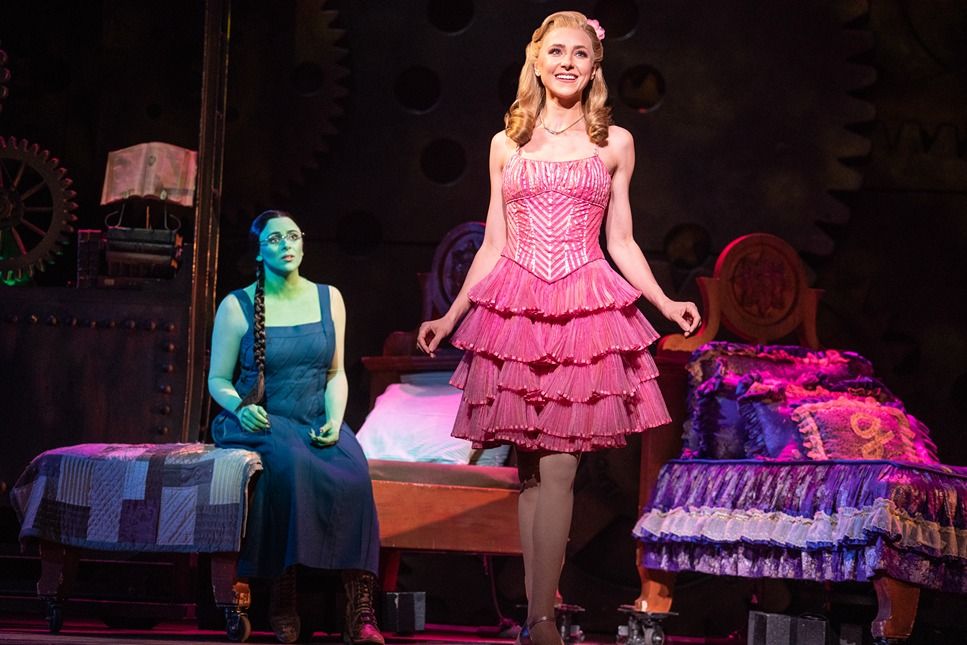
They quickly realize they are more alike than Elphaba's black wardrobe and Glinda's glistening white garb suggest. Glinda's efforts to mainstream Elphaba by making her "Popular" are as hilarious as heartbreaking.
Things are "politically charged" at the mystical school, and magic is afoot. Top-student Elphaba notices nefarious activities but her concerns are blithely dismissed by her roomie, who is more focused on navigating all the boys.
Glinda sends Munchkin boy Boq (Kyle McArthur)—who is obsessed with her—to woo wheelchair-bound Nessarose to clear the way for her to date dumb-hunk (some would say brainless) Fiyero (Christian Thompson), who is more intrigued with Elphaba. The expected results are multiple romantic-triangle deceptions, miscommunications, jealousies, and betrayals that begin to spiral out of control for all. Adding to the mischief, Elphaba's mystical talents are noticed by the school's headmistress, Madam Morrible (Kathy Fitzgerald), who has a side hustle as the Wizard's press secretary.
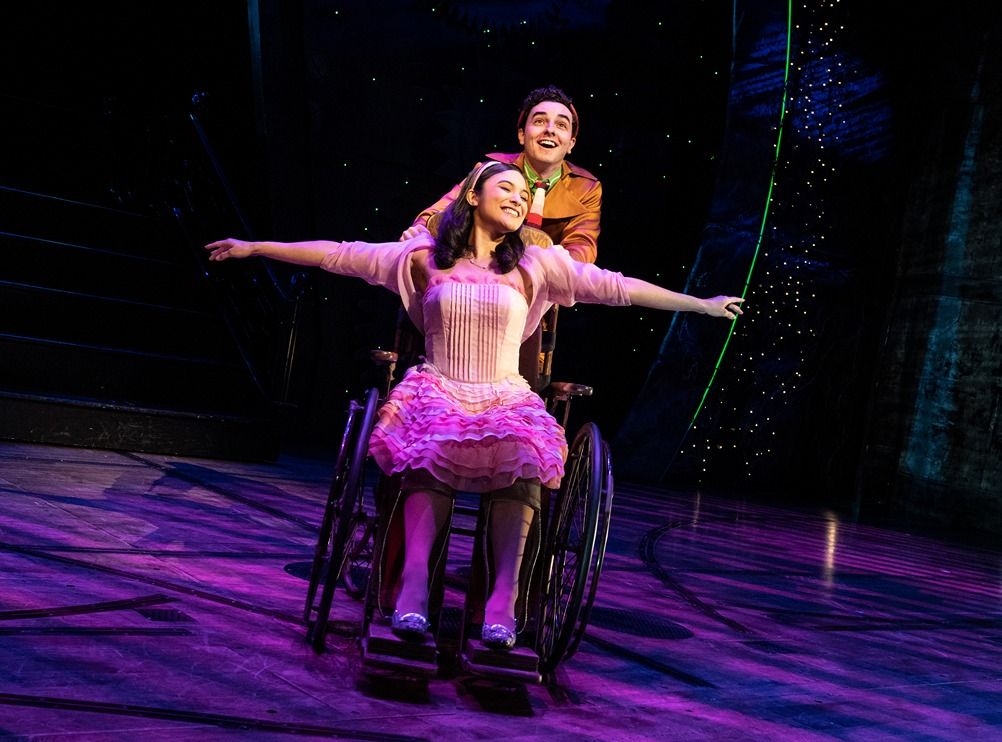
When the roommates visit the Emerald City for "One Short Day," insult is added to perceived injury when the Wizard (Timothy Shew) begins mentoring Elphaba, much to the chagrin of vengefully envious Glinda, who expected the top spot. But when Elphaba doesn't sell out to support the Wizard's agenda, Morrible's PR spin destroys her reputation by making her a villain to undermine her credibility, while elevating Glinda to the spotlight.
Cast'ing Spells
One of the most fun aspects of this play is the slow unveiling of how these teenage rom-com type characters evolve into the Wizard of Oz icons audiences know so well. Then, once its understood as to who they are in Oz lore, how the well-known story is then twisted with love and loyalty, right under the Wizard and Dorothy's nearby noses.
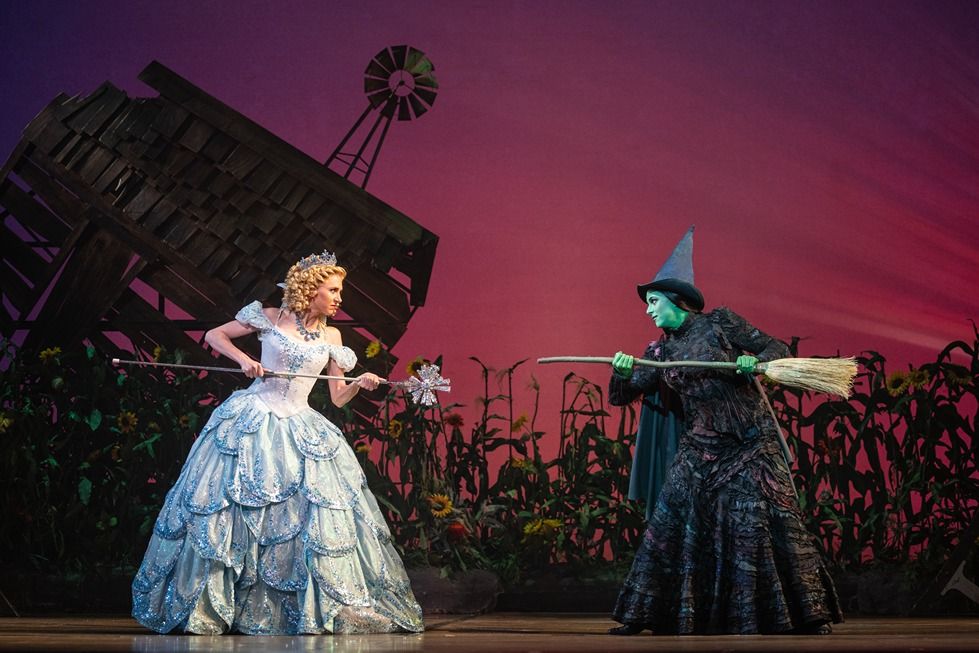
Kristin Chenoweth and Idina Menzel famously originated the roles of Glinda and Elphaba, making them household names (with the exception of John Travolta), but Hottenstein and Valli represent, and impress, with strong performances. Decades away from original cast performances, the actresses are unbound by preconceptions and make these roles their own. The chemistry between the two is palatable and they are clearly having fun together. Beyond that, the pair exudes believability that is as natural as it is relatable.
Olivia Valli, who tripped the Saenger's light fantastic a little over a year ago as Vivian Ward in Pretty Woman, once again shows New Orleans her vocal power. Valli's voice is as powerful as Elphaba's magic, and well suited for her rendition of the first-act showstopper,"Defying Gravity."
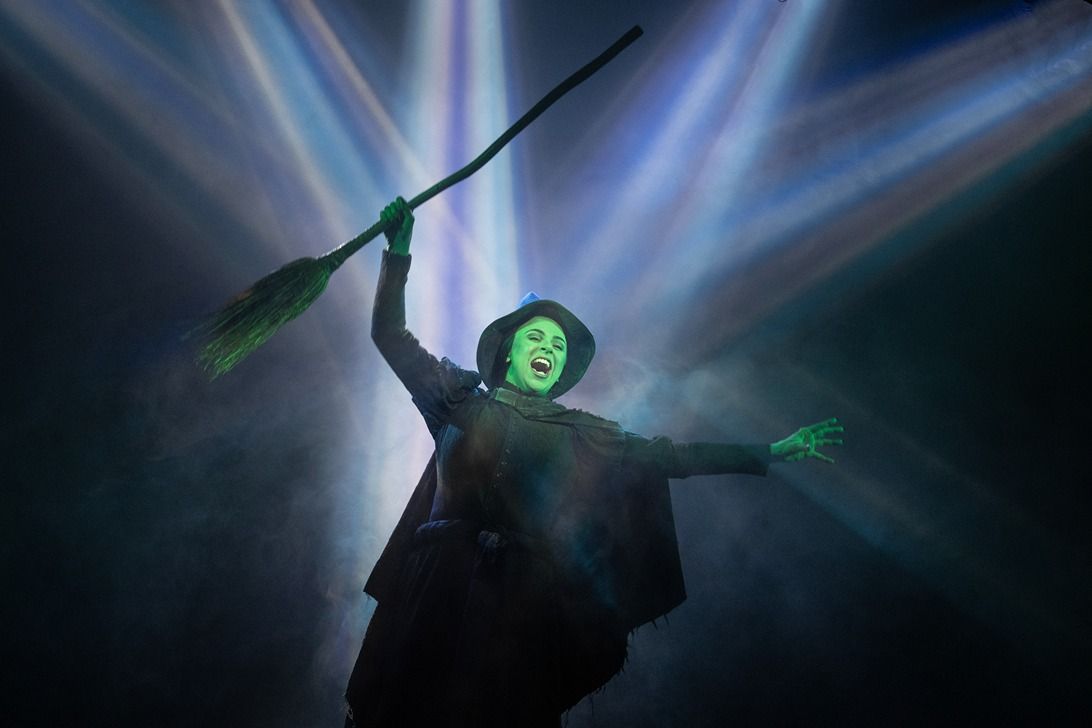
The song is not for insecure vocalists. Even with Menzel's tree-octave range, multiple flats and sharps added to the song makes it very challenging to sing. Beyond that, it changes time signature twice, with several dynamics—its top note being a high E6. Valli rises to the occasion—on a broomstick no less. Vailli is no Menzel, but to her credit, nor does she try to be. She makes the song—and thus the role—her own, with patrons roaring their approval.
Elphaba's songs may steal the show, but when both leads sing simultaneously in duets, their harmony is a magic spell of its own.
Hottenstein, who floats into her first Broadway-level starring role as Glinda, brought an authentic believability to the role, successfully dodging the trap of imitating her predecessors' performances. Glinda's struggle with her own conflicted loyalties, self esteem, ethical dilemmas, and her culpability in escalating her best friend's plight is conveyed effectively in Hottenstein's non-verbals. Transitioning from an entitled, vapid "blonde" into an empathetic and concerned friend demonstrates why she won the role. Her transition from a 20-something carefree optimist to disillusioned, world-weary figurehead is why she deserves the role.
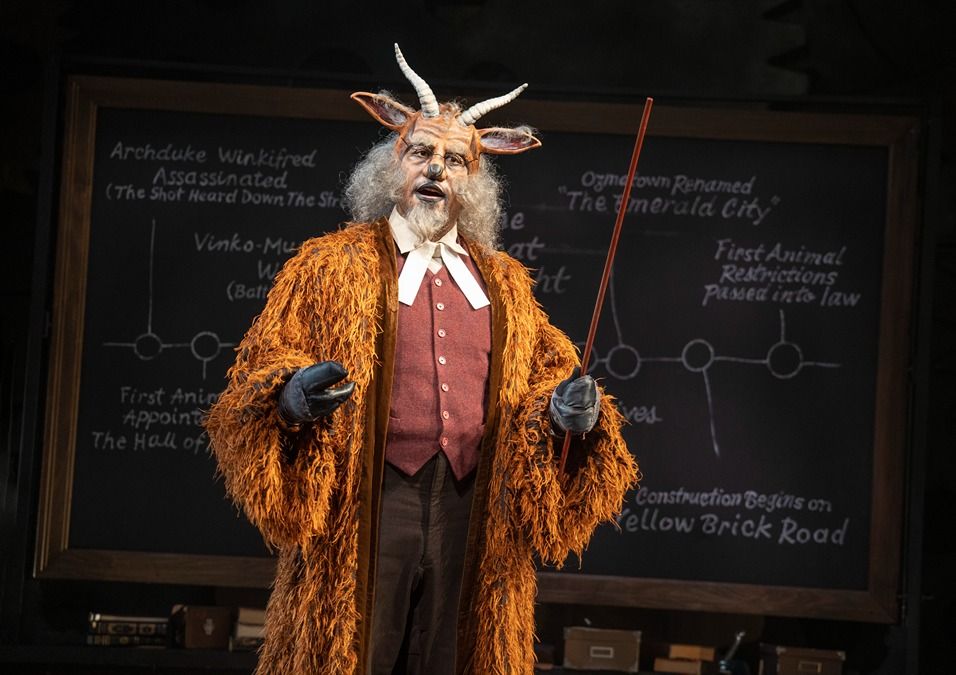
Other standouts included Boise Holmes as Dr. Dillamond, aka Elphaba's favorite instructor, who becomes a literal scape goat; and Kathy Fitzgerald who infuses Madam Morrible with a beguiling warmth undermined by the character's limitless power-hungry agenda. Having played the role on Broadway, Fitzgerald conveys a comfortability in her performance that enhances Morrible's arrogant confidence appropriate for the role.
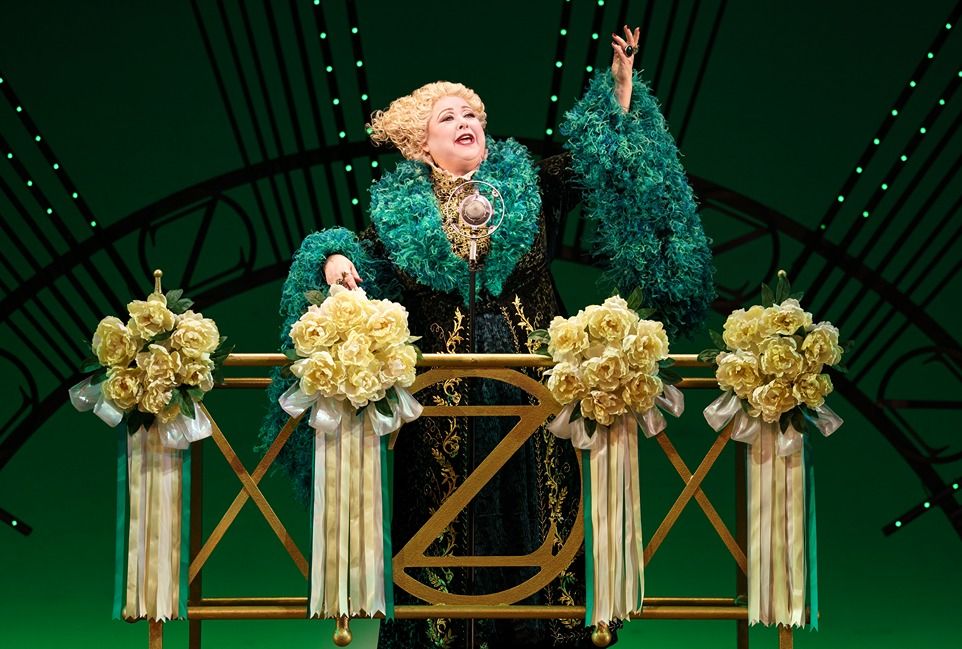
Stephen Schwartz's music and lyrics combined with Winnie Holzman's script not only successfully brings Maguire's book to stage, it manages to make the story timelessly relevant. Their ability to skillfully interweave references alluding to "politically charged times" is rewarded by allowing for the shifting sensibilities of audiences over the years—without needing to change a single word.
Wicked not only creates wonderful memories, it is a fun gift to share with the whole family. But with it being in New Orleans, fans do not need to travel to New York to see it. And as Dorothy knows, "there's no place like home"—especially for the holidays.
Wicked will have a limited residency at the Saenger Theatre through Dec 17.
The
King of Pop Returns
Michael Jackson is one of the most unmatchable musical artists and performers of all time. From his start as a child star amongst his brothers in the renowned group The Jackson 5 to his boundless fame as a solo artist, Jackson set the standard for everlasting fame in pop culture. Putting his life on display, MJ the Musical shows the highs, lows, and an ironically heartwarming perspective of the musician's story, set against the backdrop of an electrifying stage setting and exceptional performances.
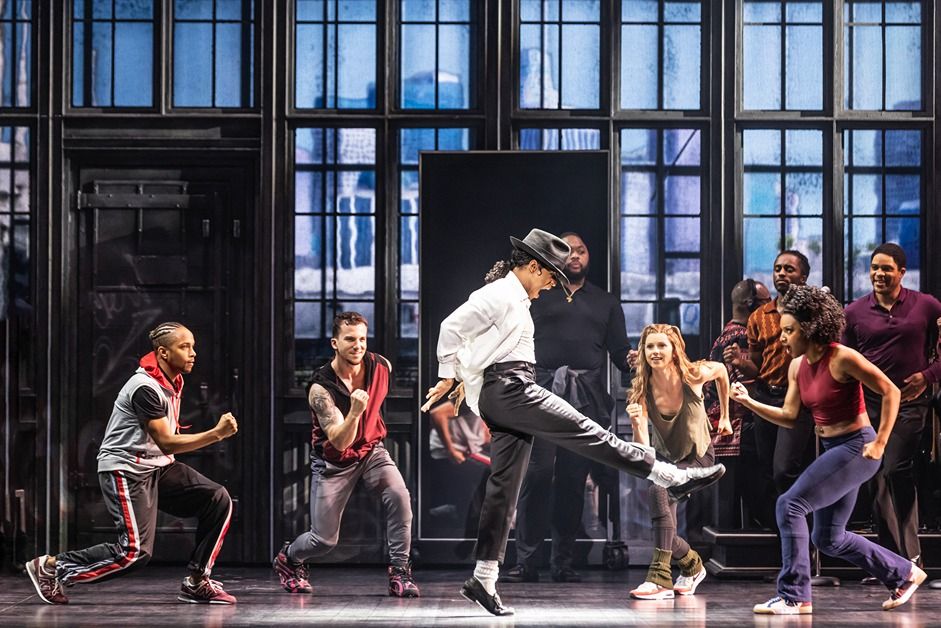
Sitting in the theater, the audience glimpses into the rehearsal of the 1992 Dangerous World Tour, which is the center point of the entire musical. The jukebox musical uses a series of dream sequences and flashbacks, allowing MJ to tell his story.
As the performance begins, the viewers are introduced to MJ's manager Rob (Devin Bowles), who also phenomenally doubles as Joseph Jackson, MJ's stern father. Rob is preparing the performers as Michael Jackson (interchanged between Roman Banks and Jamaal Fields-Green) makes his grand entrance, leading to the outstanding opening number "Beat It."
While they rehearse, an MTV reporter named Rachael (Mary Kate Moore) enters the stage in an attempt to gain an interview with the world-famous superstar. During the ongoing interview process, the audience witnesses the life of MJ, from his start in Gary, Indiana, to his current success of releasing his latest album Dangerous and preparing for the world tour.
The Production
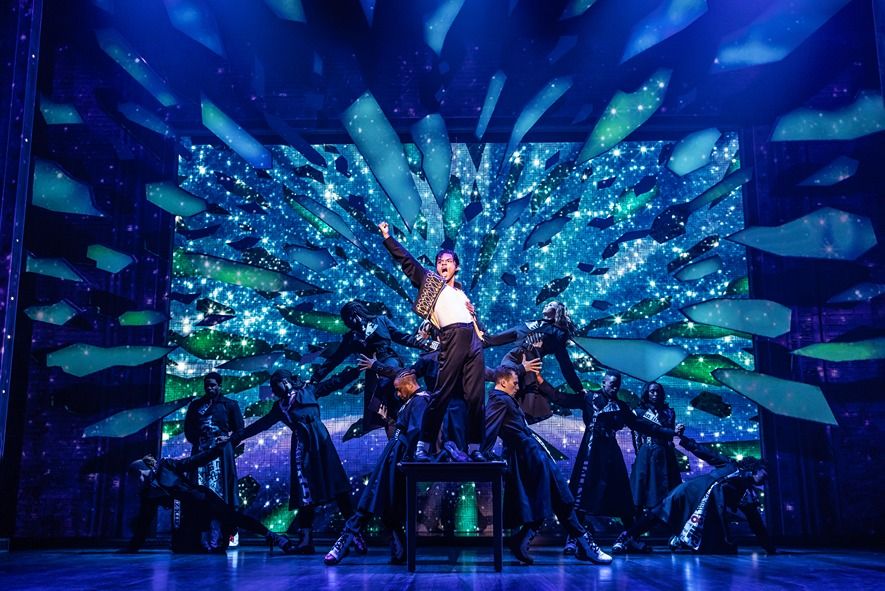
After being announced in 2018 by director and choreographer Christopher Wheeldon, MJ The Musical was set to make its Broadway debut in the summer of 2020 but was paused due to the COVID-19 pandemic. In collaboration with The Michael Jackson Estate and Columbia Live Stage, the musical premiered in 2021. It kicked off its national world tour in 2022, eventually leading it to New Orleans' Saenger Theatre.
On the Saenger's stage, audiences not only got a look into the life of the performer but were also rewarded with 40 musical numbers of MJ hits and more. Playing Michael Jackson, Roman Banks and Jamaal Fields-Green gave breathtaking performances of popular hits like "Billie Jean," "Human Nature," "Smooth Criminal," and a wildly fantastic performance of the audience anticipated "Thriller."
MJ The Musical is
currently at the Saenger Theatre until Sunday, November 12th. For tickets and
more information, please visit saengernola.com.
Louis Armstrong Musical Ushers "A Wonderful World" in New Orleans
On the official opening night, A Wonderful World hit the right notes. A New Orleans street scene evoked a stylized Storyville Red Light District, part of the Tremé neighborhood surrounding the Saenger Theatre outside. The hometown crowd that packed the Saenger Theatre applauded with delight. But the detailed set was seemingly an aperitif. The visual was paired with the audio as the opening hook of "Basin Street Blues" floated over the audience, and they roared their approval.
After fits and starts since the show's inception, including a delayed world premiere in Miami during the pandemic, the musical tale of jazz great Louis Armstrong's life through the eyes of his four wives seems to have finally gotten a break to begin its long overdue journey to follow Satchmo to New York.
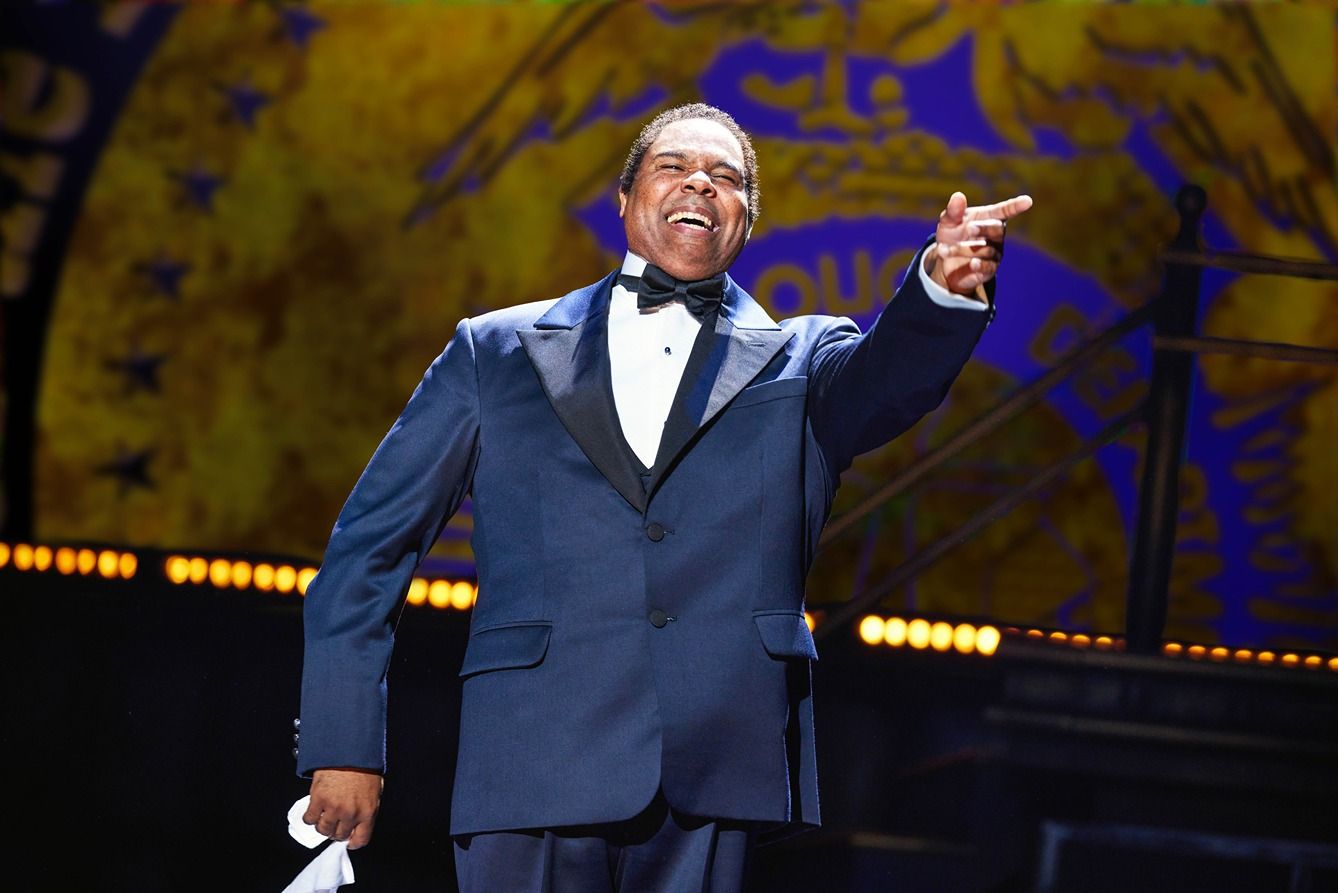
The play ambitiously tackles a tremendous amount of material in two acts, including segregation, love, loss, loyalty, and a whole lot of great music. By focusing on the life of Louis Armstrong from the viewpoint of the unsung "wind beneath his wings" of his four wives, the play's innovative approach has a Rashomon aspect that is uniquely fun and surprising.
The brainchild of Tony Award-winning Broadway director Christopher Renshaw (King and I, High Society), A Wonderful World, he confesses, "What helped me was that by telling his story from the perspective of his four wives it could help contain the subject. They each represent the seasons of his life"—starting with Daisy Parker in New Orleans.
The King of Jazz and His Queens
Spoiler alert ahead for anyone unfamiliar with Louis Armstrong's life and career:
Louis Armstrong was raised in the brothels of Storyville during the early 1900s. In his search for love and acceptance, the fledgling musician is smitten with volatile prostitute Daisy Parker [played by Khalifa White], who becomes his first wife. As his star rises, he is confronted with the realities of racial intolerance and heads north to Chicago.
In Chicago, he is introduced to Lil Harding [Jennie Harney-Fleming], an accomplished jazz performer in her own right. Cynical but refined, Lil shows Louis how to navigate high society with socially acceptable clothing, etiquette, and dignity.
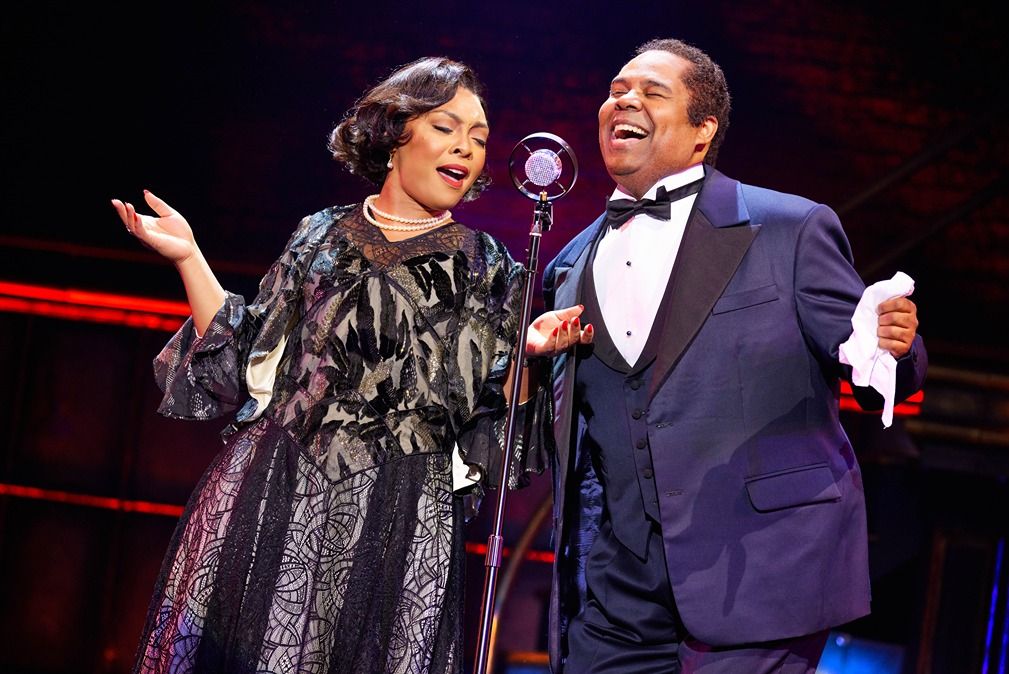
With his meteoric success and refined charm, he finds himself entangled with the much-younger Alpha Smith [Brennyn Lark] as he heads to Hollywood to try and escape the Depression-Era devastation on the live performances within the African-American community. Louis realizes the passion of their May-December romance devolves into one of materialism and manipulation. Iglehart and Lark manage to balance humor and loneliness into this scene.
Louis Armstrong finally finds his elusive romantic match with Lucille Wilson [Ta'Rea Campbell] in New York City. The couple have histories to dance around, but his fame makes his past far more transparent and, thus, Louis more cautious.
True to its promise, A Wonderful World tells the life story of Louis Armstrong and chooses to close the final curtain with the musical's signature song, bookending its beginning sung by the four wives. It will be interesting to see if the audience reactions from pre-Broadway shows in New Orleans and Chicago impacts whether this joyful production about one of the world's greatest jazz legends — much like his music — will change when it trips the light fantastic in New York.
A Friend Like James Monroe Iglehart
Tony Award-winning actor James Monroe Iglehart commands the stage as native New Orleanian Louis "Satchmo" Armstrong. After capturing the American Theatre Wing's coveted award for Best Featured Actor in a Musical as the Genie in Disney's Aladdin, it's no surprise his stage presence and acting chops are up to the task of embodying arguably the greatest trumpet player the world has ever seen...or heard. What is surprising is his incredible ability to emulate Satchmo's raspy voice-especially in song—as well as the actor actually learning to play the trumpet in the show. That and his shaving off his trademark goatee for the role.
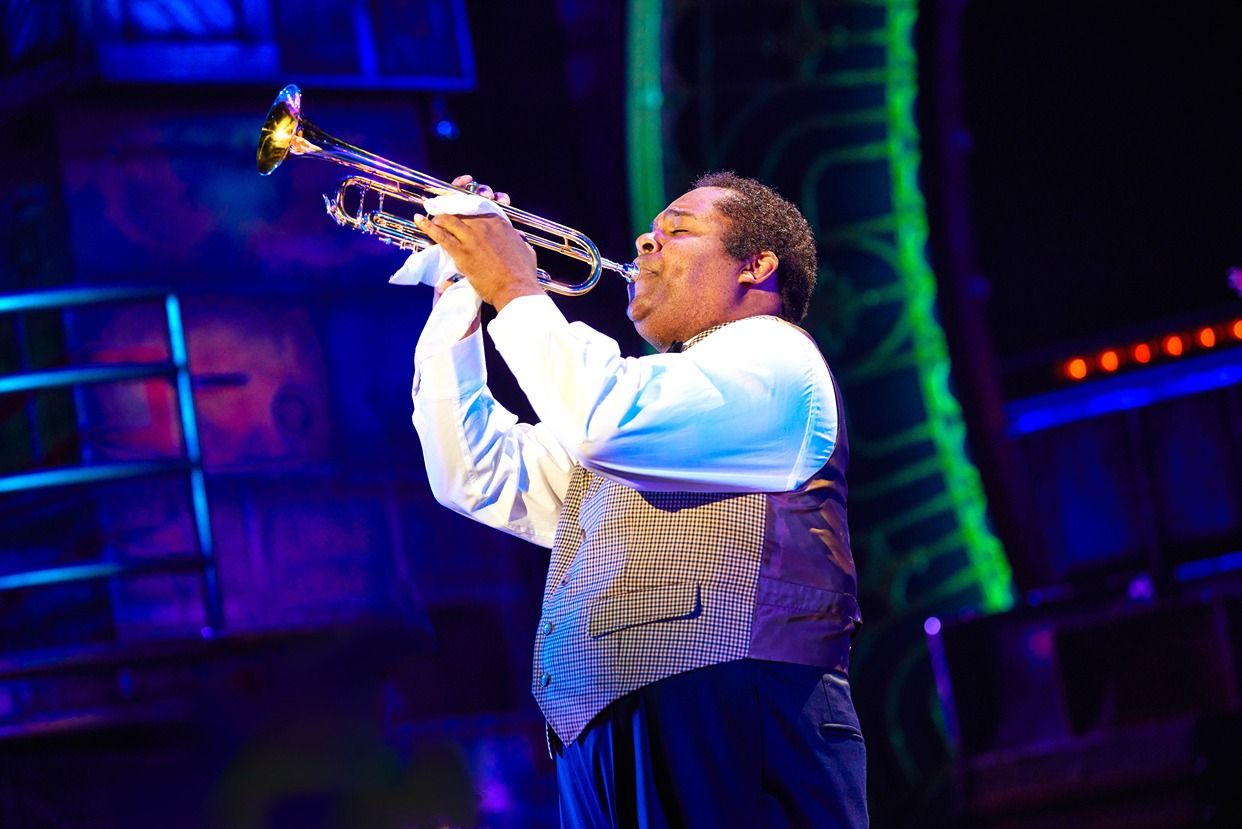
"Louis didn't have any facial hair," Iglehart admits, losing his beard for only the second time in his twenty-plus-year career. "And I admire him."
Iglehart's journey introduces Louis in 1901 and spans 70 years, from a young man in New Orleans who thinks he knows what he wants in the world, including a wife. But as Louis' world expands, Iglehart transitions emotions depth with each stage of life. More than that, though, Iglehart becomes Louis Armstrong in voice and mannerisms that is impressive. And when Iglehart's Louis finds his trademark Cheshire Cat grin while singing "When You're Smiling," you can almost believe Satchmo is on stage.
But much like Armstrong's real-life romances, his stage wives in A Wonderful World are equal to the task of holding their own. The quartet of leading ladies are strong performers playing even stronger women fighting their way in a segregated America with few rights, including the women's right to vote. Yet, these actresses do not cede the spotlight or are upstaged by their theatrical husband. Iglehart also plays on an even footing with them. Whether it's his doing or theirs, the strengths and vulnerabilities of the wives are shown, and does to not allow their famous husband to overshadow them or suck the air out of the room, even as he blows his horn.
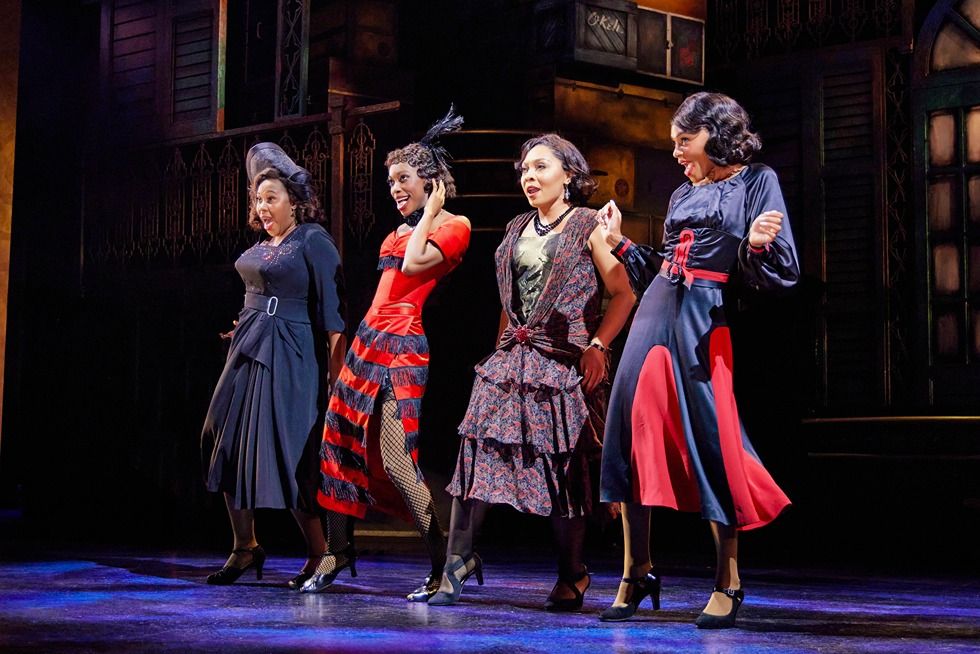
Each actress brings dramatically different personalities that both attracted Louis to their characters, even while they often ended in heartbreak. The actresses all bring empathy and compassion—and a surprising amount of humor—to their roles. Beyond that, the range and power of their respective voices brings the show to new levels, as best demonstrated in their rendition of "St. James Infirmiry."
When Louis and his four wives all take the stage together, it's never boring. When A Wonderful World leaves New Orleans after Sunday's final performance in New Orleans (this season), it will appropriately follow Sachmo's life course and head to Chicago and then to New York City and, hopefully, bigger and better things.
A Wonderful World
As compelling as this cast is, they are all overshadowed (or enhanced) by choreographer Rickey Tripp and tap dance choreographer DeWitt Fleming, Jr. (also an actor playing the role of Lincoln Perry), whose threading the evolution of musical eras through dance during Satchmo's 70 years mesmerizing. After "Basin Street Blues" set high expectations—especially for an audience of enthusiastic New Orleanians—and they were realized again and again with multiple showstoppers, such as a heartfelt "Do You Know What It Means To Miss New Orleans" and "When the Saints Come Marching In". Of course, dancing to Louis Armstrong standards didn't hurt, either.
Other standouts are Matt Wolfe as the easygoing bartender turned successful-ruthless-thug agent to the stars Joe Glaser, as well as DeWitt Fleming, Jr., whose talent in tap shoes as Lincoln Perry steals the show.
Beyond that, A Wonderful World's production values are at an elevated quality level that is apparent to avid theatre-goers familiar with New York productions. From Adam Koch and Steven Royal's sets to Toni-Leslie James' costumes, the care and affection for the subject material is evident.
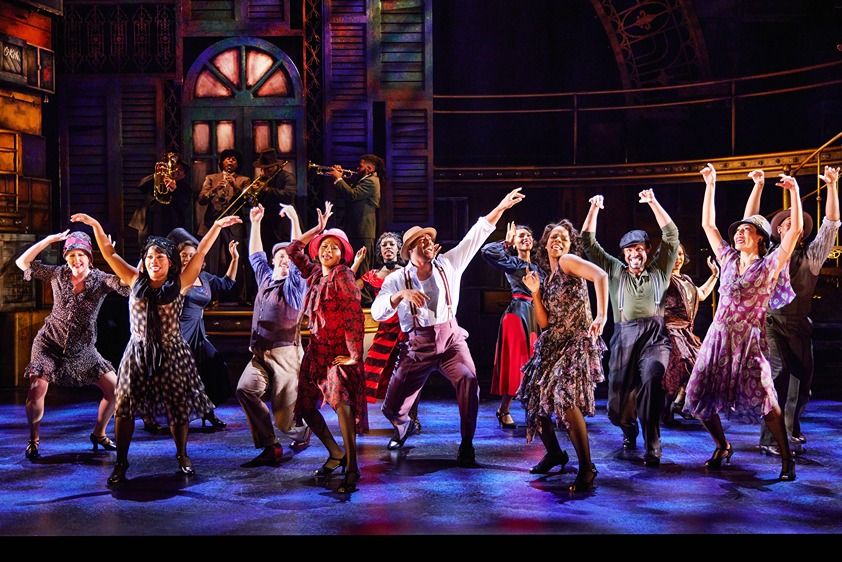
Autumn in New York
Whatever the future of A Wonderful World, this production needs to have a long run on Broadway, if for no other reason to have Armstrong's music performed by these actors originating the roles—in New Orleans no less.
With James Monroe Iglehart committed to star as King Arthur in a revival of Spamalot immediately after the Chicago run, the question will remain who will blow that horn when the Saints come marching in to a New York theatre? This cast is too remarkable to not be enjoyed on an original Broadway cast soundtrack…or even an original Canal Street cast soundtrack.
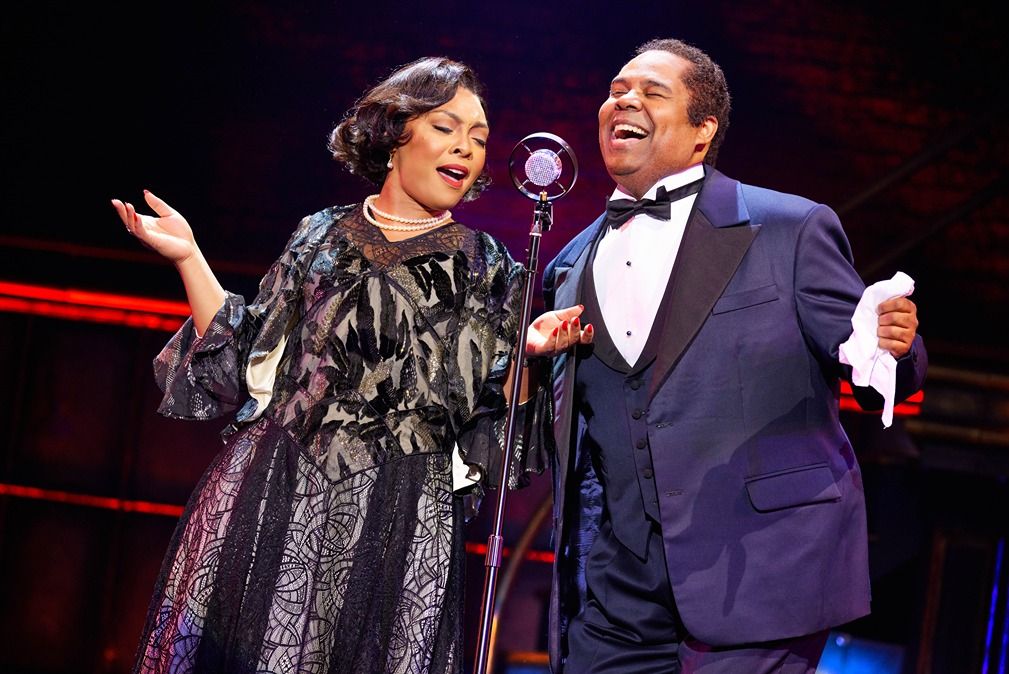
A Wonderful World at the Saegner Theatre in New Orleans runs through Sunday October 8. Tickets available here.
To Kill a Mockingbird
Broadway New Orleans is ending its 2022-2023 season with the compellingly timeless story, Harper Lee's To Kill A Mockingbird.
While timeless, this adaptation of Harper Lee's 1960's novel is also right on time. With today's climate, the story is unfortunately in many ways current and relatable.
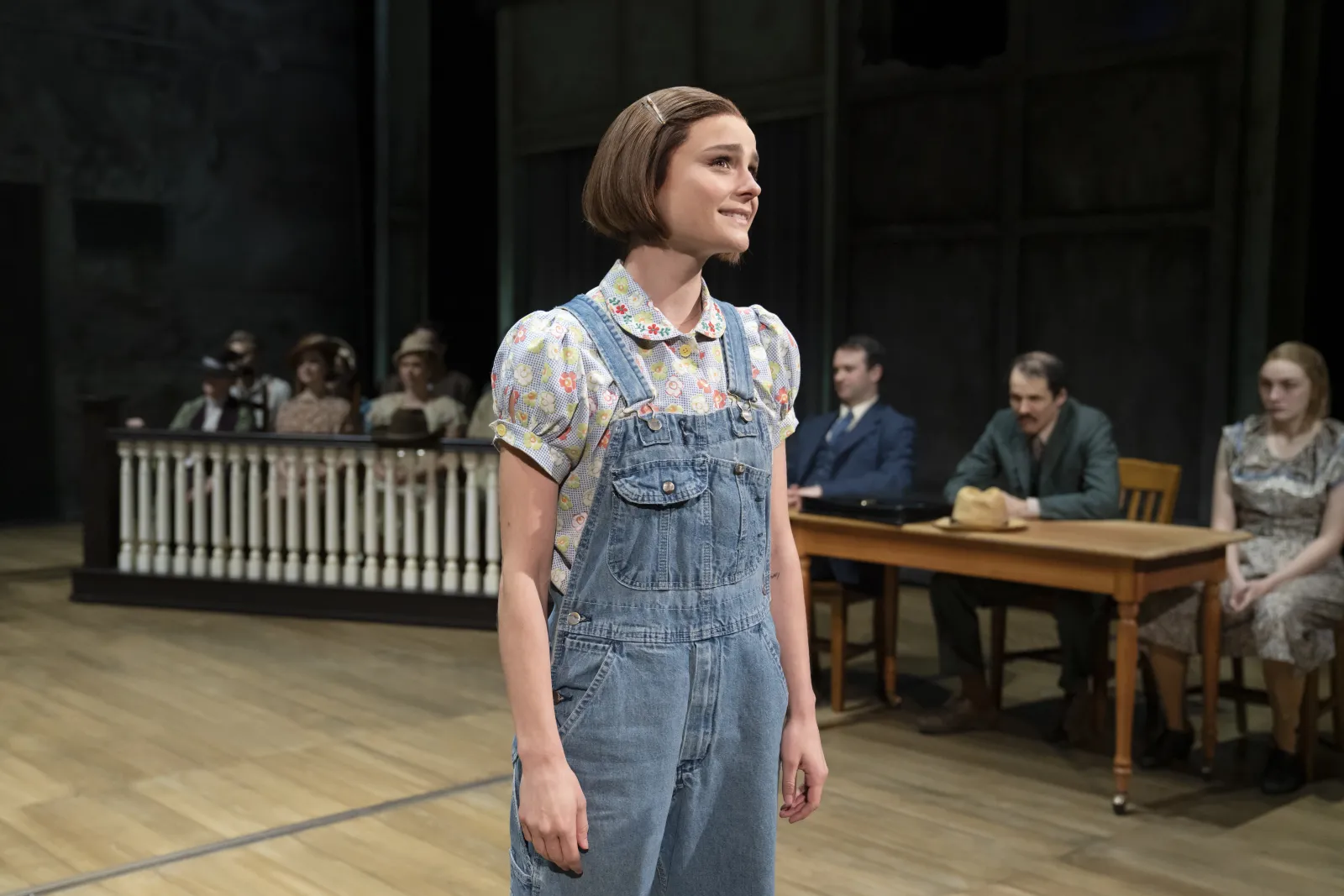
Beautifully performed on stage, make no mistake that this production, adapted by Aaron Sorkin, stands perfectly on its own as a dynamic theatrical experience setting itself apart from the novel and the 1962 film version while maintaining the basics of the storyline.
Sorkin's obvious changes between the play and the book can be seen right away. In the book, Lee spends a great deal of the early pages describing the ins and outs of life in the fictional town of Maycomb, Alabama before leading into the trial. In the play, Sorkin immediately jumps to the trial while seamlessly not missing a beat when it comes to the dynamic of what the story is about and the justice it stands for.
The Story
Like the book, the story takes place during the Great Depression in the fictional town of Maycomb, Alabama. The play is mostly narrated by Scout Finch (Melanie Moore), the 6 year old daughter of a widowed lawyer named Atticus Finch (Richard Thomas).
After Judge Taylor (David Manis) appoints Atticus to defend Tom Robinson (Yaegel T. Welch), a black man who has been accused of raping a young white woman, the town becomes hysterical and Atticus and his family face the brunt of this.
During the one-day trail—interwoven through the narrative of the play—Scout and her strong willed older brother Jem (Justin Mark) manage to befriend a boy named Dill (Steven Lee Johnson) who is visiting his aunt for the summer. Intertwined with the pressures of life and enjoying their summer youth, the three divide their time between sneaking into court while also exploring their fear and fascination with the town recluse Arthur "Boo" Radley (Travis Johns).
While the kids are allowed to explore during their summer break, their father is grappling with the idea of right versus wrong along with his feelings that everyone is inherently good. Throughout the play, he gets a few moments of awakening from his lifelong housekeeper, Calpurnia (Jacqueline Williams) who gives him a different perspective, one that is more relatable to the man that Atticus is defending.
[Spoiler Alert]
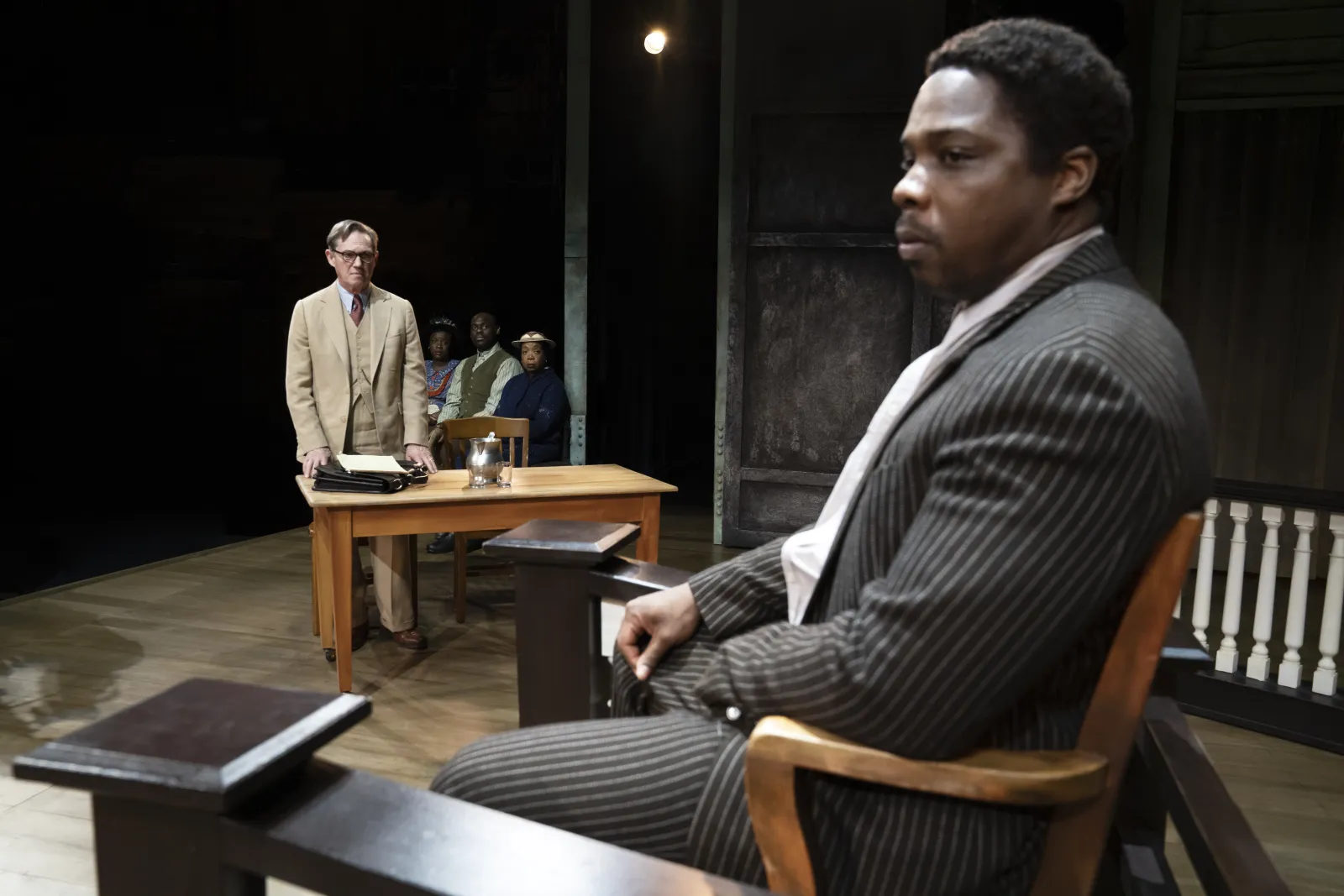
The most pivotal moment of the play is when Tom Robinson is found guilty of raping young Mayella Ewell (Arianna Gayle Stucki) after it's clear that the only sick, abusive rapist in the room is her father, Bob (Joey Collins).
Unfortunately Tom Robinson is killed shortly after, being accused of trying to escape prison, leading Atticus to realize that some people are evil and choose not to be good at heart.
Sometime after, Sheriff Tate (David Christopher Wells) arrives and discovers Ewell dead from a knife wound. While Atticus believes that Jem was responsible, Tate confirms that it was likely the mysterious Boo Radley who killed Bob while protecting Scout and Jem.
Deciding to protect Boo's privacy, the sheriff reported that Ewell fell on his own knife during the attack. And that's where the story ends.
While a karmic justice somehow prevailed, the story is realistic to what would likely happen during the 1930s where a black man was accused of rapeing a white woman.
The Production
Directed by Bartlett Sher, this adaptation of Harper Lee's To Kill A Mockingbird was brilliant and provocative, appropriately defusing stressful and rightfully uncomfortable moments with flashes of humor. Melanie Moore did an amazing performance as a little Scout. She embodied the voice, actions and emotions of a clever 6 year old. A pleasant surprise was that Atticus Finch was played by famous actor Richard Thomas who is also a part of the original cast.
This performance was thrilling, the audience was captivated and filled with emotion. Told from the story of a book that has been read across schools for decades, it was amazing to see the story told on a local stage.
Be sure to check out Harper Lee's To Kill A Mockingbird at the Saenger Theatre until Sunday, June 4th.
Moulin Rouge at the Saenger
The play is set in Paris—the Montmartre Quarter—during the turn of the 20th Century, also known as the Belle Epoque. This lively, bustling period of time was the perfect setting for dreams and love. This love story is one that takes place between the composer Christian and the beautiful cabaret performer, Satine, who is the star of the Moulin Rouge.
The Story
When Christian first arrives, he meets Bohemians Toulouse-Lautrec and Santiago who are working on writing a musical play. They ask Christian to help with the songs and that's where he meets Satine. In a case of mixed identity, Satine believes that Christian is the Duke at first until his true identity is revealed. Satine and Christian eventually fall in love, although the Duke still tries to consume her. He forces her to give up Christian, who is devastated. Satine, who has been ill, becomes worse and in a final, tragic scene, dies in Christian's arms.
The Production
With a multi-layered illuminated red heart-shaped set as the background and MOULIN ROUGE in bright lights, this production exploded on to the stage. The show started out with a steamy, sultry rendition of "Lady Marmalade," initially with four performers shaking their stuff, but eventually with a full cast, can-can girls and all. The tragic love story of Christian and Satine revealed early sparks when the two first meet despite Harold Zidler's attempt to push her into the arms of the Duke and secure funding to keep them all from being homeless. Courtney Reed as Satine had a powerhouse voice as she ran through the songs within songs that make up Moulin Rouge's set list. Her opening number had all eyes on her when she entered on a sparkling swing and sang the Diamond sequence, which included "Diamonds are a Girl's Best Friend," "Material Girl," and "Diamonds are Forever." John Cardona, who played Christian, was the perfect hopeless romantic with an amazing voice as he tried to convince Satine that all you need is love.
The lighter, comical moments in the production were played to perfection by Nick Rashad Burroughs as Toulouse-Lautrec and Gabe Martinez as Santiago--the duo who lure Christian into their bohemian, dream of writing a musical for the Moulin Rouge. Their timing and energy provided a little break from the heart wrenching moments between Satine and Christian.
Some of the best moments in Moulin Rouge! are when it feels like you're actually at a show at the real Moulin Rouge in Paris. Men in shirt tails and women in can-can skirts, singing and dancing with the energy and verve that feels what 1890s Paris must have been like. Legs kicking high, colorful petticoats swishing and lots of fun had by chorus and leads alike.
If you were looking for the songlist in the program, you won't find the traditional two acts with songs and performers listed. That's because this production includes essentially mash-ups of lots and lots of songs for each piece. "The Sound of Music" shares the stage with "Tainted Love" and "Rolling in the Deep." The performers handled the medleys with ease and the audience sang along to many of the songs. This audience was a rowdy one--cheering on the performers and doing call outs at key moments in the play.
Moulin Rouge! The Musical is based on the 2001 film Moulin Rouge!, which was directed by Baz Lurhmann and written by Luhrmann and Craig Pearce. The first performance was back in 2018, and it has received 14 Tony nominations and won 10, including Best Musical.
Moulin Rouge! The Musical is a rollicking good time from the colorful set to the high energy performers. It runs Saturday, April 8 through Saturday April 16.
Saturday, April 8 at 2 PM and 8 PM
Sunday, April 9 at 1 PM (ASL Performance) and 6:30 PM
Tuesday, April 11 at 7:30 PM Wednesday
April 12 at 7:30 PM Thursday
April 13 at 7:30 PM Friday
April 14 at 8 PM Saturday
April 15 at 2 PM and 8 PM Sunday
April 16 at 1 PM and 6:30 PM
Check the website for times and tickets.
Fiddler on the Roof at the Saenger
Fiddler on the Roof tells the story of a father and his daughters, his struggles to maintain tradition, and the encroaching intrusion from a harsh outside world. It is a story that is filled with life, happiness, tears, and joy.
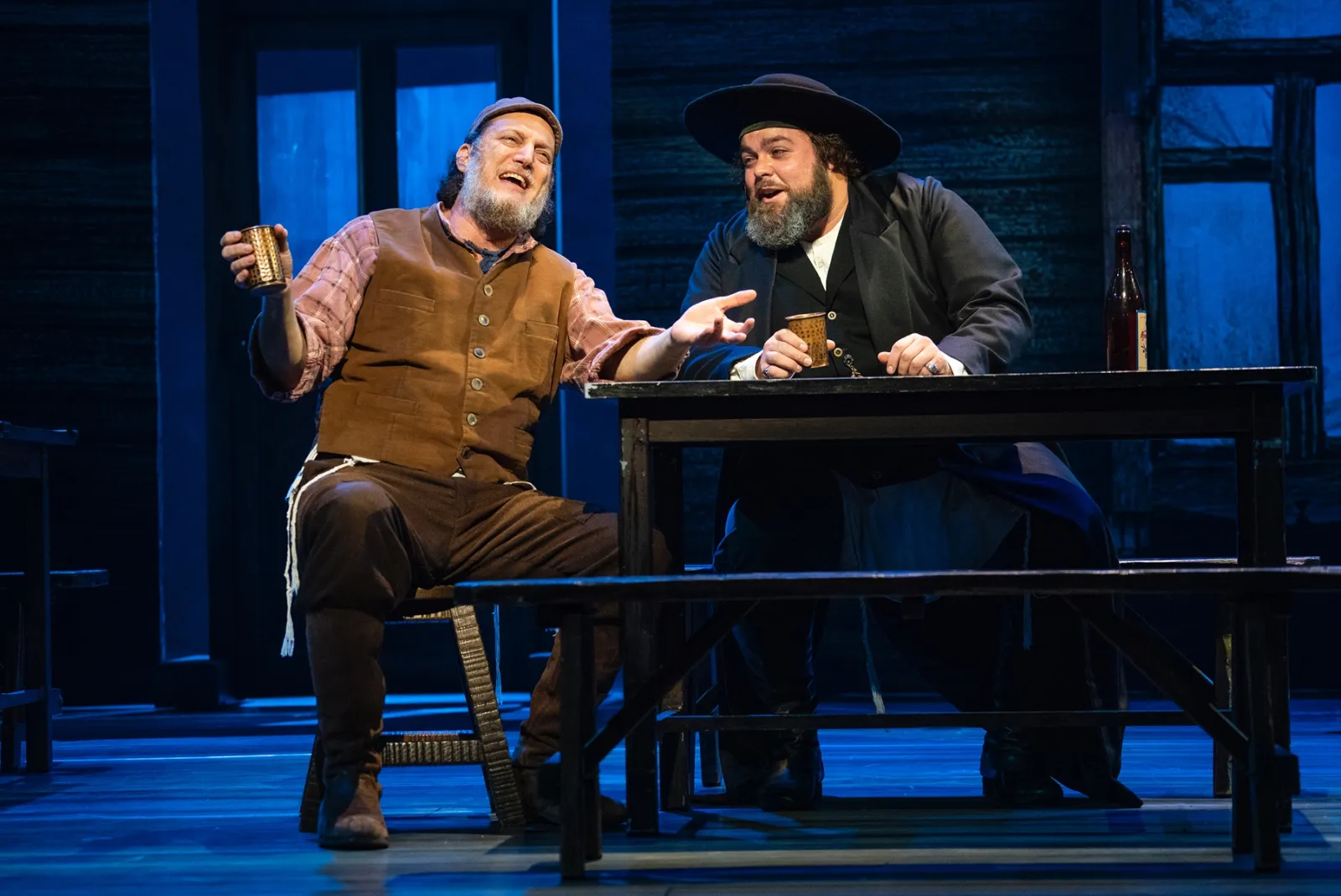
The Story
Fiddler is set in the Pale of Settlement of Imperial Russia in or around 1905 and is based on the story of Tevye and his Daughters (or Tevye the Dairyman) and other tales by Sholem Aleichem. Tevye is a milkman, who seeks to hold on to his Jewish religious and cultural traditions as outside influences encroach upon his family's lives. He has three strong-willed daughters who want to marry for love, driving their father to frustration.
Act I starts with the song that marks Tevye's worldview—the boldly sung "Tradition." Determined to hold to tradition, Tevye seeks to impose traditional rules in way he lives his life and the marriage of his daughters. When the matchmaker, Yente, comes to visit to tell the family that she's found a match for the eldest daughter, Tzeitel, she reacts with disappointment. She wants to marry her childhood friend, Motel. Tevye struggles with wanting to make his daughter happy and holding to tradition. Next, Tevye's second daughter, Hodel, falls in love with Perchik. Eventually, he agrees to let Tzeitel marry Motel. Next, Hodel and Perchik make their own match, which shocks Tevye. When his third daughter, Chava, says she wants to marry Fyedka, Tevye puts his foot down and says he cannot allow her to marry someone outside of the Jewish faith. So the two of them elope. When rumors spread that the Russians are expelling Jews from the village, Tevye must leave with his wife, Golde and his two youngest daughters. As they leave, the fiddler begins to play.
The original Broadway production first opened in 1964 and held the record for the longest-running Broadway musical for almost 10 years.
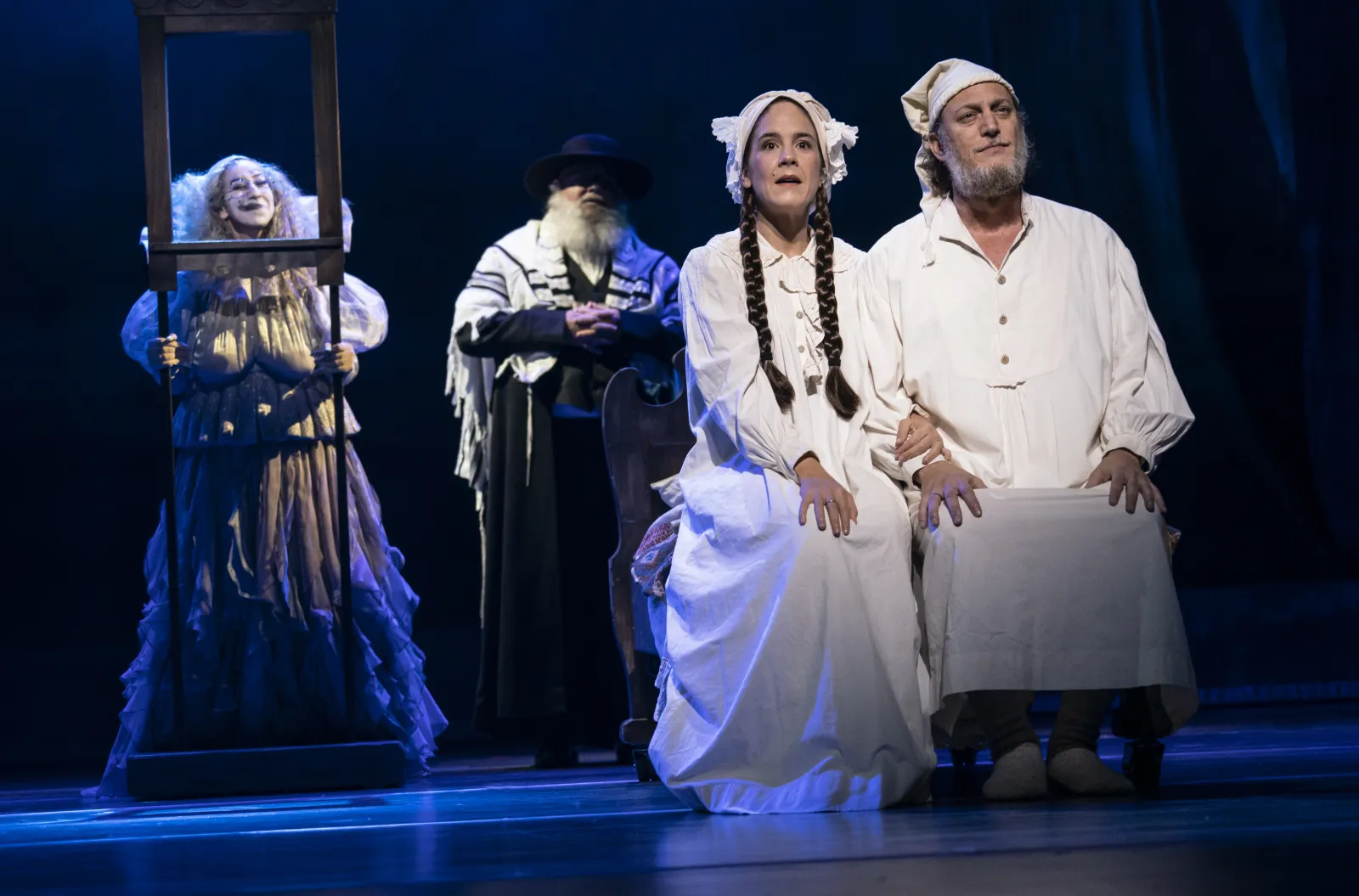
The Production
The performance was stellar and filled with the lively, bold sound the music and lyrics for which this play is known. The classic songs, "Tradition," "Sunrise, Sunset;' "If I Were A Rich Man;' "Matchmaker, Matchmaker" and "To Life (L'Chaim!)" were arranged and executed by a cast of talented singers. In particular, Jonathan Hashmonay, the actor who played Tevye, injected humor and wonder into his rendition of "If I was a Rich Man," as he danced, shimmied, and sang this number in Act One. Later he sang "Do You Love Me?"--his rich voice conveying the poignant desire for reassurance from his wife, Golde (Maite Uzal), as he struggled with his mixed emotions about his daughter's choices. Hashmonay stole the show as he endeared himself to the audience--as a loving father and husband, frustrated with his need to hold to tradition but see his daughters happy. His blustering discussions with God as he misquotes the Bible and questions why things happen made for humorous, light moments in the play.
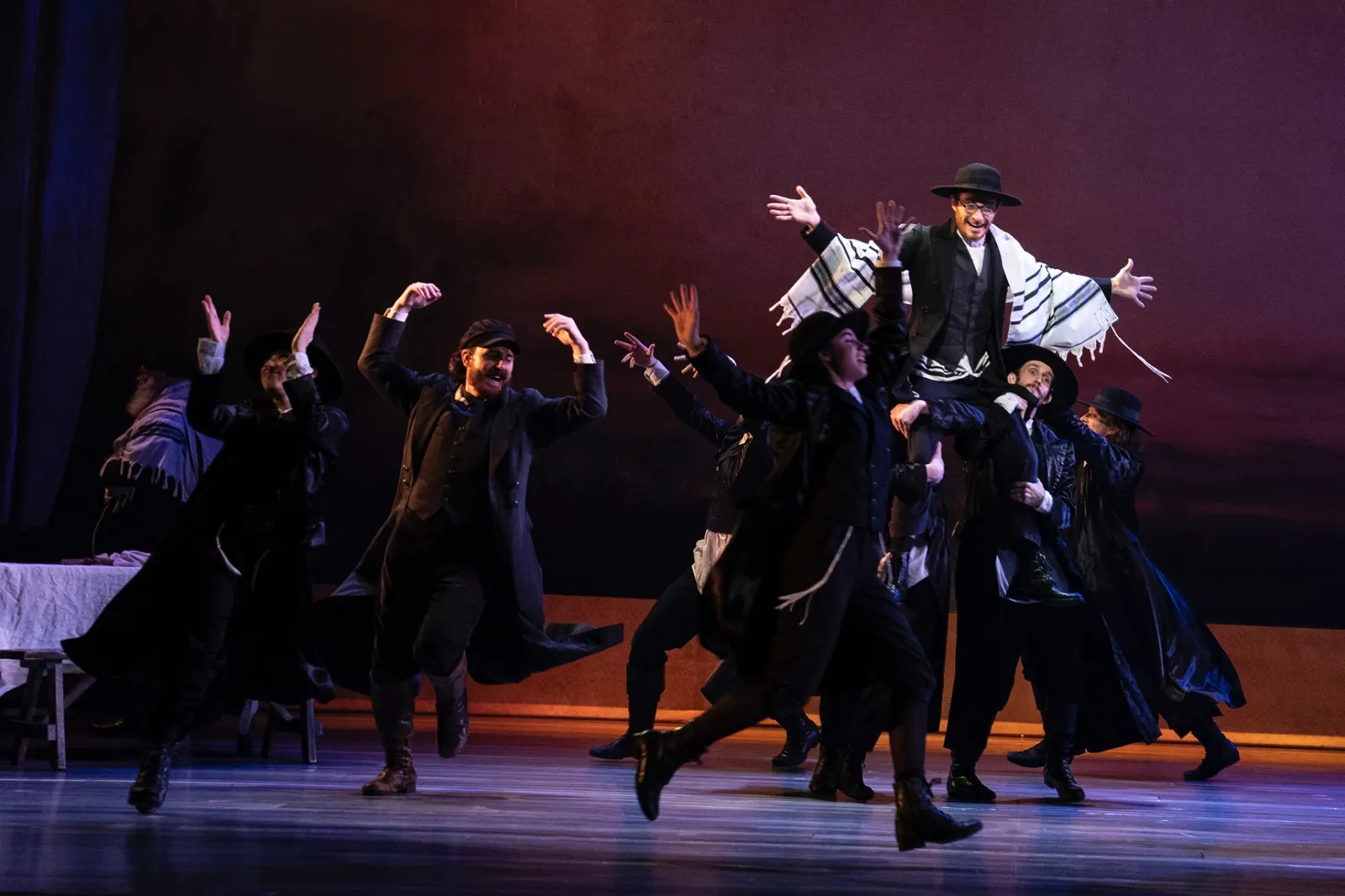
Besides Tevye, the real scene stealers were the full ensemble dance performances. "The Prologue: Tradition" and "The Wedding" brought most of the cast on stage for whirling dervish choreography and big, bold vocals. Israeli choreographer Hofesh Shechter created lavish dance scenes based on the original staging by Jerome Robbins. The movement and flow of the production was fitting for the story, with those high energy dance scenes to reflect celebrations and very still, quiet moments for emotion-charged songs. It was a wonderful performance and perfectly cast. At the end of the show, they announced that this and all performances were dedicated to Ukraine.
Fiddler on the Roof plays on the following dates:
* Wednesday, March 1 at 7:30 p.m.
* Thursday, March 2 at 7:30 p.m.
* Friday, March 3 at 8 p.m.
* Saturday, March 4 at 2 p.m. and 8 p.m.
* Sunday, March 5 at 1 p.m. and 6:30 p.m.
Broadway in New Orleans Presented by Entergy will offer a special $30 Student Rush Ticket for Fiddler on the Roof. Students must bring valid college student identification with them to the Saenger Theatre Box Office beginning two hours prior to each performance. The Student Rush Ticket price will be valid for evening performances ONLY (no matinees) with a two-ticket limit per student ID. Student Rush Tickets are subject to restrictions.
For more information please visit saengernola.com.
Tina Turner at the Saenger: Simply the Best
Exhilarating and powerful, Tina: The Tina Turner Musical is a magnificent melodic biography of the living legend's tumultuous life. This jukebox musical leads audiences through an emotional roller coaster as moments move from hopeful, to somber, to thrilling, to electrifying.
Following Tina Turner from her humble beginnings in Nutbush, Tennessee, the show opens with the young and outgoing Tina, born as Anna Mae Bullock. With a performance of "Nutbush City Limits," it takes us on a journey through the boisterous young Tina's life as a youth; from her parents' split, to moving with her grandmother, to moving back in with her mother and sister.
Tina (the musical) continues from there with a series of fast-paced scenes and changes that showcases Tina Turner's rise to fame in the 1960s to her rise to iconic status as the global queen of Rock n Roll.

The Story
After moving to St. Louis to live with her mother, Zelma (Roz White), and older sister, Alline (Parris Lewis), Tina meets Ike Turner (Garrett Turner), a locally famous musician who eventually became the leading singer's husband. Throughout the show, the audience gets a taste of their abusive relationship as Ike displays all levels of abuse towards Tina and their children. He not only gets physical but at many times, very emotionally abusive and manipulative.
Tina eventually leaves Ike (1976) leading her to struggle with the burden of her terribly managed finances. Adding to her stresses she is unable to get proper work due to almost aging out of the music business.
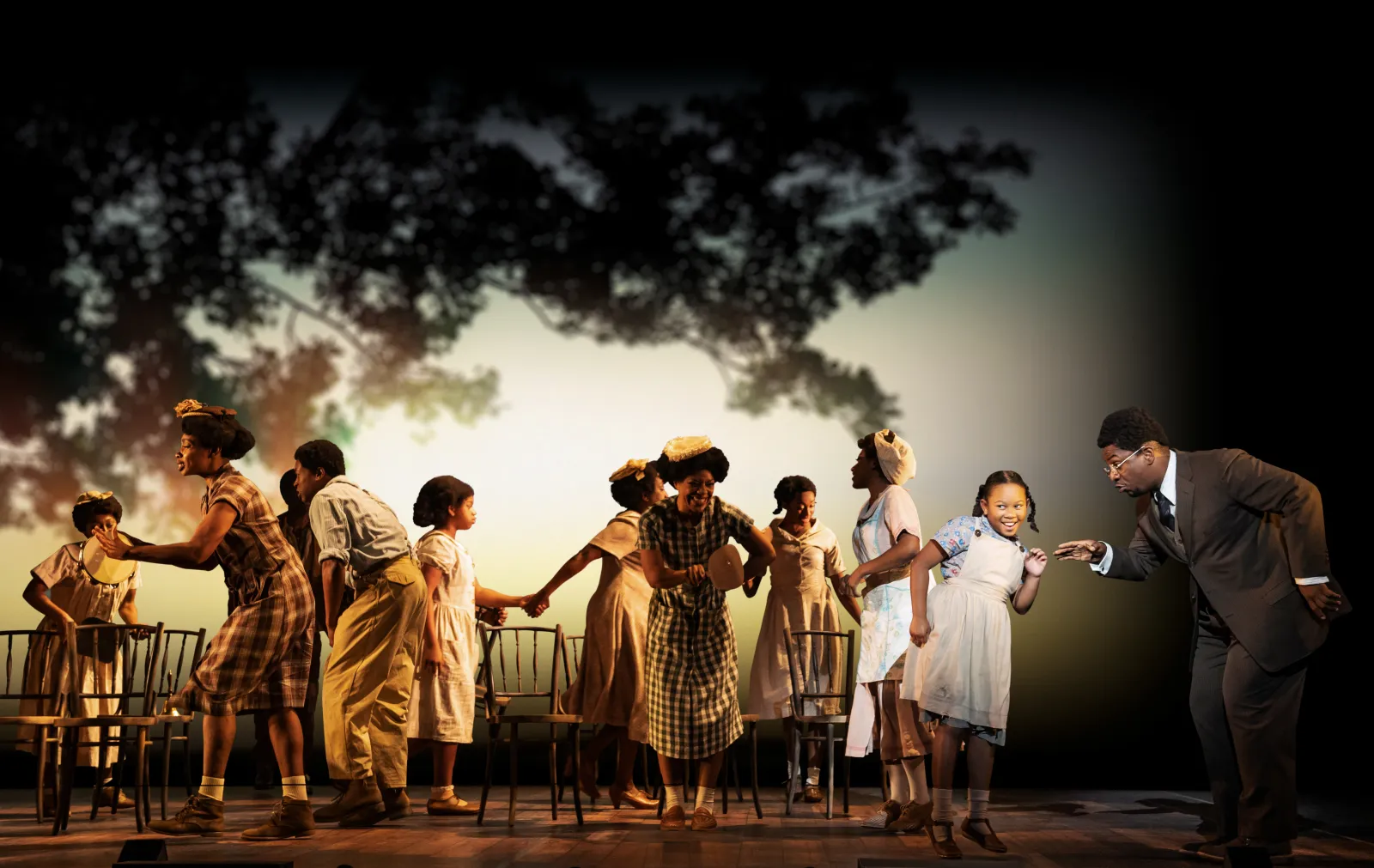
The Production
While there are two performers playing Tina on the Broadway Across America traveling show, Naomi Rogers (Tina) opened the New Orleans debut of Tina: The Tina Turner Musical.
The immensely talented performer stunned as Tina, embodying her vocal structure, facial expressions and movements. While her role was that of Tina Turner, Rogers' vocal skills stood alone. Her performances of the classic hit songs "Proud Mary" to "What's Love Got to Do With it" were phenomenal.
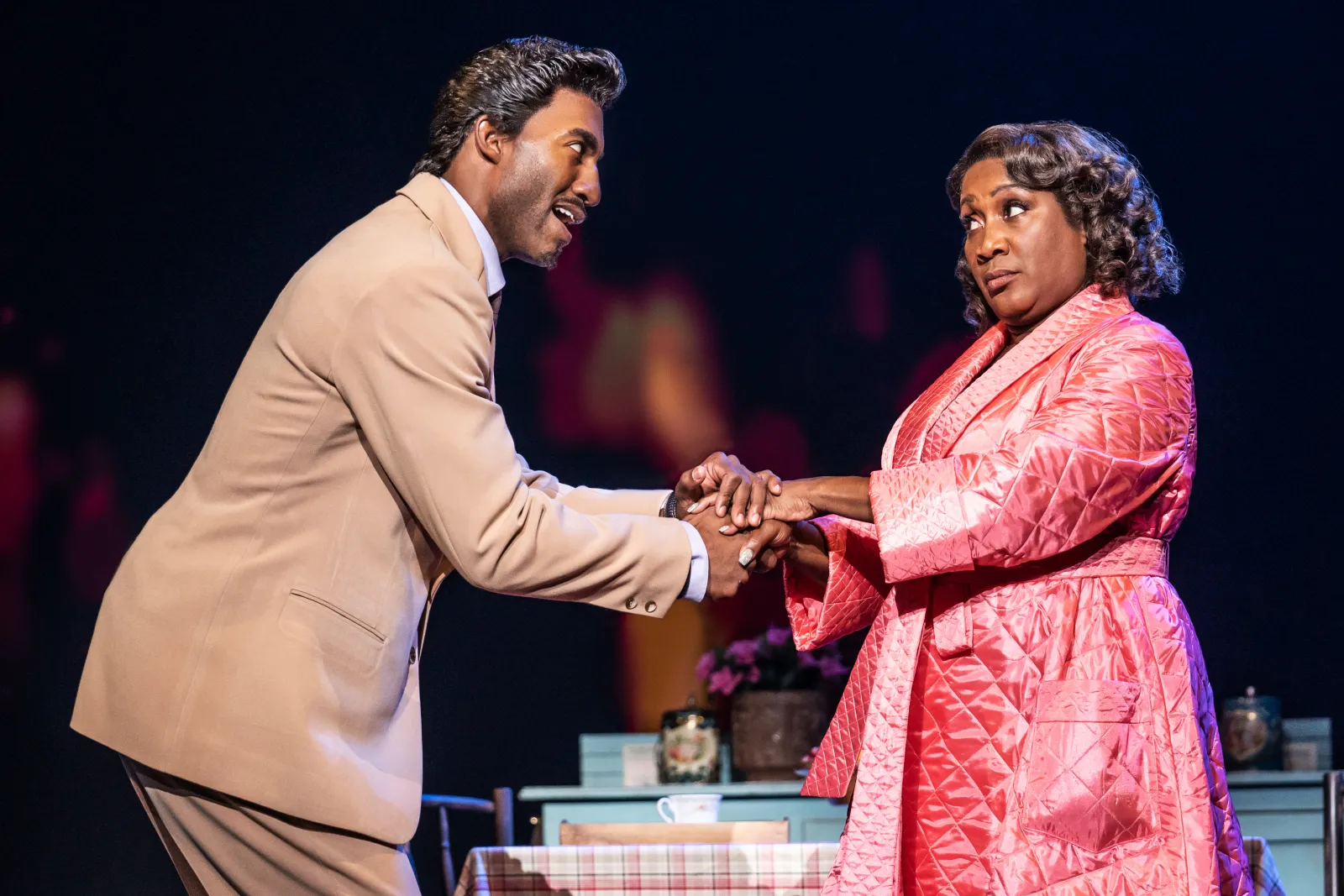
Along with Rogers, there were stand out vocals from Ann Nesby who played Gran Georgeanna (Tina's grandmother) and dynamic vocals and performances from Ayvah Johnson, who adorably played young Anna-Mae.
Simply the best! This show was heartfelt, sinsational and at many moments, fun and amazing. The audience sang, laughed and cried with the cast. Be sure to see this amazing show at the New Orleans Saenger Theatre this week until Sunday, February 12th.

For more information please visit saengernola.com.
Broadway's SIX The Musical is Live at The Saenger Theatre
Electrifying and comically brilliant, if you're a fan of juicy history and Pop music then you must see this history with a twist. The 23 award winning musical SIX is on stage now at the historical Saenger Theatre. Famous for having six wives, England's King Henry VIII had a controversial reign from 1509 until his death in 1547. While his life was fascinating, this stage performance is not a story about the king. SIX is actually a vibrant display of "Herstory" told by his six queens reincarnated as a pop sextet.

Performed as more of a concert than a play, SIX is one of the most unique Broadway musicals to hit the stage. The show opens with all six wives as they hilariously compete to see who had the most tumultuous life with the king. If you don't know the story behind the six wives, then you may be shocked to find out that two were divorced, two were beheaded, one died, and one survived and lived through the king's passing.

The Queens Herstory (wives)
Geniusly done, each queen belts out her story and it is simply fantastic. The first wife, Catherine of Aragon (Gerianne Perez), was a Spanish born heiress who was previously married to Henry's older brother King Arthur. Married to him for more than 20 years, he eventually divorced causing very controversial gossip after falling for his mistress and most famous wife Anne Boleyn (Zan Berube).
Boleyn had a very brief reign as queen due to being beheaded for treason and accused of infidelity. While her death was brutal, it made her a prominent figure in the political and religious upheaval of England. Up next came Jane Seymour (Cecilia Snow), the king's third wife who seemingly was the only one that was madly in love with the king, along with giving him his only male heir. Unfortunately she shortly died after giving birth.

Coming in at number four was German-born Anna--better known as Anne of Cleves (Jana Larell Glover) . Anna's introduction to the king was somewhat of a "catfishing" of the time. While he ordered this bride based on a self-portrait, the king was unsatisfied with her appearance upon meeting her. After a short period the marriage was annulled and Anna was rewarded a large settlement.
Henry's 5th wife was a few decades his senior and likely the least known historically. Her name was Katherine Howard (Taylor Pearlstein) and she was beheaded after an alleged affair and sadly after living a rather used and abused life. After losing two husbands to death, the king's final wife, Catherine Parr (Sydney Parra), was practically forced to marry Henry to keep her status and survival as a female during the time. Parr outlived the king and was able to build a bit of success on her own as a published writer and activist.
SIX: The Production
This amazingly original work of art is a fantastic display of girl power set to the scene of a pop concert. The immensely talented all female crew from performers to musicians kept the audience entertained while giving these tragic stories from the wives a place to live, making them the main characters of their own stories. In return, making their lives a little less tragic. Showing at the Saenger Theatre until Sunday, December 4, this show is a must see! Don't miss the opportunity to witness live action history with a twist.
The Lion King Roars at the Saenger Theatre

Having one of the best openings on Broadway, Disney's The Lion King stunned as it hit the stage this week, opening at the Saenger Theatre in New Orleans on Friday October 28. If you are familiar with the popular musical's storyline, you will know that animals can come from just about anywhere, and that is exactly what happened—in the theater. With intricate costumes and detailed movements from the ensemble, this six time Tony Award winning phenomenon is a must see. Its longevity is fitting proof.
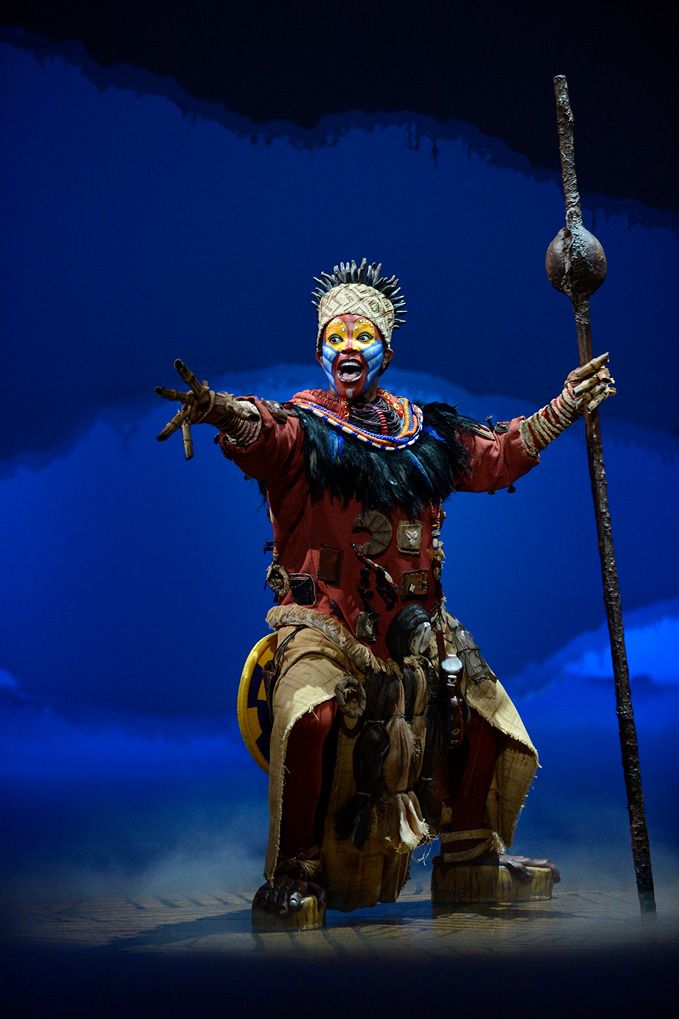
Adapted from the 1994 Disney movie of the same name, this show has been number one on Broadway fans' list of shows to see for over two decades. Reinvented as a Broadway musical for the stage in the late 1990s, The Lion King made its debut in Minneapolis, Minnesota, at the Orpheum Theatre. With such a successful premier, the show moved on to Broadway's New Amsterdam Theatre on October 15, 1997, while officially opening on November 13 that same year.
Standing as Broadway's third longest running show in history, the fan favorite has not only won several awards but has also grossed billions of dollars, making it the highest grossing Broadway musical of all time.
There is know secret to why this show has been so successful. Its precise incorporation of a variety of African cultures in its costumes, puppetry, dynamic music and vocals, and its remarkably emotional performances has created a once in a lifetime immersive experience for audiences across the globe.
The Broadway Show
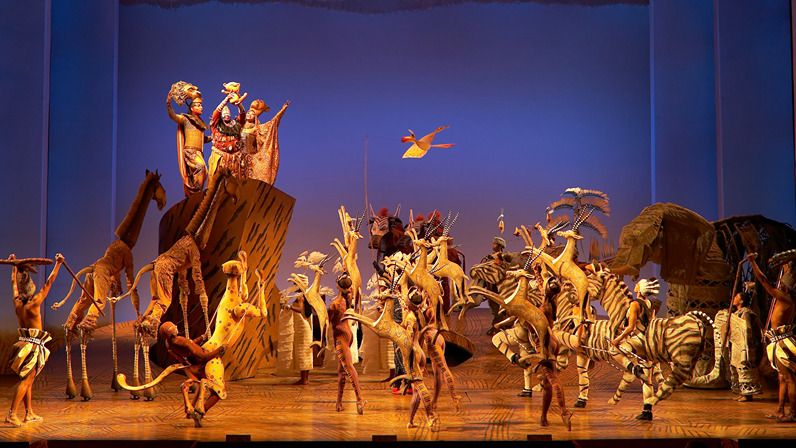
Opening with "The Circle of Life," the musical adaptation first introduces you to Rafiki (Gugwana Dlamini). Played by a woman in the musical, she begins the story with the oh so familiar opening of the welcoming of newly born Simba. Young Simba (Jaylen Lyndon Hunter) begins his life in the Pride Land getting into all of the things a young cub would likely get into with his best friend young Nala (Scarlett London Diviney).

Similar to the Disney movie, the adaptation stays true to the plot with a few additions. There are a number of new scenes. One key addition is when Timon finds himself nearly drowning in a waterfall while Simba feels powerless to help him. Another major addition is the depiction of Nala's departure in the scene where Scar tries to make her his mate. When she refuses, she decides to depart the Pride Lands to find help after receiving the blessings of the lionesses and Rafiki during the new song "Shadowland".
At the Saenger Theatre New Orleans
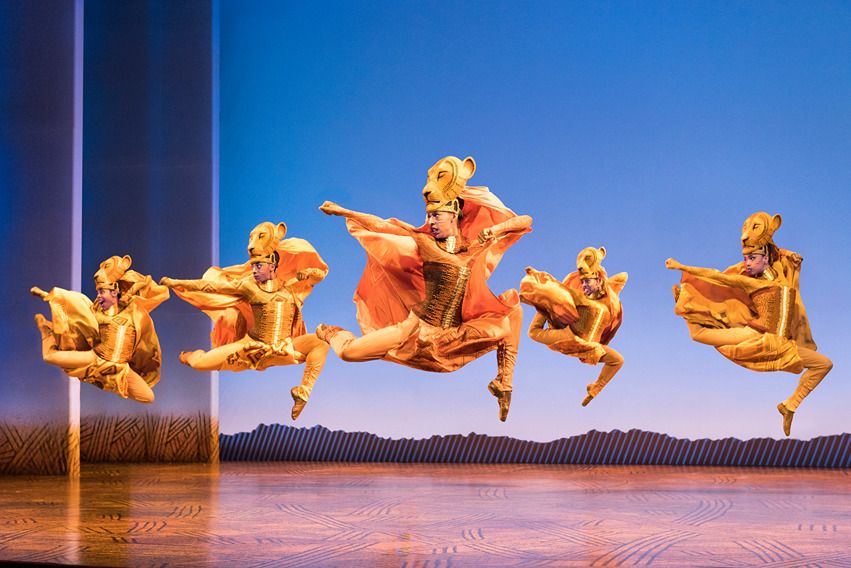
The show amazed with comical relief, yet touching with incredible aesthetics. Some favorites from the night's show were Timon's sarcasm, the hilarious hyena's, an amazing performance from young Simba, and the beautiful dialects and vocals of Rafiki and all of the ensemble singers and dancers. This show was nothing other than incredible and is most certainly a must see production.
If you haven't seen Disney's The Lion King yet, it is currently in an limited run with performances at the Saenger Theatre through November 13 (except Mondays).
Missing Pretty Woman is a big mistake, big...HUGE!
Staging a Broadway musical based on a movie is difficult enough, but to attempt to bring a beloved iconic film to stage is bound to be met with criticism—fair and unfair—from all sides. This production of Pretty Woman is no exception. Fans of the film will discover their storyline faithfully intact, which is no surprise considering the book was written by J. F. Lawton and the late Gary Marshall, both who wrote the film version. Theatre goers will be treated to a bevy of original songs created and performed by Broadway stars rarely seen in touring companies.
For those unfamiliar with the 1980s Gary Marshall film (his most successful movie—and he made a lot of movies), this romantic rags-to-riches tale is loosely based on George Bernard Shaw's Pygmalion, a la My Lair Lady. In this reincarnation, a wealthy lonely and (literally) lost entrepreneur Edward Lewis (Adam Pascale) meets up with a fledgling hooker Vivian Ward (Olivia Valli) who negotiates at a level he respects and also knows the way to his hotel. Sparks fly immediately.
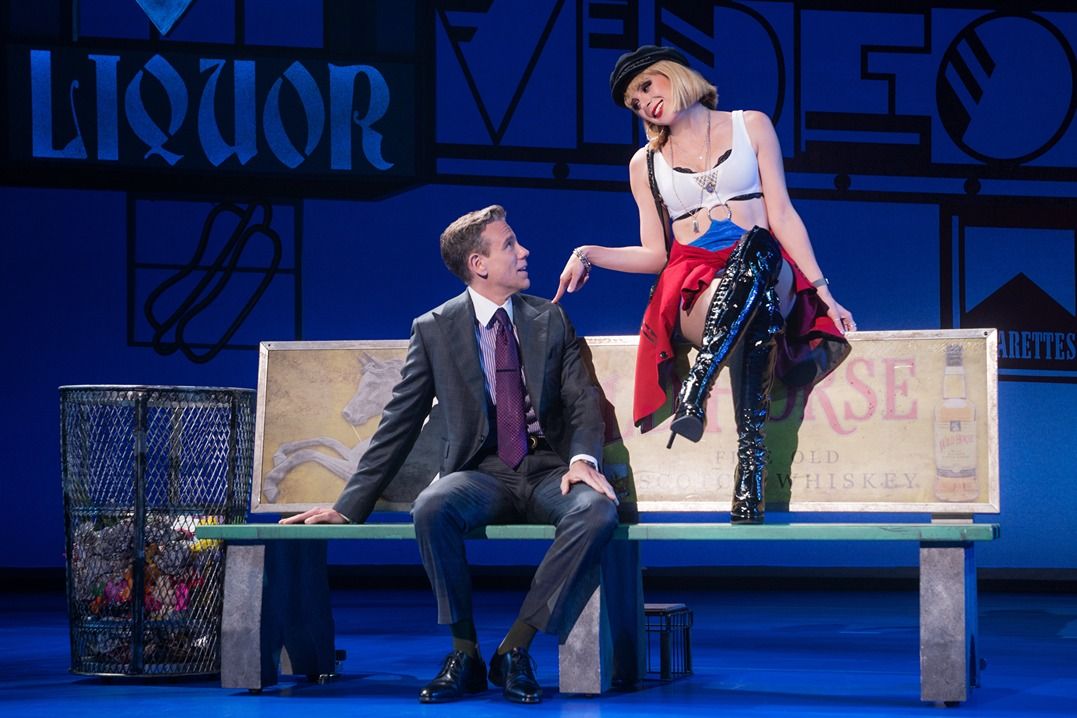
In need of a companion for social situations, but wary of distractions and unwanted entanglements, Edward compensates Vivian for her time the rest of the week. His goal is to focus on closing a multi-million dollar deal while in Los Angeles. Her's is paying the rent. To define the business arrangement, no kissing is allowed. Fans of the movie, or Pygmalion/My Fair Lady, or romantic comedies in general, all know how this turns out. HINT: They wind up kissing...and then some.
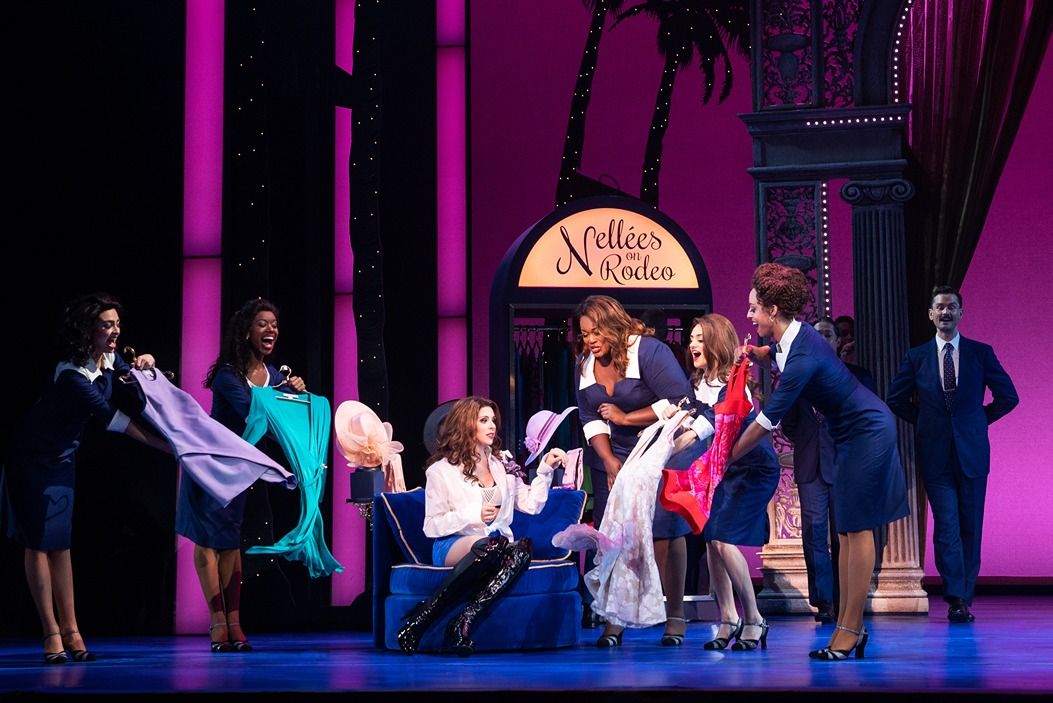
The cast is strong. Olivia Valli's voice sounds a lot like Julia Roberts, but she's also got the chops to belt out a song, impressing with "Anywhere But Here" as she takes the stage.
Kyle Taylor Parker does triple duty as the defacto "Happy Man" to frame the narrative, also stepping into Héctor Elizondo's shoes as non-judgmental hotel manager Barnard Thompson, and as the flamboyant boutique manager who excels at sucking up to rich customers. Not only is his performances remarkably different for each characterization, but by having them all played by Parker, it subtly reveals how each character is a moral compass in their own way.
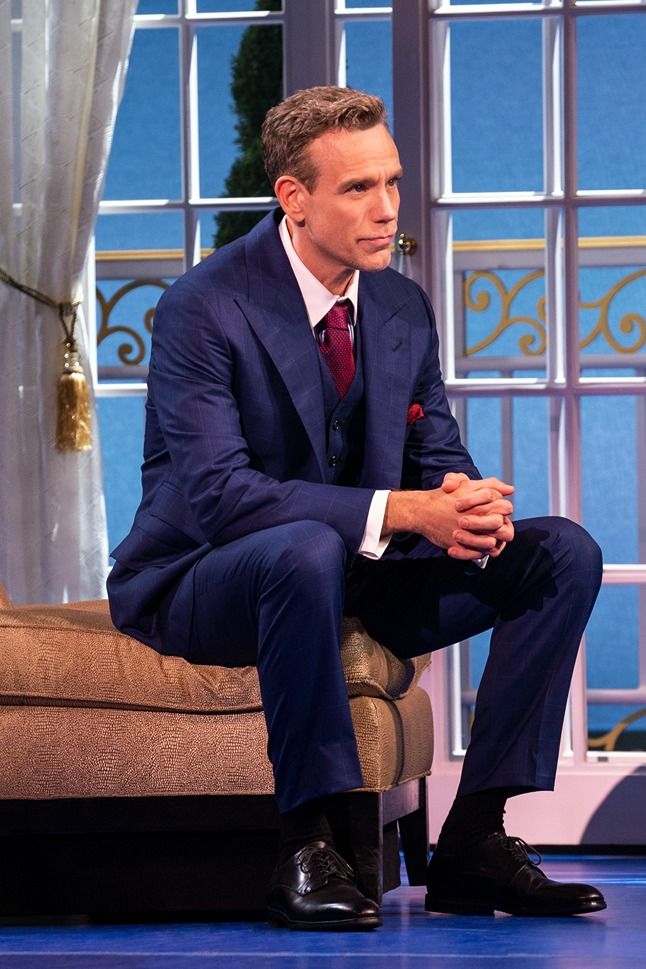
Adam Pascale is Broadway royalty, and having him join this cast as Edward is exciting and complements the talent around him. Pascale originated the role of "Roger Davis" in Rent. While it takes a few scenes to reconcile his famous anti-establishment stage persona now morphing into a one-percenter, his voice is every bit as strong and rich as it was in the 1980s...when this show is supposed to take place. There is a comfort in seeing "Vivian" as Pascale's new "Mimi"—it feels like Roger's in there somewhere. And this actually makes his transition to emotionless business tycoon into passionate dreamer, due to Vivian's influence, even more believable. Experiencing Pascale's performance and voice live is worth the price of admission.
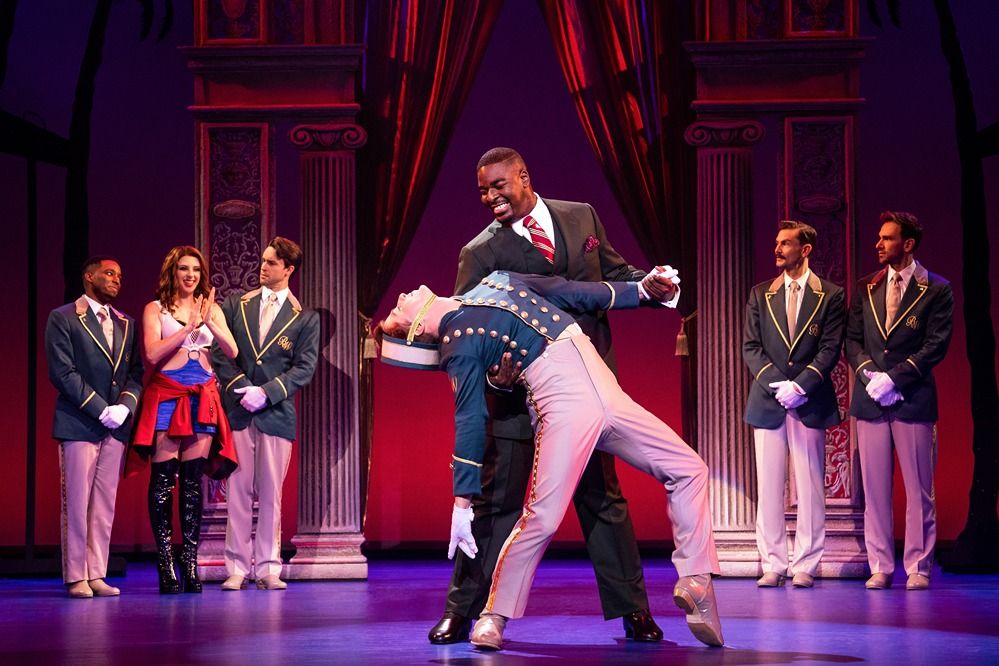
The scene-stealing standout, however, is Trent Soyster as Giulio, the hotel bellhop. The bellhop was relegated to amusing reactions shots in the movie version, but Soyster almost completely steals the show with comedic agility and timing. Between learning to dance with the hotel manager and getting absorbed into the excitement of the lavish lifestyle Vivian and her friend Kit (Jessica Crouch) are experiencing, his performance is laughable in every good way imaginable.
Appropriate to the decade the play is set, 1980's rock icon Bryan Adams and Jim Vallance infused 16 original songs to solidify Pretty Woman as a musical. The era is best represented with Pascale's rendition of "Freedom."
But don't think you're escaping Roy Orbison's signature song that inspired the story, no matter how many times they tease it.
Pretty Woman is being performed at the Saenger Theatre through Sunday October 9.
The Hit Broadway Musical Hamilton has Extended Run in New Orleans
History has its eyes on The Saenger Theatre as audiences have an opportunity to experience the extended run of the Broadway sensation Hamilton well past Independence Day, so "don't throw away your shot" and go!
Experience it Live
The first and most obvious question: Why see the Broadway production of Hamilton in New Orleans?
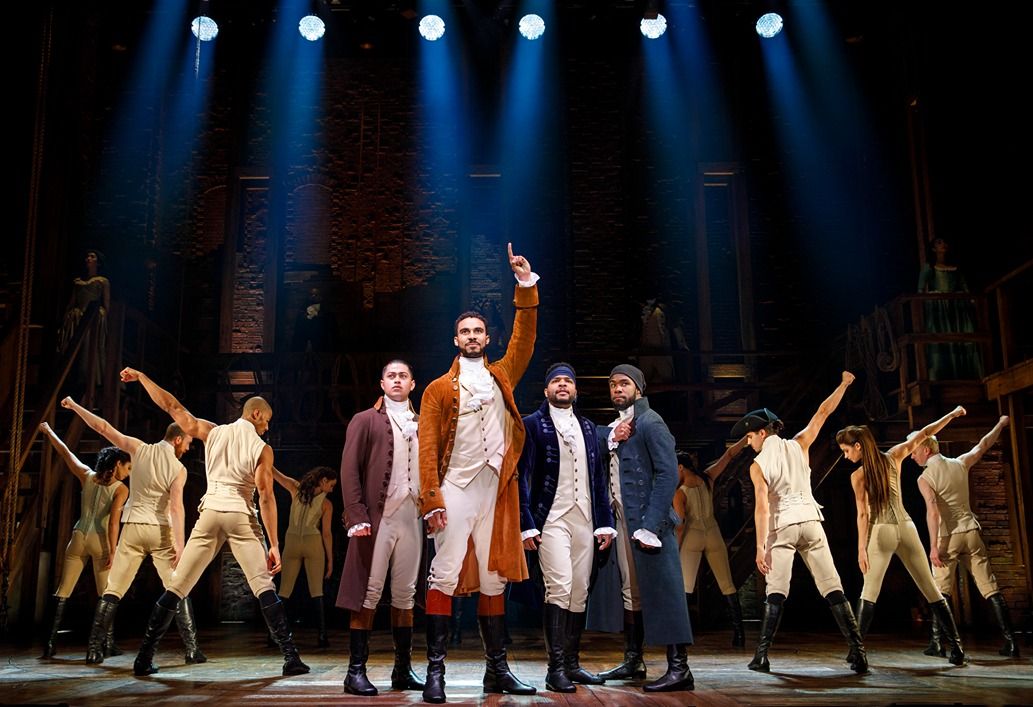
Given Hamilton's over-the-top popularity since the curtain rose on Lin-Manuel Miranda's multi-ethnic update of one of the least iconic—yet one of the most influential—founding fathers in New York City August 6, 2015, the Broadway musical became an instant classic. The show's soundtrack is know by heart to millions of adoring fans (and historians), beyond the fact that the entire Broadway production, with the original cast, was watched countless times after Disney+ began streaming it during a time when it was impossible for a Broadway-starved fan base to go the theatre. So is there a compelling reason to see it (again)?
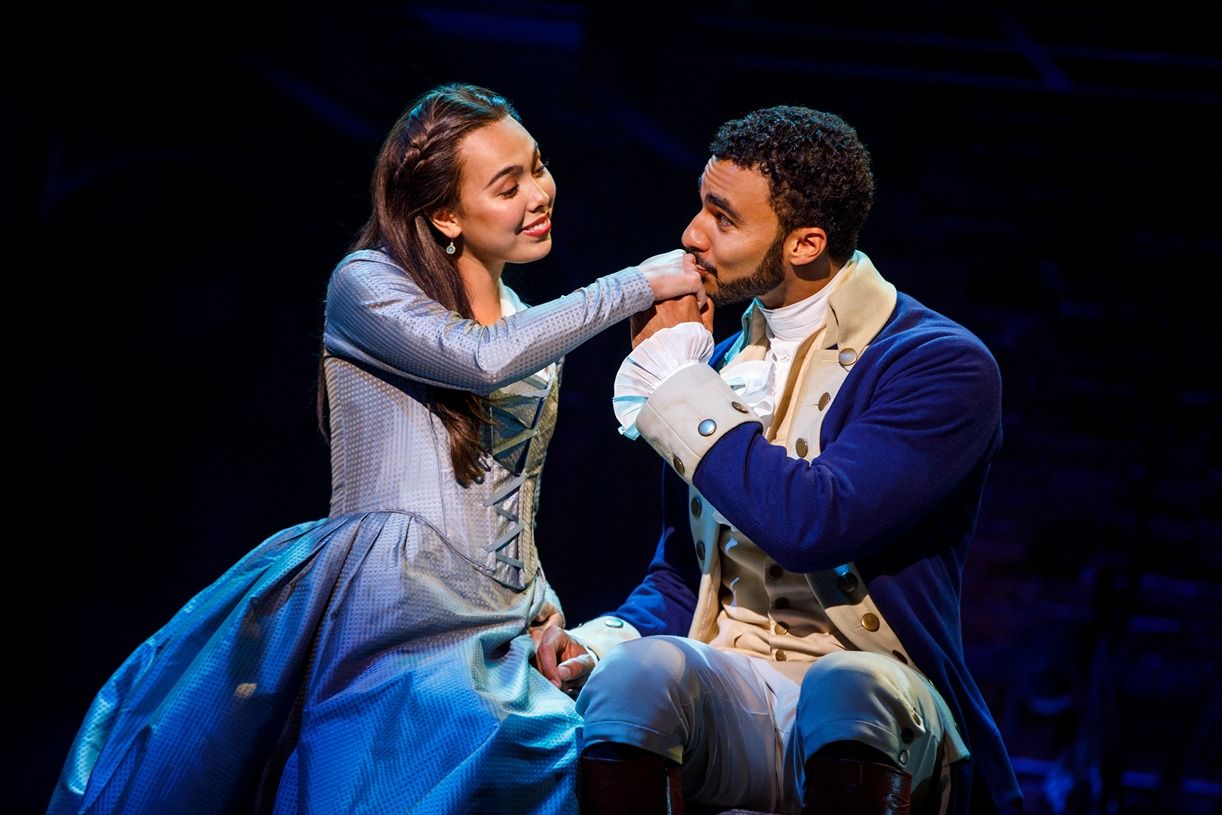
The answer would be a resounding : Yea!
Regardless of the excellent production values in Disney+'s streaming version, or how many times the soundtrack is heard, the answer is obvious from the first drumbeats as the house lights dim, and Aaron Burr (Josh Tower) strides onto center stage, Hamilton needs to be experienced the way Miranda created it—as a live Broadway production.
No overture or sweeping orchestration leads into the show, but the energy and intensity is palatable as he is joined by the entire cast, literally filling the austere set to the rafters. The roar from the audience anticipating the opening lines set a thrilling stage.
Hamilton is a collectively shared experience in which the audience and cast are galvanized with the energy from each other. They've created an energy that only seemingly exists in live theatre, and cannot be emulated on film or TV. Beyond that, there are so many nuanced performances and activities in the background or out of focal sight, that much may be missed if it's not in the sight lines. However, for theatre-goers, these hidden elements add to the audience's enjoyment, and sometimes characters' reaction.
A Rap Musical it is Not
It is important to note, some patrons of Broadway musicals may be misled by Hamilton being unfairly categorized as a "Rap Musical." They may believe this format is too big of a departure from the traditional shows, but have no fear.
That classification and subsequent avoidance would be wrong. While there are songs that are performed as rap, including two inspired Battle Raps in the form of cabinet meetings emceed by President Washington (Paul Oakly Stovall)—pitting Treasury Secretary Alexander Hamilton "debating" Secretary of State Thomas Jefferson (an uninhibited David Park), Miranda's musical is a love letter to all genres of music.
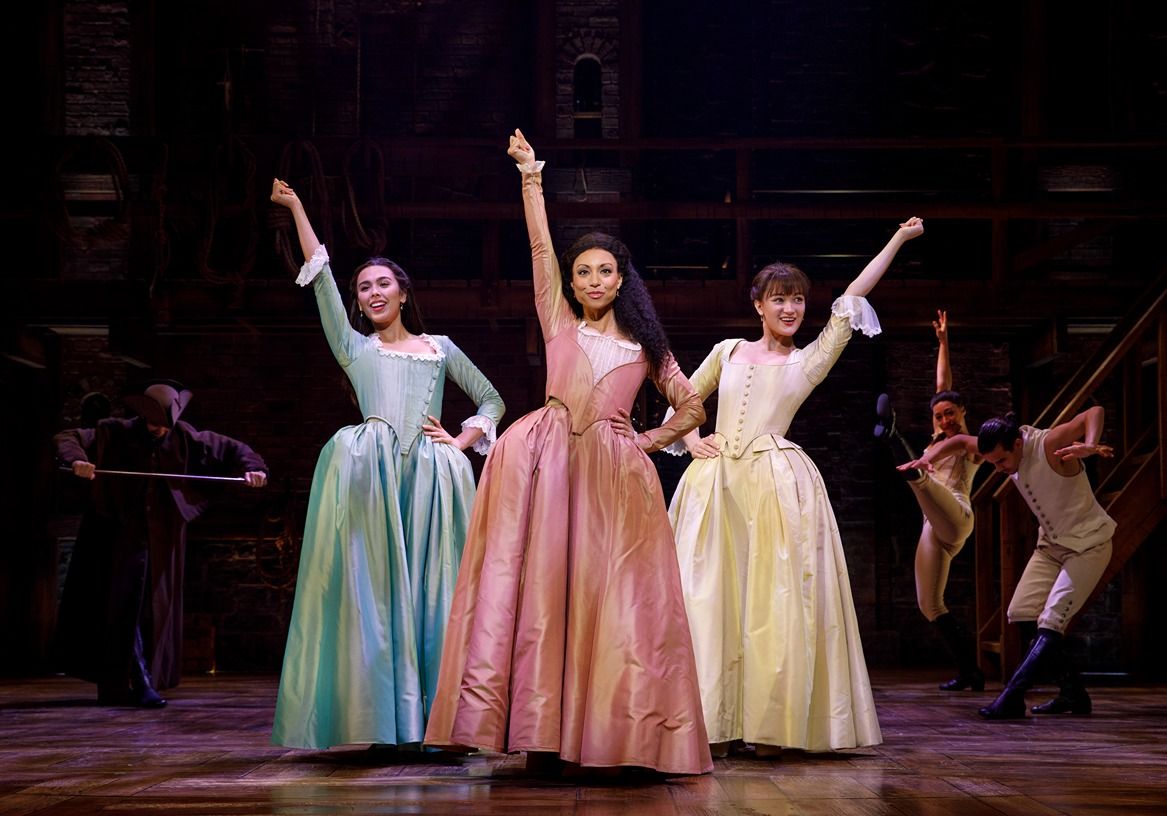
The show opens with a Colonial-era minuet, and spinkles Blues, Motown, torchlight ballads, upbeat love songs, and soulful seduction songs that would make Barry White blush. Miranda is successful in his goal of having his show be accessible to new audiences without undermining his clear love of all Broadway music. In making all the musical forms accessible and enjoyable to both the new and traditional audiences, he grows the fanbase in the process.
The Play is Hamilton's History
Historians and those with a subscription to Disney + may not find spoiler alerts here, but all else be warned: Hamilton charts the unpredictable life of Alexander Hamilton from poverty-stricken orphan in the Caribbean to his role as one of the most significant United States founding fathers, who effectively created the country's system of government and finance we know today.
Hamilton, Act I
The opening number quickly dispenses with his childhood in song and introduces the cast of characters, picking the story up as a recent college graduate meeting frienemy Aaron Burr for the first time shortly before the American revolution.
Along the way they befriend John Laurens (Jon Viktor Corpuz), Herculese Mulligan (Tyler Belo), and [New Orleans favorite] Marquis de Lafayette (David Park). Proud tomcatting ladies' men, the friends court the Schuyler sisters: Angelica (Stephanie Umoh), Peggy (Yana Perrault), and Eliza (Zoe Jensen) who Hamilton married.
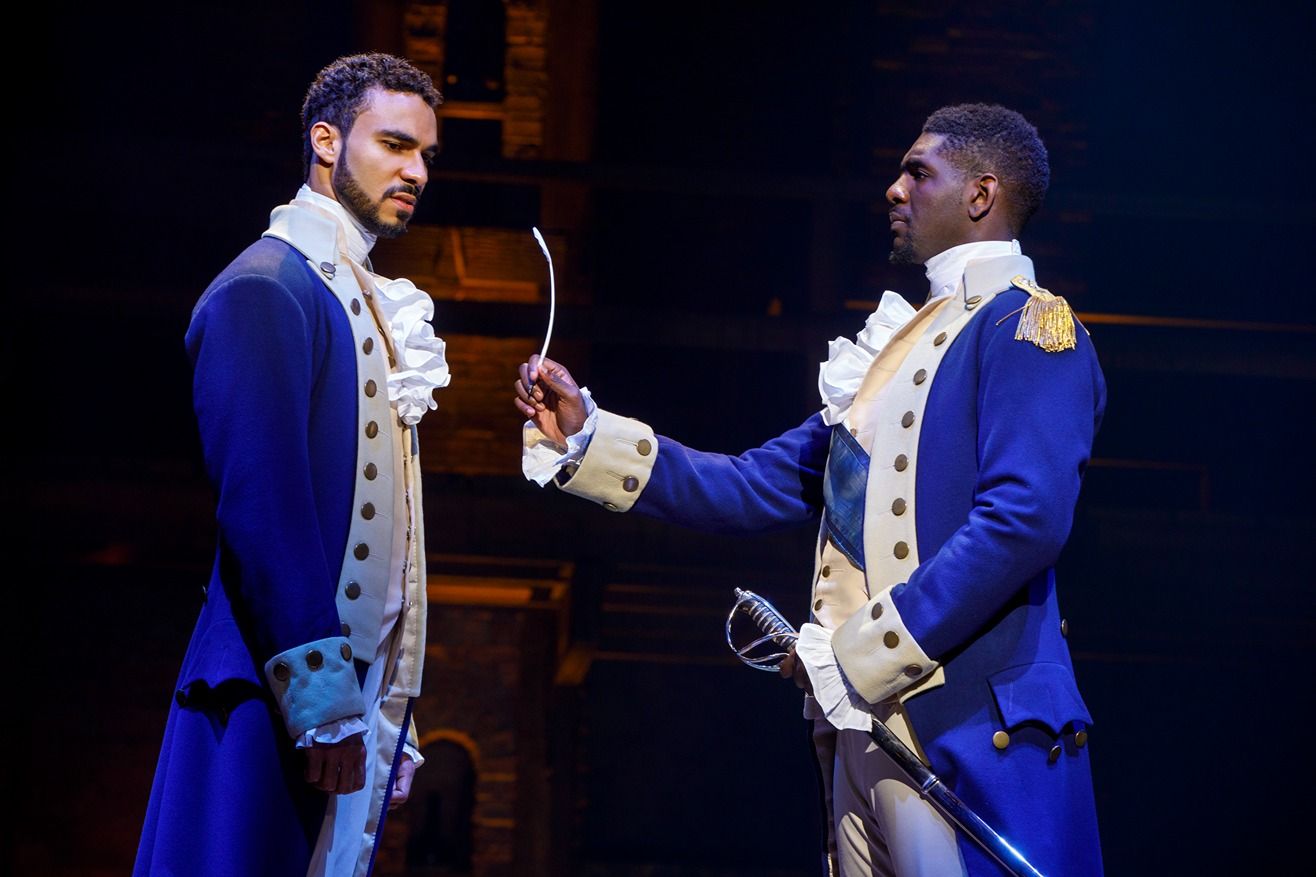
Historians have largely rejected the idea that Hamilton had a love triangle between his wife Eliza and his sister-in-law Angelica, but the devotion and friendship among the three is also widely accepted and keeps speculation alive. Miranda runs with this idea and creates plausible situations between the trio that may explain many of the historical writings from which the dialogue is sourced. Angelica's wedding flashback on how they all meet ("Satisfied") is a brilliant stage moment imagined by choreographer Andy Blankenbuehler.
Burr and Hamilton's paths criss-cross through the revolution, Hamilton always seeming one-step ahead of Burr, including becoming right-hand man to General George Washington (Paul Oakley Stovall).
Hamilton, Act II
After the victory over the British empire comes internal nation building in Act II. Unfortunately, it is also the turning point in Hamilton's life, in reality and on stage.
While his fame was a meteoric rise in wartime full of love, loyalty, and achievement, he becomes his own worst enemy in peacetime, ultimately being undone by five of the deadly sins.
Hamilton has more radical ideas than his peacetime counterparts care for. Thus the two-party political system is born. It is quickly clear nothing has changed over the centuries.
The north and south are in the early stages of political divides based on slavery, and states' rights compete with the values in a strong central government, especially financially. And of course, rival political parties never miss gloating over salacious scandals in media coverage that brings down worrisome opponents. A significant difference is that in the end, the good of the country and its people are the priority despite political rivalries—much to the disbelief and anger of Aaron Burr.
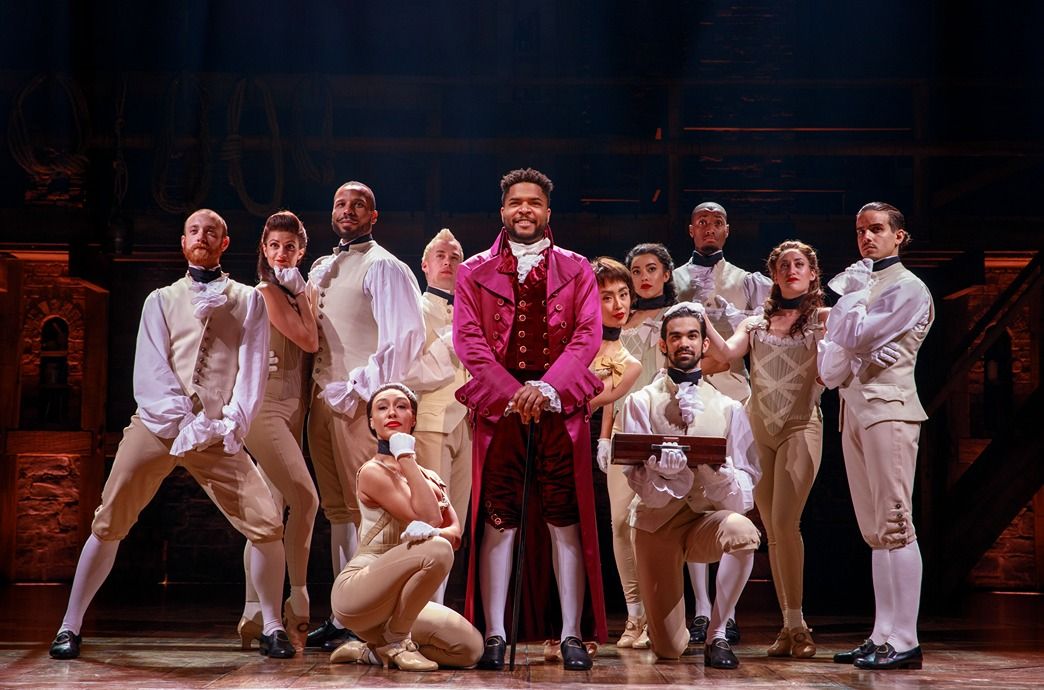
Even though Burr repeatedly acknowledges that Hamilton works tirelessly and persistently pursues his goals, Burr is increasingly resentful. He is bitter that his non-committal political strategy is not advancing his career as fast as Hamilton increases over the course of their lives.
The Burr-Hamilton relationship is optimistic but contentious and ultimately fragile from the start.
This is an interesting dynamic that is reminiscent of the Salieri-Mozart relationship in Amadeus. Whether Miranda purposefully structured his plot line similarly with Peter Shaffer's other historical rivalry, or it is simply a theatrical coincidence, the narrative framework works well.
Like Amadeus, the story arc seems to follow the title character's career (Hamilton), but it is deceptively the antagonist's story (Burr), and how their intertwined yet parallel relationship comes to a tragic end—but who pays the bigger price?
Hamilton on Tour in New Orleans
Even if the show was seen on Broadway, this touring cast of Broadway veterans makes it new. They exude the passion necessary for a play that is as historically sound and painful as it is funny and soulful.
Alexander Hamilton (played by understudy Deejay Young, normally cast as Edred Utomi) had a more melodic voice than Miranda who originated the role. Young made Hamilton's strong convictions believable, making emotions real and conveying Hamilton's desperation, frustration, and futility convincingly. His balanced performance brought the egocentric aspects of Hamilton to life even as he displays loyalty, love, and repentance in his evolution as a person. In a pinch, understudy Young is also poised to step in as Lafayette & Jefferson, Mulligan & Madison, as well as Laurens & Phillip Hamilton, and would probably be mesmerizing in any of those roles.
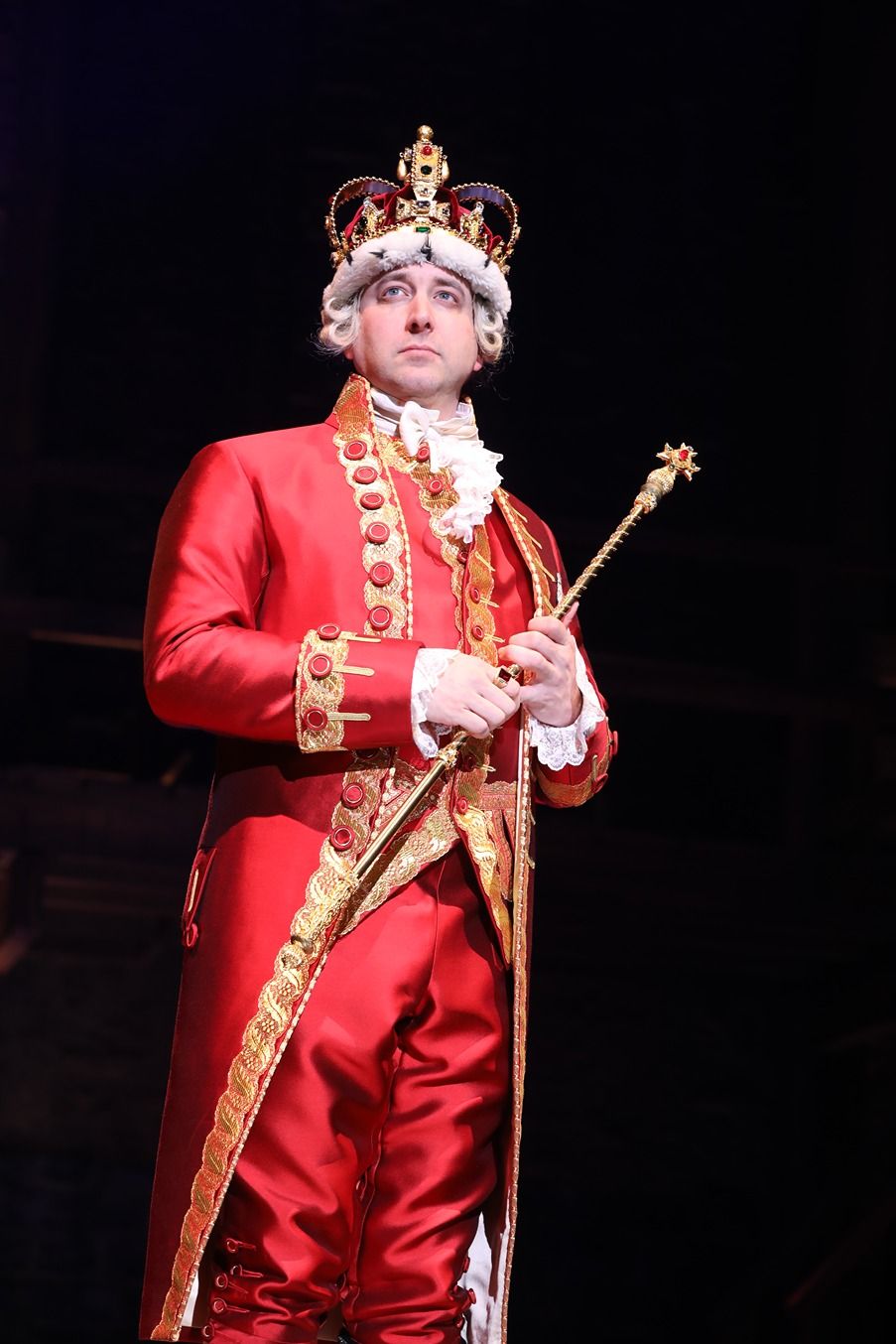
Other standouts are Park's Marquis de Lafayette (in Act I) and Thomas Jefferson (in Act II), Stovall's George Washington, and Yana Perrault as Peggy Schuyler (in Act I) and Maria Reynolds (in Act II).
Without imitating the animated performance of Daveed Diggs who originated the role, Park brings a fresh take and an equally energetic spin on these roles, especially Jefferson's return to America ("What'd I Miss").
Likewise, Stovall adds some soothing Luther Vandross-style cool with his parting words as Washington resigns his presidency (a soulful rendition of "One Last Time") that had many in tears.
Perrault purposefully taking the background as Peggy in Act I lustfully devours the stage (and Alexander Hamilton) as Maria Reynolds in Act II. The statuesque actor who somehow managed to look plain as Peggy, emerges with a shaved head that intensifies her as an appropriately sexy seductress. Then she opens her mouth, and an unexpectedly sultry voice laments with such desperate loneliness, Hamilton's plea for divine intervention ("Say No to This")—and ultimate failure in receiving any—is understandable.
And, of course, it is impossible to not note Peter Matthew Smith's hilarious turn as King George, who gets the first laugh before the proverbial curtain has even opened, and the most enthusiastic greeting of any character—which he royally relished. Smith's alternating sneering contempt and maniacal glee is the perfect comic relief popping up at unexpected times throughout the show.
The New Broadway Musical Theatre
Every generation has a Broadway sensation that is seemingly a complete departure from traditional formats, redefining Broadway musicals as accepted, yet is widley embraced by the audiences coming of age but disconnected to their "parents' Broadway."
Like Hamilton in the 2010s, Bob Fosse productions like Chicago and the revelatory A Chorus Line turned Broadway shows on their heads when introduced in the 1970s, as did Andrew Lloyd Webber's Cats and Phantom of the Opera in the 1980s, Rent in the 1990s, and The Lion King in the 2000s—all challenging the conventional norms of The Great White Way.
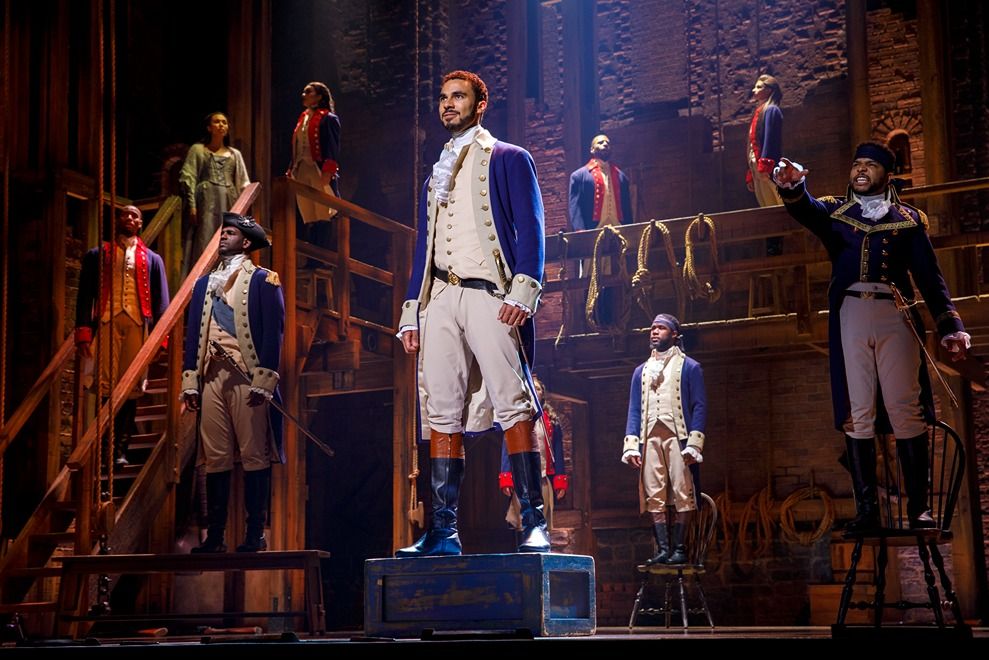
And here's where Miranda truly excels in his vision.
By throwing open the theatre doors for younger audiences of color, Lin-Manuel Miranda has made American history at once fun, interesting and relatable. His personal fascination with history and Alexander Hamilton who fundamentally altered the world through his ability to effectively communicate and basically never take no for an answer, was perfect material, especially connecting with Hamilton's own immigrant experience.
A polarizing political figure in his day, Miranda's play neither judges nor forgives Hamilton's personal indiscretions, but is also careful to not throw the baby out with the bathwater.
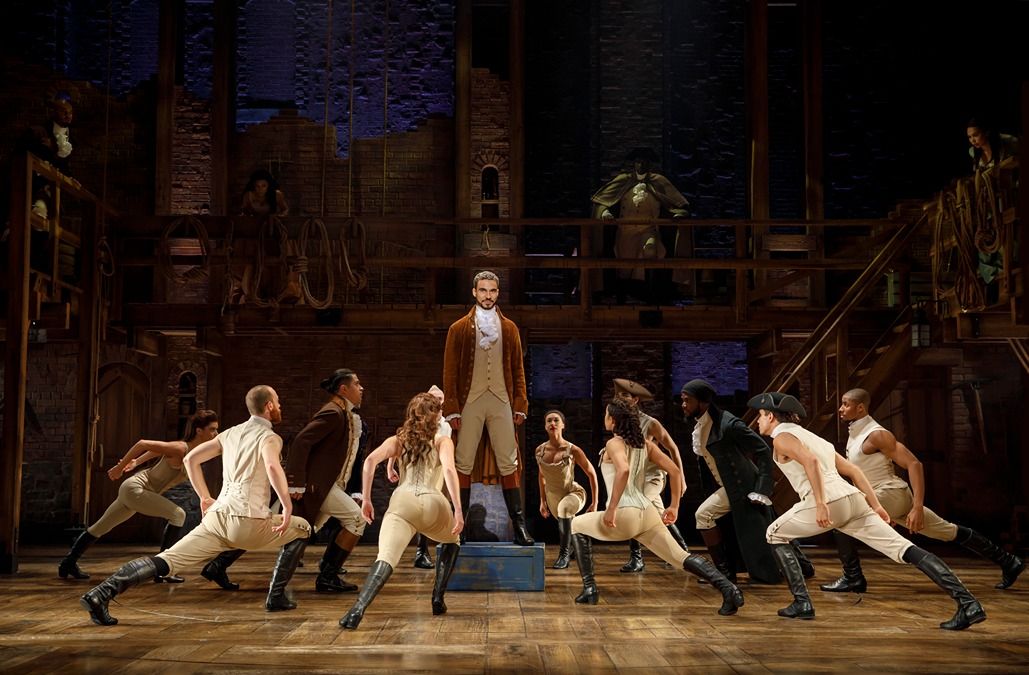
Miranda's show chooses to celebrate Hamilton's accomplishments (Revolutionary war hero, founder of the New York Post newspaper and U.S. Coast Guard, creator of the federal banking system and Washinton, D.C. as the nation's capitol, defender of the Constitution, and much more) and applaud his life's work. Despite the shortcomings of this personally flawed human being ("Finale/Who Lives, Who Dies, Who Tells Your Story"), the play reinforces the importance of what he achieved and why it all still matters—as bold a concept in the seventeenth century as it is in present day, which may be why Hamilton resonates with so many.
---------------
Hamilton is performing an extended run at the Saenger Theatre, 1111 Canal Street. Tickets are on sale at The Saegner box office, BroadwayInNewOrleans.com, and through Ticketmaster. Orders for groups of 10 or more may be placed by calling (504) 287-0372.
Producer Jeffrey Seller and Hancock Whitney Broadway In New Orleans present Hamilton at The Saenger Theatre, 1111 Canal St., New Orleans, LA, 70112 for an extended run through July 10, 2022.

